In our last post we listed a whole bunch of titles that were about Lent, mostly devotionals or guides into this season of the church year. We linked to a few earlier Hearts & Minds Lenten lists, too, naming titles for Lent from previous years.
I mentioned in that list the new paperback book Grounded: Finding God in the World — A Spiritual Revolution by Diana Butler Bass, noting that it has a 40 Day study guide, too, making it ideal for a book club or for personal reflection during this time of year, even though, admittedly, it doesn’t offer the customary focus of books about Lent. Even though I might critique some of her ideas and occasionally her tone, it is, mostly, a fantastic book, beautifully written and pushing us in a helpful direction. We’re glad for the paperback that is now out and wanted to suggest it as a “non-Lenten Lenten book.”
Which brings us to this new list of mostly older books, offered as Lenten reading for those who tend not to like little daily devotionals or seasonal prayer books. Maybe you sense a yearning to do some reflective, serious reading this time of year but don’t want to commit to the daily regimen using a standard devo. Maybe your own faith journey is such that you don’t even want a religious book. We get that.
So here is an admittedly eccentric list of not-exactly-random titles we pulled off the shelves here at the Dallastown shop and are sending through the airwaves for you to consider. Perhaps see this list our gift to those who can’t shake the idea of doing some intentionally reflective reading this next month or so, but don’t want a standard Lent book.
It’s a good time of year to settle down, pay attention, read, think, pray. Hope this list helps you select something good for you or yours.
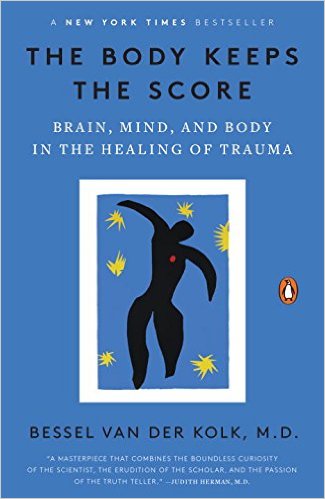 The Body Keeps the Score: Brain, Mind and Body in the Healing of Trauma Bessel Van Der Kolk (Penguin) $18.00 A wondrous, remarkable book by a leading expert on trauma who has pioneered new ways to treat PTSD (including sand trays in children’s therapy) and has helped us all realize new things about the human mind, memory, neuroscience, and pathways to recovery. For anyone concerned about the toll of the cycle of trauma and violence in our society – and about how relationships can be hurtful but also healing — this intense but beautiful book is a must.
The Body Keeps the Score: Brain, Mind and Body in the Healing of Trauma Bessel Van Der Kolk (Penguin) $18.00 A wondrous, remarkable book by a leading expert on trauma who has pioneered new ways to treat PTSD (including sand trays in children’s therapy) and has helped us all realize new things about the human mind, memory, neuroscience, and pathways to recovery. For anyone concerned about the toll of the cycle of trauma and violence in our society – and about how relationships can be hurtful but also healing — this intense but beautiful book is a must.
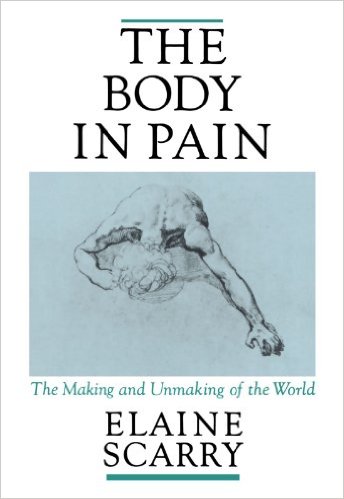 The Body in Pain: The Making and Unmaking of the World Elaine Scarry (Oxford University Press) $19.95 I know more than one person who has recently raved to me about how important this book was for them; it is a dense and complex read, studying chronic pain, trauma, including a major report on research Scarry did in the 1980s (in cooperation with Amnesty International, I believe) on the impact of torture. As a literary critic (a recent book was on the Shakespeare sonnets) she is known for close readings, for good listening, for rich and moving meditations. Susan Sontag calls this “large-spirited, heroically truthful, a necessary book.” Is pain inexpressible? Can it destroy a sufferers language? How do political regimes “unmake” an individual’s world in their exercise of power? And how do we then re-make the world (through act is of creativity that produce language and culture and hope? If you want a book that is perhaps a bit more accessible and not as long, see her beloved work about aesthetics and public justice on Princeton University Press called Beauty and Being Just. That’s a good read any time.
The Body in Pain: The Making and Unmaking of the World Elaine Scarry (Oxford University Press) $19.95 I know more than one person who has recently raved to me about how important this book was for them; it is a dense and complex read, studying chronic pain, trauma, including a major report on research Scarry did in the 1980s (in cooperation with Amnesty International, I believe) on the impact of torture. As a literary critic (a recent book was on the Shakespeare sonnets) she is known for close readings, for good listening, for rich and moving meditations. Susan Sontag calls this “large-spirited, heroically truthful, a necessary book.” Is pain inexpressible? Can it destroy a sufferers language? How do political regimes “unmake” an individual’s world in their exercise of power? And how do we then re-make the world (through act is of creativity that produce language and culture and hope? If you want a book that is perhaps a bit more accessible and not as long, see her beloved work about aesthetics and public justice on Princeton University Press called Beauty and Being Just. That’s a good read any time.
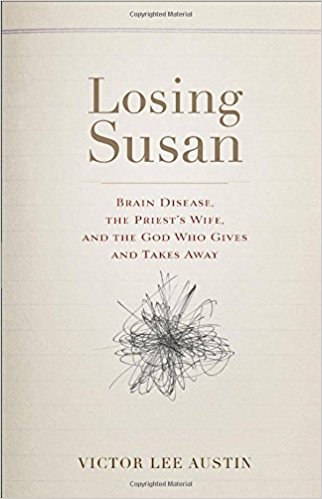 Losing Susan: Brain Disease, The Priest’s Life, and the God Who Gives and Takes Away Victor Lee Austin (Brazos Press) $19.99 We discovered the serious work of this Episcopal priest and social critic when we read Up With Authority, a book about authority structures in society. In this moving, powerful story, the theologian gets personal, telling of his love for his wife, Susan, as he cared for her during her long struggle with brain cancer – and the aftereffects which brought him more “face to face with God” and allowed him to re-evaluate his own faith. Endorsements are from other deep, thoughtful, pastoral theologians such as Robert Jensen and Sam Wells and others who have written about suffering, such as Stanley Hauerwas and Tobias Winright who teaches Health Care Ethics at Saint Louis University who calls it “a moving work, carefully crafted and thoughtfully honest.”
Losing Susan: Brain Disease, The Priest’s Life, and the God Who Gives and Takes Away Victor Lee Austin (Brazos Press) $19.99 We discovered the serious work of this Episcopal priest and social critic when we read Up With Authority, a book about authority structures in society. In this moving, powerful story, the theologian gets personal, telling of his love for his wife, Susan, as he cared for her during her long struggle with brain cancer – and the aftereffects which brought him more “face to face with God” and allowed him to re-evaluate his own faith. Endorsements are from other deep, thoughtful, pastoral theologians such as Robert Jensen and Sam Wells and others who have written about suffering, such as Stanley Hauerwas and Tobias Winright who teaches Health Care Ethics at Saint Louis University who calls it “a moving work, carefully crafted and thoughtfully honest.”
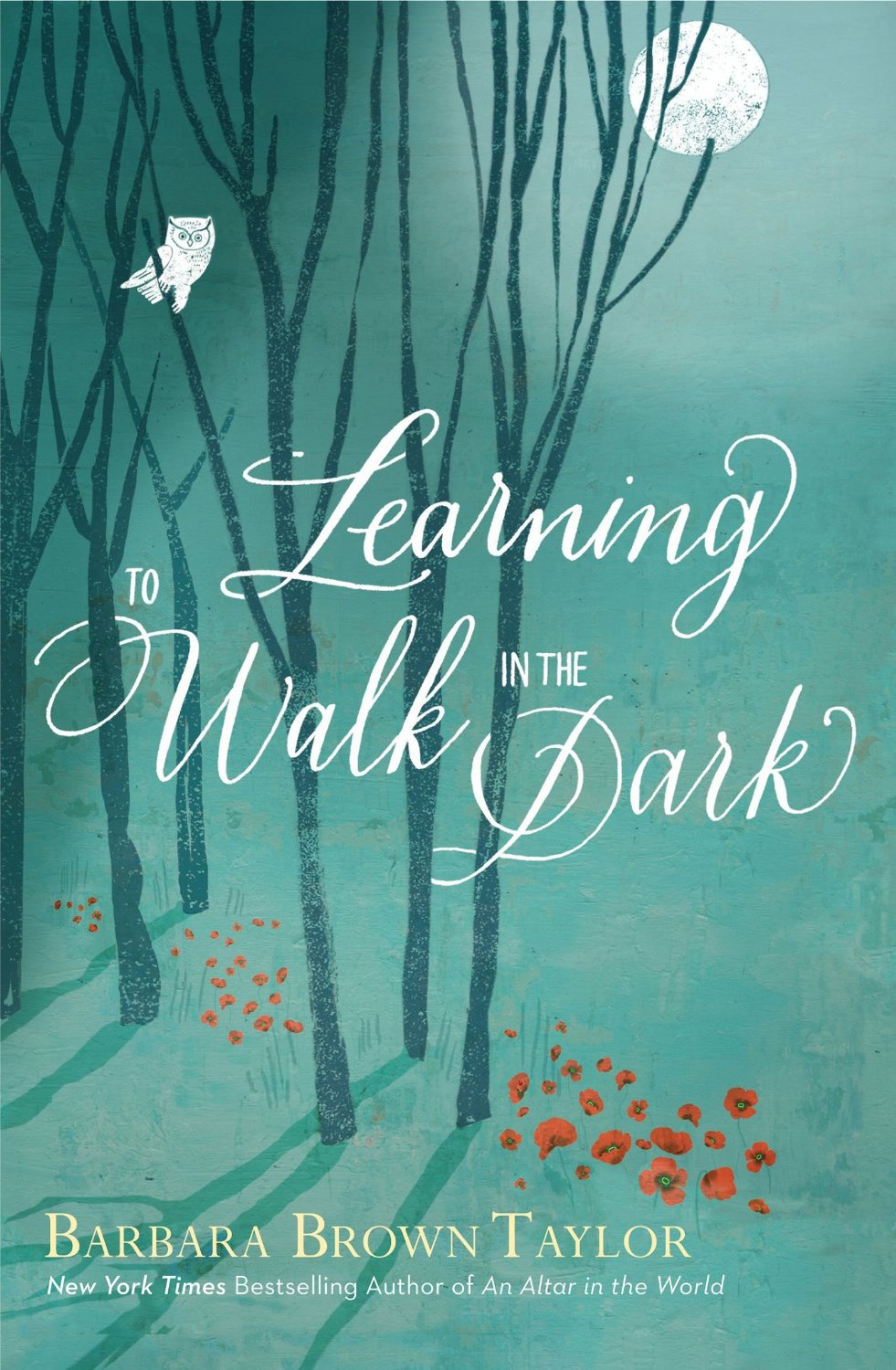 Learning to Walk in the Dark Barbara Brown Taylor (HarperOne) $14.99 It is rare to find someone who doesn’t appreciate Barbara Brown Taylor’s rich prose, her wonderful use of words, her charming tone, even in serious sermons. One of my own all-time favorite books is her brief memoir of coming to Christian faith and discerning a call to the ministry called The Preaching Life (which concludes with some sample sermons, themselves always worth reading. Let us know if you want to make our day by ordering one from us.) But this, her most recent book, is a study of darkness in our lives, literal and metaphorical, explored in the entertaining form of story and memoir, how she came to embrace doubt and darkness, which, in her estimation, isn’t at all a bad thing. From sitting in an utterly dark cave to camping out in the deepest night to attending to some perplexities and pain in her own life, she invites us all to explore this side of life, literally darkness and the “dark night of the soul.”. I loved this book and its quiet blend of charm and provocation and commend it to you during these weeks of Lent.
Learning to Walk in the Dark Barbara Brown Taylor (HarperOne) $14.99 It is rare to find someone who doesn’t appreciate Barbara Brown Taylor’s rich prose, her wonderful use of words, her charming tone, even in serious sermons. One of my own all-time favorite books is her brief memoir of coming to Christian faith and discerning a call to the ministry called The Preaching Life (which concludes with some sample sermons, themselves always worth reading. Let us know if you want to make our day by ordering one from us.) But this, her most recent book, is a study of darkness in our lives, literal and metaphorical, explored in the entertaining form of story and memoir, how she came to embrace doubt and darkness, which, in her estimation, isn’t at all a bad thing. From sitting in an utterly dark cave to camping out in the deepest night to attending to some perplexities and pain in her own life, she invites us all to explore this side of life, literally darkness and the “dark night of the soul.”. I loved this book and its quiet blend of charm and provocation and commend it to you during these weeks of Lent.
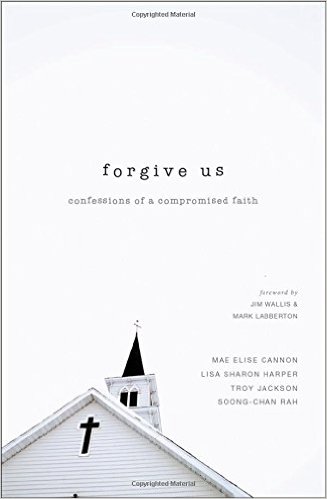 Forgive Us: Confessions of a Compromised Faith Mae Elise Cannon, Lisa Sharon Harper, Troy Jackson, Soong-Chan Rah (Zondervan) $22.99 I have raved about this book since before it came out (indeed have a long blurb on the inside, alongside many, many pastors, authors, activists, leaders that I so admire and respect, from Anthony Bradley to John Perkins to Virgilio Elizondo and more.) We’ve mentioned it often, insisting that reading such an overview of many of the sins against others in which the church has been complicit, is good for the soul, important for our witness to the world, and an important aspect of any serious transformation for the sake of God’s Kingdom. This well-informed survey has chapters on how the Christian religion was too often used to harm indigenous peoples, blacks and other people of color, immigrants, women, gays and lesbians, the poor, the Earth itself. There are prayers included to help us learn the art of public confession and wise, pastoral invitations to lament, to show remorse, to change and to grow. Margot Starbuck says reading Forgive Us “was an experience I’d never had with any other book…” Now might be a good time for some of our readers to order it and spend some time in prayerful reflection about its hard truths. Such is the path of holiness and true liberation, I am convinced. Please consider this…
Forgive Us: Confessions of a Compromised Faith Mae Elise Cannon, Lisa Sharon Harper, Troy Jackson, Soong-Chan Rah (Zondervan) $22.99 I have raved about this book since before it came out (indeed have a long blurb on the inside, alongside many, many pastors, authors, activists, leaders that I so admire and respect, from Anthony Bradley to John Perkins to Virgilio Elizondo and more.) We’ve mentioned it often, insisting that reading such an overview of many of the sins against others in which the church has been complicit, is good for the soul, important for our witness to the world, and an important aspect of any serious transformation for the sake of God’s Kingdom. This well-informed survey has chapters on how the Christian religion was too often used to harm indigenous peoples, blacks and other people of color, immigrants, women, gays and lesbians, the poor, the Earth itself. There are prayers included to help us learn the art of public confession and wise, pastoral invitations to lament, to show remorse, to change and to grow. Margot Starbuck says reading Forgive Us “was an experience I’d never had with any other book…” Now might be a good time for some of our readers to order it and spend some time in prayerful reflection about its hard truths. Such is the path of holiness and true liberation, I am convinced. Please consider this…
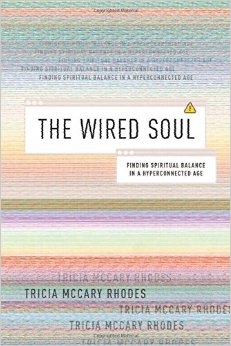 The Wired Soul: Finding Spiritual Balance in a Hyperconnected Age Tricia McCary Rhodes (NavPress) $14.99 I’ve told you about this book before, so will be brief: it is a beautifully written book ruminating on spiritual formation in the digital age. Do we have to give up technology and social media to earn quiet and solitude? Do our habits of the heart and mind, informed as they are by the fast-paced (or slow if you’ve got my computer) pixels and images of the internets, need to be re-calibrated if we are going to be attentive to the things of God? This book reintroduces us to the classic disciplines of Scripture reading, meditation, prayer and contemplation, but not describing them just as “technologies to aid our faith” but as tools to keep us mindful and focused in an increasingly disoriented digital age. What does it mean to ‘be still and know that I am God’ in these times? A very nice book.
The Wired Soul: Finding Spiritual Balance in a Hyperconnected Age Tricia McCary Rhodes (NavPress) $14.99 I’ve told you about this book before, so will be brief: it is a beautifully written book ruminating on spiritual formation in the digital age. Do we have to give up technology and social media to earn quiet and solitude? Do our habits of the heart and mind, informed as they are by the fast-paced (or slow if you’ve got my computer) pixels and images of the internets, need to be re-calibrated if we are going to be attentive to the things of God? This book reintroduces us to the classic disciplines of Scripture reading, meditation, prayer and contemplation, but not describing them just as “technologies to aid our faith” but as tools to keep us mindful and focused in an increasingly disoriented digital age. What does it mean to ‘be still and know that I am God’ in these times? A very nice book.
 The Desire: Satisfying the Heart James M. Houston (Victor) $16.99 The remarkably profound scholar and teacher and spiritual leader, James Houston, who founded Regent College in British Columbia, is known for his mastery of medieval and other spiritual writers and remains a like-minded colleague with authors such as J.I. Packer, Marva Dawn, Eugene Peterson. A small evangelical publisher rather oddly published three magisterial books of his years ago and they went out of print. This was one of those and we have a few that we’ve been holding for ages. Given the popularity of thinking about desire (see books just as David Naugle’s excellent Reordered Loves Reordered Lives, Jen Pollock Michel’s splendid Teach Us to Want, and of course Jamie Smith’s must-read You Are What You Love ) we wanted to highlight this now, and make our few available, while our supplies last. The Desire explores the very nature of the human heart and how longings for the eternal play out in our daily lives, even as we discern false desires (which can become addictions and dysfunctions.) A remarkable book, especially in this season where we seek, as this book offers, “a more substantial and satisfying life.” By the way, we have a few others in this magnificent, mature series. Let us know if you are interested.
The Desire: Satisfying the Heart James M. Houston (Victor) $16.99 The remarkably profound scholar and teacher and spiritual leader, James Houston, who founded Regent College in British Columbia, is known for his mastery of medieval and other spiritual writers and remains a like-minded colleague with authors such as J.I. Packer, Marva Dawn, Eugene Peterson. A small evangelical publisher rather oddly published three magisterial books of his years ago and they went out of print. This was one of those and we have a few that we’ve been holding for ages. Given the popularity of thinking about desire (see books just as David Naugle’s excellent Reordered Loves Reordered Lives, Jen Pollock Michel’s splendid Teach Us to Want, and of course Jamie Smith’s must-read You Are What You Love ) we wanted to highlight this now, and make our few available, while our supplies last. The Desire explores the very nature of the human heart and how longings for the eternal play out in our daily lives, even as we discern false desires (which can become addictions and dysfunctions.) A remarkable book, especially in this season where we seek, as this book offers, “a more substantial and satisfying life.” By the way, we have a few others in this magnificent, mature series. Let us know if you are interested.
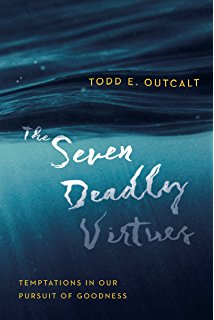 The Seven Deadly Virtues: Temptations in Our Pursuit of Goodness Todd E. Outcalt (IVP) $16.00 There have been a small spate of books along these lines – we like The Danger of Doing Good by Peter Greer and the very useful and wise Doing Good Without Giving Up: Sustaining Social Action in a World That’s Hard to Change by Ben Lowe — but this one is more literary, more deeply theological, wonderfully written, drawing on thoughtful sources from the Ante-Nicene Fathers to Kierkegaard to Pope John Paul. The author is a United Methodist pastor and popular author. This looks tremendous and feels like a good book to read during Lent, even though it isn’t exactly a Lenten book. Check it out and you may be surprised how insightful it may be for you.
The Seven Deadly Virtues: Temptations in Our Pursuit of Goodness Todd E. Outcalt (IVP) $16.00 There have been a small spate of books along these lines – we like The Danger of Doing Good by Peter Greer and the very useful and wise Doing Good Without Giving Up: Sustaining Social Action in a World That’s Hard to Change by Ben Lowe — but this one is more literary, more deeply theological, wonderfully written, drawing on thoughtful sources from the Ante-Nicene Fathers to Kierkegaard to Pope John Paul. The author is a United Methodist pastor and popular author. This looks tremendous and feels like a good book to read during Lent, even though it isn’t exactly a Lenten book. Check it out and you may be surprised how insightful it may be for you.
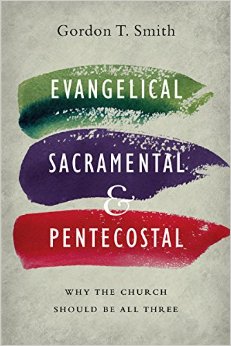 Evangelical, Sacramental & Pentecostal: Why the Church Should Be All Three Gordon T. Smith (IVP Academic) $17.00 This slim book just came and it looks like it is worth its weight in gold. I recommend every single book Gordon Smith has written, and highly esteem his ecumenical perspective, his contemplative tone, his good vision to integrate varying traditions within the broader church. (I’m a fan of Richard Foster’s Streams of Living Water as well, which is a broader study than Smith’s new one.) Glen Scorgie of Bethel Seminary (in San Diego) says “This is a provocative call for a fresh ecumenical synergy – for weaving all these elements together into something stronger and better than the older, isolating silos were able by themselves to deliver.” Wow – if in this season you are eager for more fullness of life, deeper reality, a wider connection to others in other faith traditions within the church, this corrective will pull you happily into other “means of grace.” I cannot wait to read this, and hope many Hearts & Minds friends, too, will be eager to spread the word about this approach. By the way, it would certainly be fitting during this season of deeper reflection and repentance and intentionality about Christian growth to work through his major volume Called to Be Saints.
Evangelical, Sacramental & Pentecostal: Why the Church Should Be All Three Gordon T. Smith (IVP Academic) $17.00 This slim book just came and it looks like it is worth its weight in gold. I recommend every single book Gordon Smith has written, and highly esteem his ecumenical perspective, his contemplative tone, his good vision to integrate varying traditions within the broader church. (I’m a fan of Richard Foster’s Streams of Living Water as well, which is a broader study than Smith’s new one.) Glen Scorgie of Bethel Seminary (in San Diego) says “This is a provocative call for a fresh ecumenical synergy – for weaving all these elements together into something stronger and better than the older, isolating silos were able by themselves to deliver.” Wow – if in this season you are eager for more fullness of life, deeper reality, a wider connection to others in other faith traditions within the church, this corrective will pull you happily into other “means of grace.” I cannot wait to read this, and hope many Hearts & Minds friends, too, will be eager to spread the word about this approach. By the way, it would certainly be fitting during this season of deeper reflection and repentance and intentionality about Christian growth to work through his major volume Called to Be Saints.
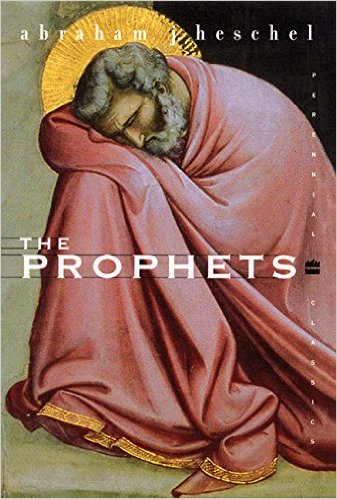
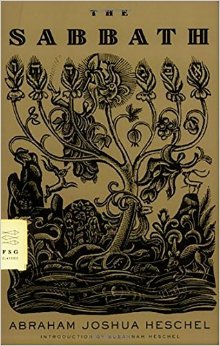 The Prophets Abraham Joshua Heschel (Harper Perennial) $19.99 You may have been meaning to read this large, serious work for years, now, or maybe you’ve only recently heard of this passionate mid-twentieth century Rabbi/scholar/activist. (You will see his white hair and beard in many old pictures of Dr. King and the civil rights marches.) First published in 1962 The Prophets has been considered a classic ever since, plumbing as it does, the pathos of the Hebrew prophets. Perhaps now is a time to start it. For a less daunting, but equally rich, very rewarding read, consider Rabbi Heschel’s wonderful and important work The Sabbath (Farrar Straus Giroux; $14.00.) It was released, I think, in 1951 and remains a standard in any discussion of Jewish spirituality. I think I first learned of it, or was challenged to read it, by Marva Dawn or maybe Eugene Peterson, who often recommends it. You really should have both of these…
The Prophets Abraham Joshua Heschel (Harper Perennial) $19.99 You may have been meaning to read this large, serious work for years, now, or maybe you’ve only recently heard of this passionate mid-twentieth century Rabbi/scholar/activist. (You will see his white hair and beard in many old pictures of Dr. King and the civil rights marches.) First published in 1962 The Prophets has been considered a classic ever since, plumbing as it does, the pathos of the Hebrew prophets. Perhaps now is a time to start it. For a less daunting, but equally rich, very rewarding read, consider Rabbi Heschel’s wonderful and important work The Sabbath (Farrar Straus Giroux; $14.00.) It was released, I think, in 1951 and remains a standard in any discussion of Jewish spirituality. I think I first learned of it, or was challenged to read it, by Marva Dawn or maybe Eugene Peterson, who often recommends it. You really should have both of these…
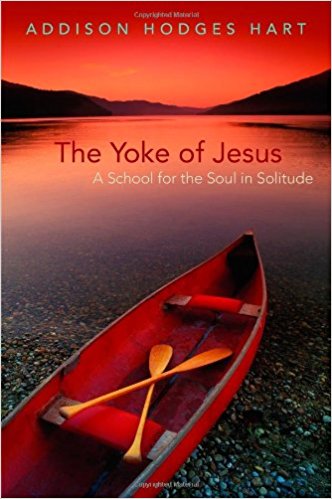 The Yoke of Jesus: A School for the Soul in Solitude Addison Hodges Hart (Eerdmans) $14.00 This compact sized paperback is so beautifully written, so warm, so insightful, that I wanted to list it here. He is a Catholic priest and college chaplain – his books are oddly winsome even as they tackle some tough stuff. (See, for instance, his book Knowing Darkness: On Skepticism, Melancholy, Friendship and God.) This gracious volume invites us to silence and solitude, to care about our souls by attending to ordinary practices, bringing together dogma and belief (on one hand) but linking it to true knowledge of God and earnest love for God. What is the role of stillness in Christian discipleship, and how have the ancient writers (and the Bible itself) taught us about deeper prayer through nurturing habits of solitude? Hart’s most recent two books, by the way, also small ones, are on Buddhism (for Christians) and a lovely study of the gospel of John, called The Woman, the Hour, and the Garden.
The Yoke of Jesus: A School for the Soul in Solitude Addison Hodges Hart (Eerdmans) $14.00 This compact sized paperback is so beautifully written, so warm, so insightful, that I wanted to list it here. He is a Catholic priest and college chaplain – his books are oddly winsome even as they tackle some tough stuff. (See, for instance, his book Knowing Darkness: On Skepticism, Melancholy, Friendship and God.) This gracious volume invites us to silence and solitude, to care about our souls by attending to ordinary practices, bringing together dogma and belief (on one hand) but linking it to true knowledge of God and earnest love for God. What is the role of stillness in Christian discipleship, and how have the ancient writers (and the Bible itself) taught us about deeper prayer through nurturing habits of solitude? Hart’s most recent two books, by the way, also small ones, are on Buddhism (for Christians) and a lovely study of the gospel of John, called The Woman, the Hour, and the Garden.
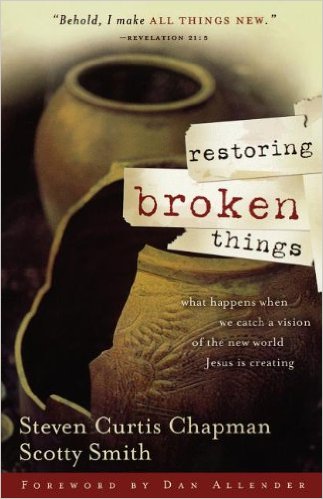 Restoring Broken Things Steven Curtis Chapman & Scotty Smith (Thomas Nelson) $14.99 Maybe you’ve heard that there is a brand new memoir by CCM singer Steven Curtis Chapman (Between Heaven and the Real World: My Story) or maybe you’ve read some of pastor Scotty Smith’s powerful, serious books of prayers. They are both men who have suffered, men who are attentive to the fallen nature of our hurting world, and who are firm in the hope that the gospel is, in fact, a restoration of creation. This old book (which I featured at Jubilee this year on Saturday morning as we studied the fall, injustice, and brokenness) tells the big gospel story — creation/fall/redemption — and invites us to see “what happens when we catch a vision of the new world Jesus is creating.” This is good, accessible, Biblical theology, offering varying ways to tell the story of the gospel, to help us see our own role in the fresh start of new creation that God is bringing to bear in our lives and in all of creation. Dan Allender wrote a lovely, passionate forward. This is a great book to read anytime, and certainly a good one for now, here in the midst of the Lenten season when we ponder broken things, and yearn for authenticity about that, and yet hope for greater comfort and healing and restoration. I’m a big fan of this book and commend it to you.
Restoring Broken Things Steven Curtis Chapman & Scotty Smith (Thomas Nelson) $14.99 Maybe you’ve heard that there is a brand new memoir by CCM singer Steven Curtis Chapman (Between Heaven and the Real World: My Story) or maybe you’ve read some of pastor Scotty Smith’s powerful, serious books of prayers. They are both men who have suffered, men who are attentive to the fallen nature of our hurting world, and who are firm in the hope that the gospel is, in fact, a restoration of creation. This old book (which I featured at Jubilee this year on Saturday morning as we studied the fall, injustice, and brokenness) tells the big gospel story — creation/fall/redemption — and invites us to see “what happens when we catch a vision of the new world Jesus is creating.” This is good, accessible, Biblical theology, offering varying ways to tell the story of the gospel, to help us see our own role in the fresh start of new creation that God is bringing to bear in our lives and in all of creation. Dan Allender wrote a lovely, passionate forward. This is a great book to read anytime, and certainly a good one for now, here in the midst of the Lenten season when we ponder broken things, and yearn for authenticity about that, and yet hope for greater comfort and healing and restoration. I’m a big fan of this book and commend it to you.
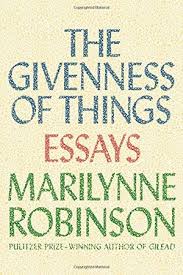 The Givenness of Things: Essays Marilynne Robinson (Picador) $16.00 This paperback is worth every dime – loaded, as it is, with ponderings deep and delicious, thoughtful and interesting, glorious, even. Granted, she is writing deeply, as a literary essayist here — you may only know her Pulitzer-Prize winning novels such as Gildead, Homecoming, or Lila — but if you are a serious thinker or wanting to be aware of the major public intellectuals of our day, you could hardly do better than to spend time with these remarkable, heady essays. Her intellectual prowess is well-respected (The Christian Science Monitor mentioned her “formidable intellect” and The New Republic said her handiwork is “capacious and serious, but also mysterious and wondrous.”) The Givenness of Things was named as Time’s top ten nonfiction books when it came out in hardcover and now, in this nice paperback, there is added a two-part interview between her and then-President Barack Obama that first appeared in the New York Review of Books. The New York Times Book Review, by the way, said her “heroic lamentation is magnificent… timely and important.” That she is a John Calvin scholar, too, makes her just a fascinating, tremendously interesting figure. Until her next novel comes, read this.
The Givenness of Things: Essays Marilynne Robinson (Picador) $16.00 This paperback is worth every dime – loaded, as it is, with ponderings deep and delicious, thoughtful and interesting, glorious, even. Granted, she is writing deeply, as a literary essayist here — you may only know her Pulitzer-Prize winning novels such as Gildead, Homecoming, or Lila — but if you are a serious thinker or wanting to be aware of the major public intellectuals of our day, you could hardly do better than to spend time with these remarkable, heady essays. Her intellectual prowess is well-respected (The Christian Science Monitor mentioned her “formidable intellect” and The New Republic said her handiwork is “capacious and serious, but also mysterious and wondrous.”) The Givenness of Things was named as Time’s top ten nonfiction books when it came out in hardcover and now, in this nice paperback, there is added a two-part interview between her and then-President Barack Obama that first appeared in the New York Review of Books. The New York Times Book Review, by the way, said her “heroic lamentation is magnificent… timely and important.” That she is a John Calvin scholar, too, makes her just a fascinating, tremendously interesting figure. Until her next novel comes, read this.
 Silence and Beauty: Hidden Faith Born of Suffering Makoto Fujimura (IVP) $26.00 Well, if you haven’t gotten this yet, might I suggest you do so now? I am not always this “pushy” but I am confident that this marvelous reflection on the relationship of art and creativity and beauty and suffering — and what all that tells us about God and the hope of redemption in the sufferings of Jesus — is a perfect book to take up as we move towards Good Friday. You know we respect Mr. Fujimura (what a thrill it was to have me introduced at Grove City College last week and having it said that the next speaker in their series of which I was a part, was painter and essayist Makoto Fujimura!) This is not only a survey of good thinking about faith and art and suffering but it is, quite specifically, a conversation with Japanese novelist Shusaku Endo and his stunning story Silence. And, also, tangentially, about Mako’s friend Martin Scorcese and his making of a film based on this 1960s novel. The novel (about the persecution of Christian missionaries in Seventeenth Century Japan) was influential in Mako’s own journey to Christ and his Christian witness today in the world of the arts and letters is somewhat indebted to Endo’s novel. It all comes full circle in Silence and Beauty — Mako, Endo, Japan, art, film, pain and redemption, goodness and life, the gospel and cultural renewal, faith and mystery. What a book! Very highly recommended!
Silence and Beauty: Hidden Faith Born of Suffering Makoto Fujimura (IVP) $26.00 Well, if you haven’t gotten this yet, might I suggest you do so now? I am not always this “pushy” but I am confident that this marvelous reflection on the relationship of art and creativity and beauty and suffering — and what all that tells us about God and the hope of redemption in the sufferings of Jesus — is a perfect book to take up as we move towards Good Friday. You know we respect Mr. Fujimura (what a thrill it was to have me introduced at Grove City College last week and having it said that the next speaker in their series of which I was a part, was painter and essayist Makoto Fujimura!) This is not only a survey of good thinking about faith and art and suffering but it is, quite specifically, a conversation with Japanese novelist Shusaku Endo and his stunning story Silence. And, also, tangentially, about Mako’s friend Martin Scorcese and his making of a film based on this 1960s novel. The novel (about the persecution of Christian missionaries in Seventeenth Century Japan) was influential in Mako’s own journey to Christ and his Christian witness today in the world of the arts and letters is somewhat indebted to Endo’s novel. It all comes full circle in Silence and Beauty — Mako, Endo, Japan, art, film, pain and redemption, goodness and life, the gospel and cultural renewal, faith and mystery. What a book! Very highly recommended!
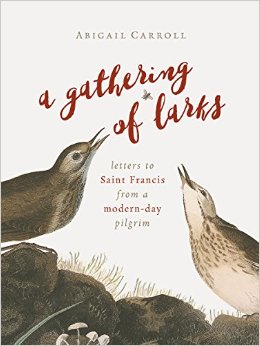 A Gathering of Larks: Letters to Saint Francis from a Modern-Day Pilgrim Abigail Carroll (Eerdmans) $12.99 Oh my, what an interesting book this is, not the easiest to describe, but simple to explain. This is a luminous set of poems written to, yep, Saint Francis. Consequently, this becomes what creative writing guru Brian Doyle calls “a most refreshing, eloquent, wonderfully unassuming, gentle inquiry into the actual Saint Francis and the song of his awed life” and Carroll’s own awed life as well. Mystic Richard Rohr says these lyrical letters “court wonder, inviting the reader on a pilgrimage to the heart.”
A Gathering of Larks: Letters to Saint Francis from a Modern-Day Pilgrim Abigail Carroll (Eerdmans) $12.99 Oh my, what an interesting book this is, not the easiest to describe, but simple to explain. This is a luminous set of poems written to, yep, Saint Francis. Consequently, this becomes what creative writing guru Brian Doyle calls “a most refreshing, eloquent, wonderfully unassuming, gentle inquiry into the actual Saint Francis and the song of his awed life” and Carroll’s own awed life as well. Mystic Richard Rohr says these lyrical letters “court wonder, inviting the reader on a pilgrimage to the heart.”
Sarah Arthur writes,
More than just a fresh glimpse of an exceptional saint whose humanity and complexity Carroll delightfully renders. This is also the welcome debut of an exceptional poet, whose deep humility and adroitness with poetic form are rare qualities she shares with Francis himself. Earthy, honest, a pure delight.
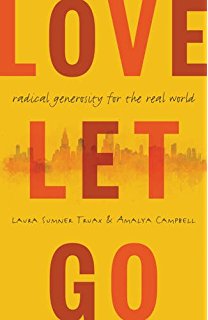 Love Let Go: Radical Generosity for the Real World Laura Sumner Truax & Amalya Campbell (Eerdmans) $21.99 A few years ago I was blown away by the raw and revealing memoir by Laura Truax called Undone: When Coming Apart Puts You Back Together. She is the passionate pastor of the storied faith community in urban Chicago called LaSalle Street Church and in this new book she and a congregation member who taught stewardship classes there (and herself has an MBA from Harvard Business School), tell of something amazing that transpired in that place. A smaller version of this has been used as sermon illustrations and youth talks for years, but this is the real thing: a major donor gave the church a ton of money. They concluded they didn’t want it – itself a story worth writing a book about! – but they decided to give each member $500 and instructed them to go out and do good in the world. This is, on the surface, the stories of what happened as radical generosity became even more of a way of life for this congregation. This is more than fun tales of giving and sharing and helping, it is what Publisher’s Weekly has called “a well-wrought book, of interest to anyone interested in community building or philanthropy.” It is what McLaren calls “a powerful alternative message (to greed)” and “the transformative power of generosity.” This is a counter-cultural story that needs to be known, but it is also a rich study of the psychology of giving, the nature of living abundant lives within a culture that promotes scarcity, and the plausibility of being Christ-like in a world like ours. One of the best books of the year, I’m sure.
Love Let Go: Radical Generosity for the Real World Laura Sumner Truax & Amalya Campbell (Eerdmans) $21.99 A few years ago I was blown away by the raw and revealing memoir by Laura Truax called Undone: When Coming Apart Puts You Back Together. She is the passionate pastor of the storied faith community in urban Chicago called LaSalle Street Church and in this new book she and a congregation member who taught stewardship classes there (and herself has an MBA from Harvard Business School), tell of something amazing that transpired in that place. A smaller version of this has been used as sermon illustrations and youth talks for years, but this is the real thing: a major donor gave the church a ton of money. They concluded they didn’t want it – itself a story worth writing a book about! – but they decided to give each member $500 and instructed them to go out and do good in the world. This is, on the surface, the stories of what happened as radical generosity became even more of a way of life for this congregation. This is more than fun tales of giving and sharing and helping, it is what Publisher’s Weekly has called “a well-wrought book, of interest to anyone interested in community building or philanthropy.” It is what McLaren calls “a powerful alternative message (to greed)” and “the transformative power of generosity.” This is a counter-cultural story that needs to be known, but it is also a rich study of the psychology of giving, the nature of living abundant lives within a culture that promotes scarcity, and the plausibility of being Christ-like in a world like ours. One of the best books of the year, I’m sure.
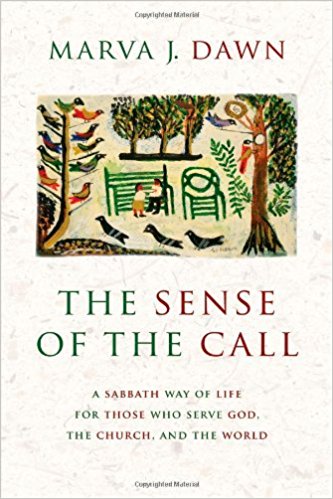 The Sense of the Call: A Sabbath Way of Life for Those Who Serve God, the Church, and the World Marva Dawn (Eerdmans) $18.00 One of the great books of our time, and one that we continue to carry with us whenever we sell books off site, if it is remotely appropriate, is Marva Dawn’s Keeping the Sabbath Wholly. (It is a book that would be wonderful to read during this time of the church season, by the way, learning to build some rest and discipline into your schedule.) In that remarkable and influential volume she delightfully unpacks four aspects of Sabbath keeping: resting, ceasing, feasting, and embracing. That’s a lot, but not too much, and it clarified a lot for many of us about the restorative, beautiful gift of Sabbath time. Of course, it isn’t easy to enter in to that sort of counter-cultural practice, and it is even harder for those who are in leadership within the local church where much work is done on Sunday. Anyway, in this book (for church leaders, yes, but, truly, for anyone and everyone) Marva spells out how those four movements of the Sabbath day’s rest can actually be woven into daily living the other six days of the week. In this powerful work she revisits those same four life-giving aspects from her Sabbath book, turning them into a “Sabbath way of life” and shows how we all can be formed in these helpful way, through these historic disciplines and practices, dispositions and attitudes. It is a remarkable, rich, rewarding, good read , just over 300 pages. As Eugene Peterson says, “there is not a trivial or superfluous word in this book.”
The Sense of the Call: A Sabbath Way of Life for Those Who Serve God, the Church, and the World Marva Dawn (Eerdmans) $18.00 One of the great books of our time, and one that we continue to carry with us whenever we sell books off site, if it is remotely appropriate, is Marva Dawn’s Keeping the Sabbath Wholly. (It is a book that would be wonderful to read during this time of the church season, by the way, learning to build some rest and discipline into your schedule.) In that remarkable and influential volume she delightfully unpacks four aspects of Sabbath keeping: resting, ceasing, feasting, and embracing. That’s a lot, but not too much, and it clarified a lot for many of us about the restorative, beautiful gift of Sabbath time. Of course, it isn’t easy to enter in to that sort of counter-cultural practice, and it is even harder for those who are in leadership within the local church where much work is done on Sunday. Anyway, in this book (for church leaders, yes, but, truly, for anyone and everyone) Marva spells out how those four movements of the Sabbath day’s rest can actually be woven into daily living the other six days of the week. In this powerful work she revisits those same four life-giving aspects from her Sabbath book, turning them into a “Sabbath way of life” and shows how we all can be formed in these helpful way, through these historic disciplines and practices, dispositions and attitudes. It is a remarkable, rich, rewarding, good read , just over 300 pages. As Eugene Peterson says, “there is not a trivial or superfluous word in this book.”
Mark Buchanan (whose own book The Rest of God is pretty darn nice, too) calls Marva Dawn “a holy oddity” as she,
…juggles the prophetic with the pragmatic, stern warning with giddy invitation, a scholar’s exactitude with a child’s whimsy. She embodies both human brokenness and divine transformation…
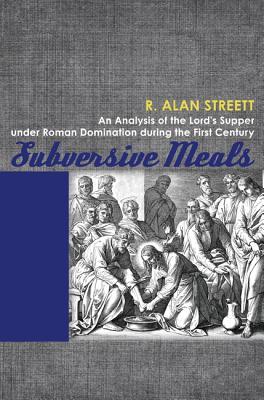 Subversive Meals: An Analysis of the Lord’s Supper Under Roman Domination During the First Century R. Alan Streett (Pickwick Publications) $37.00 A hefty academic monograph, this may be of great interest to some of our readers who want to explore how ancient Christian practices had at their roots anti-empire connotations and nearly revolutionary impact. Endorsements on this lively book are from Richard Horsley and Warrant Carter (who have long written about this counter-cultural hermeneutic that explores the radical socio-political themes embedded but often missed in Biblical teaching and practice.) Interestingly, Street teaches Biblical Exegesis at the ultra-conservative Criswell College in Texas. Joel Green, an esteemed evangelical scholar (formerly of Asbury, now at Fuller) says that Streett “demonstrates the surprisingly political significance of the Lord’s Supper” and that his book is “historically important and theological challenging” which “participates in the ongoing destruction of the walls that separate theology and practices, worship and politics.”
Subversive Meals: An Analysis of the Lord’s Supper Under Roman Domination During the First Century R. Alan Streett (Pickwick Publications) $37.00 A hefty academic monograph, this may be of great interest to some of our readers who want to explore how ancient Christian practices had at their roots anti-empire connotations and nearly revolutionary impact. Endorsements on this lively book are from Richard Horsley and Warrant Carter (who have long written about this counter-cultural hermeneutic that explores the radical socio-political themes embedded but often missed in Biblical teaching and practice.) Interestingly, Street teaches Biblical Exegesis at the ultra-conservative Criswell College in Texas. Joel Green, an esteemed evangelical scholar (formerly of Asbury, now at Fuller) says that Streett “demonstrates the surprisingly political significance of the Lord’s Supper” and that his book is “historically important and theological challenging” which “participates in the ongoing destruction of the walls that separate theology and practices, worship and politics.”
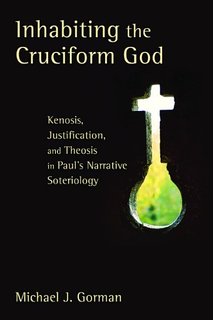
 Cruciformity: Paul’s Narrative Spirituality of the Cross Michael J. Gorman (Eerdmans) $38.00
Cruciformity: Paul’s Narrative Spirituality of the Cross Michael J. Gorman (Eerdmans) $38.00
Inhabiting the Cruciform God: Kenosis, Justification, and Theosis in Paul’s Narrative Soteriology Michael J. Gorman (Eerdmans) $25.00
Becoming the Gospel: Paul, Participation, and Mission Michael J. Gorman (Eerdmans)$28.00
If one is serious about working through Mike Gorman’s extraordinary published corpus, one could start with these three, starting with Cruciformity, moving on to Inhabiting and then taking up the amazing, recent Becoming the Gospel. But all stand alone, 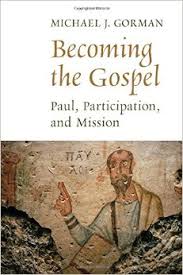 too, and could be read in ways that are helpful, illuminating, challenging, informative and – the author hopes – transformative. Some have of called these a “tour de force” and “superb and groundbreaking” etcetera. He is an author you should know – in league with and quoted by nearly everyone serious in New Testament studies these days (from N.T. Wright to Richard Hays to Fleming Rutledge and other world class authors.) Lent seems like a good time to take up his challenge to “participate” in God’s own mission, as explained by Paul, as embodied by the sacrificial suffering of the Lamb of God, Christ Himself. This is heady scholarship but always with a view of how local churches live out the call to costly discipleship. Wow.
too, and could be read in ways that are helpful, illuminating, challenging, informative and – the author hopes – transformative. Some have of called these a “tour de force” and “superb and groundbreaking” etcetera. He is an author you should know – in league with and quoted by nearly everyone serious in New Testament studies these days (from N.T. Wright to Richard Hays to Fleming Rutledge and other world class authors.) Lent seems like a good time to take up his challenge to “participate” in God’s own mission, as explained by Paul, as embodied by the sacrificial suffering of the Lamb of God, Christ Himself. This is heady scholarship but always with a view of how local churches live out the call to costly discipleship. Wow.
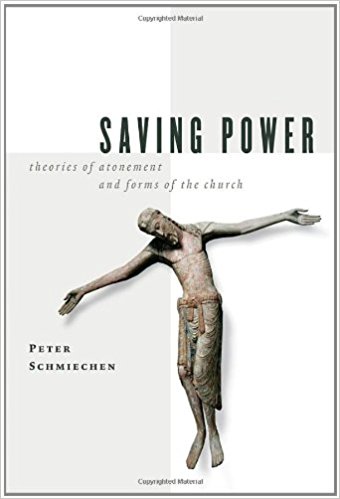 Saving Power: Theories of Atonement and Forms of the Church Peter Schmiechen (Eerdmans) $39.95 Peter was former President of Lancaster Theological Seminary and for one so situated within UCC higher education it may surprise some to know of his orthodox passions. (He is involved in the rather conservative Mercersburg Society that applies Schaff and Nevin to today’s ecumenical challenges; indeed, his new book is about Eucharistic theology written with what seems to be a Mercersburg accent.) Endorsements of this almost 400 page study are from Walter Brueggemann, Sally Brown (of Princeton) and S. Mark Heim (of Andover Newton, a “nonviolent atonement” voice) and evangelically Reformed Hans Boersma of Regent College, affirming the book’s scholarly clarity (it studies 10 different models) and congeniality, notes “even when he feels the need to express his strong reservations, Schmiechen treads carefully, respectfully, and yet frankly.” If you want other books on this topic, send us an inquiry, or, for an interesting place to start, see Scot McKnight’s A Community Called Atonement (Abingdon; $18.99.)
Saving Power: Theories of Atonement and Forms of the Church Peter Schmiechen (Eerdmans) $39.95 Peter was former President of Lancaster Theological Seminary and for one so situated within UCC higher education it may surprise some to know of his orthodox passions. (He is involved in the rather conservative Mercersburg Society that applies Schaff and Nevin to today’s ecumenical challenges; indeed, his new book is about Eucharistic theology written with what seems to be a Mercersburg accent.) Endorsements of this almost 400 page study are from Walter Brueggemann, Sally Brown (of Princeton) and S. Mark Heim (of Andover Newton, a “nonviolent atonement” voice) and evangelically Reformed Hans Boersma of Regent College, affirming the book’s scholarly clarity (it studies 10 different models) and congeniality, notes “even when he feels the need to express his strong reservations, Schmiechen treads carefully, respectfully, and yet frankly.” If you want other books on this topic, send us an inquiry, or, for an interesting place to start, see Scot McKnight’s A Community Called Atonement (Abingdon; $18.99.)
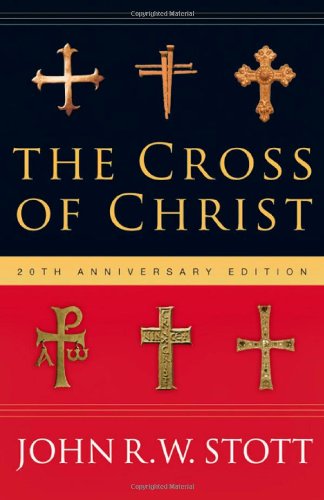
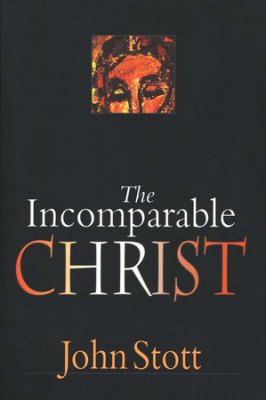 The Cross of Christ John R.W. Stott (IVP Academic) $28.00 I seem to recommend this every year at this time, in part because it has meant so much to me, advancing a mature, winsome, if seriously evangelical view of the nature of the work of the cross. Granted, other authors push in fresh, new directions, but this is the best overview of the conventional position that we know of. Many think it is the good John Stott’s crowning achievement, although, since we’re passing out superlatives, I think his exceptionally interesting volume on Christ that covers so very much, The Incomparable Christ (IVP; $20.00) is also among his absolutely best. work Both are books good for any Christian library as they will serve you for a lifetime.
The Cross of Christ John R.W. Stott (IVP Academic) $28.00 I seem to recommend this every year at this time, in part because it has meant so much to me, advancing a mature, winsome, if seriously evangelical view of the nature of the work of the cross. Granted, other authors push in fresh, new directions, but this is the best overview of the conventional position that we know of. Many think it is the good John Stott’s crowning achievement, although, since we’re passing out superlatives, I think his exceptionally interesting volume on Christ that covers so very much, The Incomparable Christ (IVP; $20.00) is also among his absolutely best. work Both are books good for any Christian library as they will serve you for a lifetime.
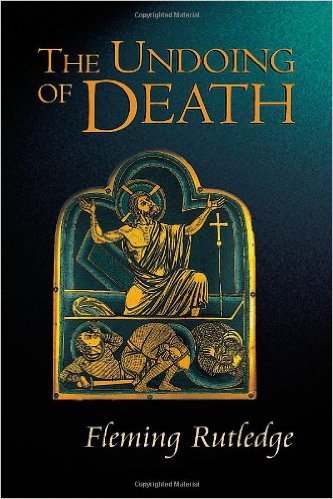
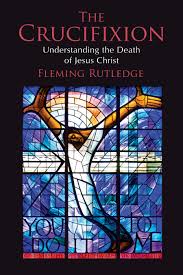 The Undoing of Death: Sermons for Holy Week and Easter Fleming Rutledge (Eerdmans) $24.00 This is another that, while not technically a Lenten devotional, is, in fact, a collection of sermons preached over a lifetime by the eloquent Episcopal pastor and scholar. Her words are powerful, her studies extraordinary, and this book deserves being read and re-read. I hope you own it. If not, it would be our great pleasure to send one soon. I hardly need to mention it here as we’ve promoted it often and it has won a number of important awards, but her recent book The Crucifixion: Understanding the Death of Jesus Christ (Eerdmans; $30.00) is now out in paperback and, although it may take longer than forty days to work through it, it is very, very good.
The Undoing of Death: Sermons for Holy Week and Easter Fleming Rutledge (Eerdmans) $24.00 This is another that, while not technically a Lenten devotional, is, in fact, a collection of sermons preached over a lifetime by the eloquent Episcopal pastor and scholar. Her words are powerful, her studies extraordinary, and this book deserves being read and re-read. I hope you own it. If not, it would be our great pleasure to send one soon. I hardly need to mention it here as we’ve promoted it often and it has won a number of important awards, but her recent book The Crucifixion: Understanding the Death of Jesus Christ (Eerdmans; $30.00) is now out in paperback and, although it may take longer than forty days to work through it, it is very, very good.
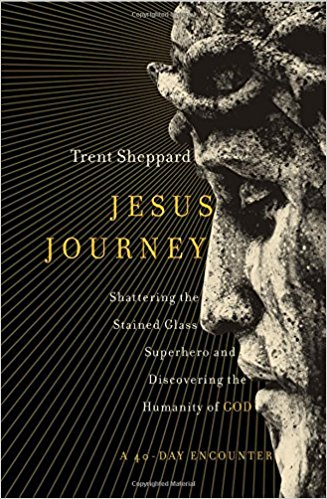 Jesus Journey: Shattering the Stained Glass Superhero and Discovering the Humanity of God – a 40 Day Encounter Trent Shepard (Zondervan) $16.99 I am sometimes a bit weary of uber-cool authors whose bios tell you snarky stuff about their favorite lattes and pastors who look like they play in an emo band, with churches with stages that look like hip malls or the local rock arena. I dunno, maybe I’m getting old. There are a lot of books that are just a little too familiar, and little too casual, trying sooo hard to be cool. So when a book comes out saying it’s going to overturn our stuffy attitudes about Jesus and religion, well, I sometimes just roll my eyes. It’s useful, especially for millennials, I suppose, to hear somebody that at least appears edgy with an out-side-the-box message, helping them appreciate faith in their own vernacular. My faith in my youthful years was impacted by bell-bottom wearing, long-haired, Jesus Freaks. (And, later, I met Terry Thomas who in those years looked liked David Crosby, but I digress.) So I get it. But I’m still a little tired of the marketing schtick.
Jesus Journey: Shattering the Stained Glass Superhero and Discovering the Humanity of God – a 40 Day Encounter Trent Shepard (Zondervan) $16.99 I am sometimes a bit weary of uber-cool authors whose bios tell you snarky stuff about their favorite lattes and pastors who look like they play in an emo band, with churches with stages that look like hip malls or the local rock arena. I dunno, maybe I’m getting old. There are a lot of books that are just a little too familiar, and little too casual, trying sooo hard to be cool. So when a book comes out saying it’s going to overturn our stuffy attitudes about Jesus and religion, well, I sometimes just roll my eyes. It’s useful, especially for millennials, I suppose, to hear somebody that at least appears edgy with an out-side-the-box message, helping them appreciate faith in their own vernacular. My faith in my youthful years was impacted by bell-bottom wearing, long-haired, Jesus Freaks. (And, later, I met Terry Thomas who in those years looked liked David Crosby, but I digress.) So I get it. But I’m still a little tired of the marketing schtick.
I say all that to only say this book by a college ministry guy who pastors an urban house church called Ekklesia (of course it is) is, in fact, very cool and yet remarkably solid, very, very thoughtful, offering vibrant scholarship and literary allusions of just the sort that any of us could be easily brought in to the story he tells. And quite an urgent story it is, inviting us to remember the full humanity of Jesus. These are necessarily down-to-Earth reflections and maybe it will help you appreciate not only younger voices in the church today, but ancient, ancient truths about Jesus who can transform our view of God, as we consider what it means to be human. This is a very good book and I highly recommend it. It draws on N.T Wright, Marcus Borg, Kenneth Bailey, Geza Vermes, Dorothy Sayers, and more. Very nicely done.
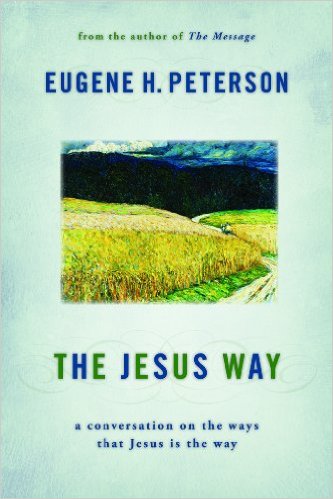 The Jesus Way: A Conversation on the Ways That Jesus is the Way Eugene Peterson (Eerdmans) $17.00 I suppose you know all five of these remarkable, mostly big, somewhat dense books that Peterson saw as his most important contribution. It is called “spiritual theology” that is more than only spirituality, more than systematic theology, more than Bible study, but a rich and rewarding combination, by a scholar/pastor. I agree with Scot McKnight who said once that “no one simply reads, or worse, skims Peterson. One ponders Peterson, as Peterson ponders the Bible.” Yes, and more. I’ve been working on these five volumes, on and off, for years, and I cannot tell you how important they are. This third one in the series – following Christ Plays in Ten Thousand Places and Eat This Book and Tell It Slant offers profound insight into how others in the Bible anticipated His coming and shows how the ways of those who came before Christ – specifically Abraham, Moses, David, Elijah, and Isaiah — “revealed and prepared the ‘way of the Lord’ that became incarnate and complete in Jesus.”
The Jesus Way: A Conversation on the Ways That Jesus is the Way Eugene Peterson (Eerdmans) $17.00 I suppose you know all five of these remarkable, mostly big, somewhat dense books that Peterson saw as his most important contribution. It is called “spiritual theology” that is more than only spirituality, more than systematic theology, more than Bible study, but a rich and rewarding combination, by a scholar/pastor. I agree with Scot McKnight who said once that “no one simply reads, or worse, skims Peterson. One ponders Peterson, as Peterson ponders the Bible.” Yes, and more. I’ve been working on these five volumes, on and off, for years, and I cannot tell you how important they are. This third one in the series – following Christ Plays in Ten Thousand Places and Eat This Book and Tell It Slant offers profound insight into how others in the Bible anticipated His coming and shows how the ways of those who came before Christ – specifically Abraham, Moses, David, Elijah, and Isaiah — “revealed and prepared the ‘way of the Lord’ that became incarnate and complete in Jesus.”
As it says on the back:
Peterson calls into question common “ways” followed by the contemporary American church, showing in stark relief how what we have chosen to focus on — consumerism, celebrity, charisma, and so forth –obliterate what is unique in the Jesus way.
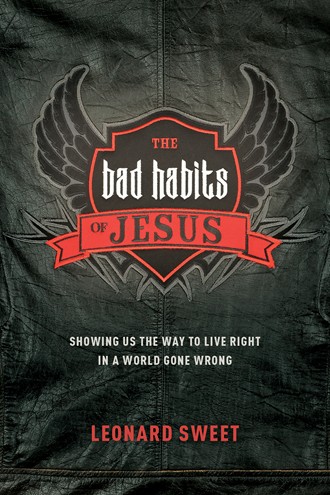 The Bad Habits of Jesus: Showing Us the Way to Live Right in a World Gone Wrong Leonard Sweet (Tyndale) $14.99 I am convinced that there is always more going on in a Len Sweet book than most of us realize. Just his footnotes alone are an education, better than browsing through a big Barnes & Noble or meandering through your local college library. He brings remarkable learning, a fertile curiosity, and a breath-taking — even for some, exasperating — use of wordplay and wit to whatever project he takes up. Such is one way to read his new one — it can be skimmed quickly as any collection of sermons or Bible lessons might be, getting the gist, taking in the many ideas, applauding the keen cleverness that would find all this “bad” stuff Jesus did, the rules he broke, the manners he seems to avoid, the trouble he caused. I suppose much of this has been said before but, to be honest, I can’t think of a better intro to this line of thought for ordinary folks: Jesus did have some “bad habits” did he not? He’d disappear when people needed him most, he’d refuse to answer questions directly, he’d offend people, especially important religious folks. He was late. He spit. He spent time with unproductive children. He was at times wasteful. He told stories that didn’t make a lot of sense. What’s with this “rebellious rabbi” and is there a method to his madness? The Bad Habits of Jesus is a lot of fun, a good intro to the life and teaching of Jesus and a surprisingly powerful little book.
The Bad Habits of Jesus: Showing Us the Way to Live Right in a World Gone Wrong Leonard Sweet (Tyndale) $14.99 I am convinced that there is always more going on in a Len Sweet book than most of us realize. Just his footnotes alone are an education, better than browsing through a big Barnes & Noble or meandering through your local college library. He brings remarkable learning, a fertile curiosity, and a breath-taking — even for some, exasperating — use of wordplay and wit to whatever project he takes up. Such is one way to read his new one — it can be skimmed quickly as any collection of sermons or Bible lessons might be, getting the gist, taking in the many ideas, applauding the keen cleverness that would find all this “bad” stuff Jesus did, the rules he broke, the manners he seems to avoid, the trouble he caused. I suppose much of this has been said before but, to be honest, I can’t think of a better intro to this line of thought for ordinary folks: Jesus did have some “bad habits” did he not? He’d disappear when people needed him most, he’d refuse to answer questions directly, he’d offend people, especially important religious folks. He was late. He spit. He spent time with unproductive children. He was at times wasteful. He told stories that didn’t make a lot of sense. What’s with this “rebellious rabbi” and is there a method to his madness? The Bad Habits of Jesus is a lot of fun, a good intro to the life and teaching of Jesus and a surprisingly powerful little book.
However, one can encounter this easily-read book on another level, probing Len’s suggestions, following his tangents and applying them to our lives as he suggests, studying the footnotes, doing the exercises he challenges us with, complex as they may be. There’s a useful Bad Habits study guide making this ideal for an adult class or book club and can move us to deeper discipleship, not only paying attention to the ways and means of our Master Jesus, but pushing us to be more Christ-like in our own lives, not being “bad to the bone” for no good reason, and not to valorize being rowdy or misunderstood, but to be, in a deeply spiritual and proper sense, counter-cultural, radically Christian, able to walk as He did. By doing a playful but serious reading of Christ’s life (and bad manners) we can be shaped not by the stories and habits and ways of middle American religiosity, but by faithful, missional, discipleship. I think Sweet should be read by many of us, and I think we should then re-read him, more slowly, really considering the deeper questions hovering just under his wit and charm and shtick. It’s a pretty nifty cover, too, with that bad-looking motorcycle jacket.
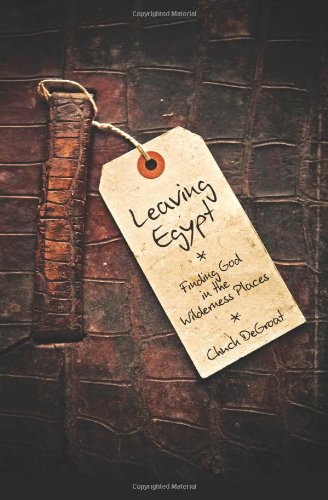 Leaving Egypt: Finding God in the Wilderness Places Chuck DeGroat (Square Inch) $15.99 I have talked about this book before, and tried to encourage many to read DeGroat’s other good books. (For instance, this time of year — or any time, really — many of us need his powerful book called Wholeheartedness: Busyness, Exhaustion, and Healing the Divided Self.) This first one of his, though, always is a delight to explain; I even love the suitcase-motif on the very cool cover design. This is the best book I know of that accessibly uses the wilderness wonderings (of the Hebrew people after they were liberated from Pharaoh’s Egypt) for any who are themselves in a time of wondering, wandering, or in transition. If you feel trapped and know there’s something better, says Steve Brown, “this book will change your life.” If you are a Bible study geek and want another voice in conversation with DeGroat’s why not pair it with Walt Brueggemann’s Keeping Sabbath As Resistance which invites us to say “no” to consumerism and be set free from the compulsions of our times; in a way, that book, too, explores what happens when we are set free, and how to find our way out of Egypt.
Leaving Egypt: Finding God in the Wilderness Places Chuck DeGroat (Square Inch) $15.99 I have talked about this book before, and tried to encourage many to read DeGroat’s other good books. (For instance, this time of year — or any time, really — many of us need his powerful book called Wholeheartedness: Busyness, Exhaustion, and Healing the Divided Self.) This first one of his, though, always is a delight to explain; I even love the suitcase-motif on the very cool cover design. This is the best book I know of that accessibly uses the wilderness wonderings (of the Hebrew people after they were liberated from Pharaoh’s Egypt) for any who are themselves in a time of wondering, wandering, or in transition. If you feel trapped and know there’s something better, says Steve Brown, “this book will change your life.” If you are a Bible study geek and want another voice in conversation with DeGroat’s why not pair it with Walt Brueggemann’s Keeping Sabbath As Resistance which invites us to say “no” to consumerism and be set free from the compulsions of our times; in a way, that book, too, explores what happens when we are set free, and how to find our way out of Egypt.
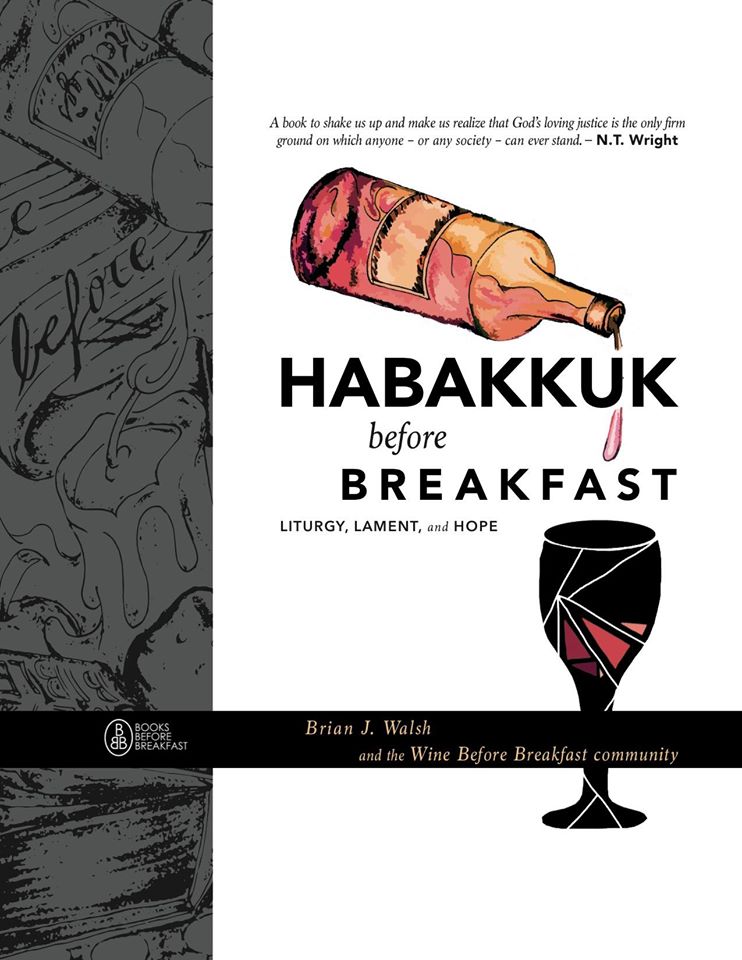 Habakkuk Before Breakfast: Liturgy, Lament, Hope Brian J. Walsh and the Wine Before Breakfast Community (Books Before Breakfast) $14.00 Again, this was a favorite last year, one I was honored to offer an endorsing blurb on (next to Karen Pascal, the Director of the Henri Nouwen Society and Tom Wright, Walsh’s old friend, who says that “Habakkuk Before Breakfast is like no other book on the prophet.”
Habakkuk Before Breakfast: Liturgy, Lament, Hope Brian J. Walsh and the Wine Before Breakfast Community (Books Before Breakfast) $14.00 Again, this was a favorite last year, one I was honored to offer an endorsing blurb on (next to Karen Pascal, the Director of the Henri Nouwen Society and Tom Wright, Walsh’s old friend, who says that “Habakkuk Before Breakfast is like no other book on the prophet.”
Wright continues,
That’s because it is, itself, prophecy, — and poetry, and preaching, and prayer, and liturgy, and lament, and a dozen other things melded together into a powerful, and powerfully disturbing, whole. A book to shake us up and make us realize that God’s loving justice is the only firm ground on which anyone – or any society – can ever stand.
I love that quote because this book is, truly, unlike nearly any other Bible study you’ve ever read. It narrates their “Wine Before Breakfast” communion services held at the University of Toronto, and the songs and prayers they used as they allowed the Biblical text to shape them, breaking their hearts open to a world not of their own making, but one construed and held as the troubling gift of a good creator and faithful redeemer. I’m telling you, this is a book to help you see worship in new ways, to see the Bible in new ways, to see life in new ways. Lent is a perfect time to join this band of Christ-followers as they worship around the table in the dark times of early morning winter Toronto.
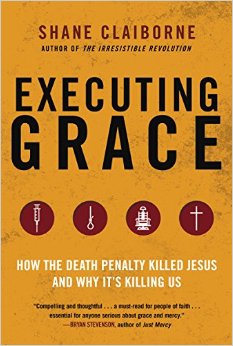 Executing Grace: How the Death Penalty Killed Jesus and Why It’s Killing Us Shane Claiborne (HarperOne) $17.99 Not long ago I had a long conversation with a gentleman who had been in solitary confinement for years. Beth and I had participated earlier this year in a conference organizing faith-motivated folks to think and act justly about this whole topic of mass incarceration, prison reform, solitary confinement — which is a much worse topic than you may know, unbelievably bad and in urgent need of reform — and, of course, the topic that we sometimes call “capital punishment.” Agree or not with Shane’s gospel-centered, grace-filled, Christ-like view (there are Biblical texts he avoids and arguments he doesn’t adequately grapple with) I think reading about those who are incarcerated and on Death Row is a necessary component of our own calling as Christians, mandated, as we are, at least, to “visit the prisoner.” Most of us don’t do that, so at least we can be advocates, prayer partners, citizens working for better policies for our imprisoned fellows. I think this is a very good book to enter into this conversation. There are important endorsements here from the likes of Philip Yancey and John Perkins (and Bob Goff who says “you’ll finish the last page and not just know more, but you’ll want to do more.”) Desmond Tutu raves, and Bryan Stevenson (author of the must-read Just Mercy) says “Compelling and thoughtful… a must-read for people of faith, essential for anyone serious about grace and mercy.” Well. Maybe this season you will be drawn to this kind of topic. I know it is a lot to ask, but we’d invite you to consider ordering this from us today.
Executing Grace: How the Death Penalty Killed Jesus and Why It’s Killing Us Shane Claiborne (HarperOne) $17.99 Not long ago I had a long conversation with a gentleman who had been in solitary confinement for years. Beth and I had participated earlier this year in a conference organizing faith-motivated folks to think and act justly about this whole topic of mass incarceration, prison reform, solitary confinement — which is a much worse topic than you may know, unbelievably bad and in urgent need of reform — and, of course, the topic that we sometimes call “capital punishment.” Agree or not with Shane’s gospel-centered, grace-filled, Christ-like view (there are Biblical texts he avoids and arguments he doesn’t adequately grapple with) I think reading about those who are incarcerated and on Death Row is a necessary component of our own calling as Christians, mandated, as we are, at least, to “visit the prisoner.” Most of us don’t do that, so at least we can be advocates, prayer partners, citizens working for better policies for our imprisoned fellows. I think this is a very good book to enter into this conversation. There are important endorsements here from the likes of Philip Yancey and John Perkins (and Bob Goff who says “you’ll finish the last page and not just know more, but you’ll want to do more.”) Desmond Tutu raves, and Bryan Stevenson (author of the must-read Just Mercy) says “Compelling and thoughtful… a must-read for people of faith, essential for anyone serious about grace and mercy.” Well. Maybe this season you will be drawn to this kind of topic. I know it is a lot to ask, but we’d invite you to consider ordering this from us today.
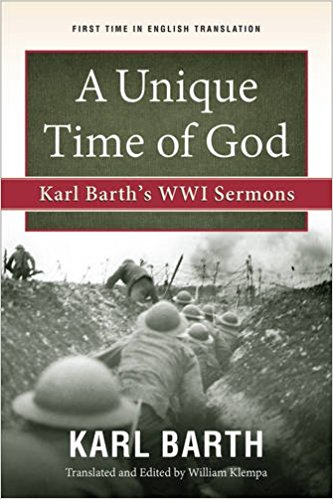 A Unique Time of God: Karl Barth’s WW I Sermons Karl Barth (Westminster/John Knox) $35.00 My theologically conservative friends, of course, think Barth is way too goofy and my progressive friends think he is mired in old-school stuff. I think he is well worth reading, and people I most respect commend his important work. This is a new collection previously never translated or compiled. The Great War, we are told, changed Barth forever. (See Joseph Loconte’s informative and very moving A Hobbit, A Wardrobe and a Great War for how the trauma of the war effected Tolkien and Lewis and how they “rediscovered faith, friendship, and heroism in the cataclysm of 1914-1918.) These thirteen hefty sermons offer not only the young Karl Barth’s unique view on war, but, particularly, the “unique time of God” which he discerned was God’s own judgement on the idolatry of militarism. We’re told in the excellent introduction that this era “demonstrates a decisive shift in Barth’s early theology” so is “essential for anyone who wishes to understand the twentieth-century’s greatest theologian.” And, we can hope, it might help us all reflect more conscientiously about God’s Word as it stands over what the old hymn called “our warring madness.” Kudos to WJK for releasing such important older works.
A Unique Time of God: Karl Barth’s WW I Sermons Karl Barth (Westminster/John Knox) $35.00 My theologically conservative friends, of course, think Barth is way too goofy and my progressive friends think he is mired in old-school stuff. I think he is well worth reading, and people I most respect commend his important work. This is a new collection previously never translated or compiled. The Great War, we are told, changed Barth forever. (See Joseph Loconte’s informative and very moving A Hobbit, A Wardrobe and a Great War for how the trauma of the war effected Tolkien and Lewis and how they “rediscovered faith, friendship, and heroism in the cataclysm of 1914-1918.) These thirteen hefty sermons offer not only the young Karl Barth’s unique view on war, but, particularly, the “unique time of God” which he discerned was God’s own judgement on the idolatry of militarism. We’re told in the excellent introduction that this era “demonstrates a decisive shift in Barth’s early theology” so is “essential for anyone who wishes to understand the twentieth-century’s greatest theologian.” And, we can hope, it might help us all reflect more conscientiously about God’s Word as it stands over what the old hymn called “our warring madness.” Kudos to WJK for releasing such important older works.
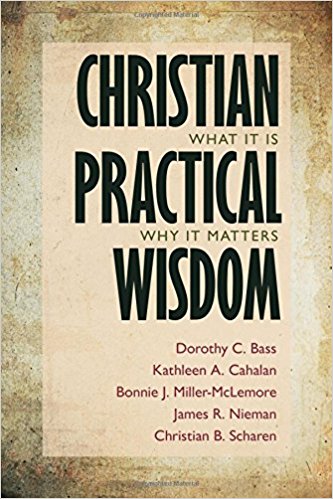 Christian Practical Wisdom: What It Is, Why It Matters Dorothy Bass, Kathleen Cahalan, Bonnie J. Miller-McLemore, James Nieman, Christian Scharen (Eerdmans) $30.00 I hope you know some of these five distinguished scholars, some who have written wonderful books of their own. And I hope you value, as I do, collaborative works of this sort. These colorful chapters are not an anthology from a conference (although I like random essays, too) but have been woven together beautifully, exploring (as the subtitle says) what wisdom is and why we need more of it. The chapters are creatively construed – with pieces on dancing and imagining and collaborating and how these actual practices can help us “gain a heart of wisdom” within what Charles Taylor calls a “secular age.” Blurbs on the back are all thoughtful, in-depth, and raving; philosopher Rebecca Konynkyk DeYoung of Calvin College and Mary Boys from Union Seminary and Stephanie Paulsell from Harvard Divinity School all agree that this profound yet winsome book helps move theological education into the pews, deep stuff into our lives, bringing academic expertise to ordinary folks who want to live a good life. Can we ponder more deeply, live with greater intentionality? Can we be “attuned to the presence of God and the needs of neighbors?” This is a tremendous book, well worth having, well worth working through its 350 pages with care. You will be delighted and challenged and glad. Wisdom is, as I’m sure you know, a major theme in the Bible and yet hardly examined beyond platitudes and moralism. This is the most significant book on this topic I’ve ever seen.
Christian Practical Wisdom: What It Is, Why It Matters Dorothy Bass, Kathleen Cahalan, Bonnie J. Miller-McLemore, James Nieman, Christian Scharen (Eerdmans) $30.00 I hope you know some of these five distinguished scholars, some who have written wonderful books of their own. And I hope you value, as I do, collaborative works of this sort. These colorful chapters are not an anthology from a conference (although I like random essays, too) but have been woven together beautifully, exploring (as the subtitle says) what wisdom is and why we need more of it. The chapters are creatively construed – with pieces on dancing and imagining and collaborating and how these actual practices can help us “gain a heart of wisdom” within what Charles Taylor calls a “secular age.” Blurbs on the back are all thoughtful, in-depth, and raving; philosopher Rebecca Konynkyk DeYoung of Calvin College and Mary Boys from Union Seminary and Stephanie Paulsell from Harvard Divinity School all agree that this profound yet winsome book helps move theological education into the pews, deep stuff into our lives, bringing academic expertise to ordinary folks who want to live a good life. Can we ponder more deeply, live with greater intentionality? Can we be “attuned to the presence of God and the needs of neighbors?” This is a tremendous book, well worth having, well worth working through its 350 pages with care. You will be delighted and challenged and glad. Wisdom is, as I’m sure you know, a major theme in the Bible and yet hardly examined beyond platitudes and moralism. This is the most significant book on this topic I’ve ever seen.
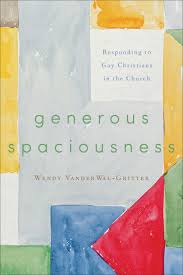 Generous Spaciousness: Responding to Gay Christians in the Church Wendy VanderWal-Gritter (Brazos Press) $19.99 I have raved about this book before, quietly (and, more often, loudly)encouraged people to read it as it tells the remarkable story of this woman’s deep engagement with several sides and groups within the conversation about same sex relations and marriage equality and “gays in the church.” It goes without saying that this remains a controversial matter in nearly every denomination and, as Brian Walsh says in a powerful endorsement on the back, “I can’t imagine a more timely book.” He continues, “Modeling the very ‘generous spaciousness’ that she advocates, VanderWal-Gritter’s heart is on every page.” There are many books inviting us to think of our LGTBQ friends and neighbors as – in the words of the new book Preston Sprinkle’s – as “people to be loved.” Certainly. But VanderWal-Gritter suggests that those with whom we disagree about Biblical interpretation and sexual ethics are also people to be loved and we must all work hard to listen well to one another, to figure out how to “transform controversy into community” with space for all.
Generous Spaciousness: Responding to Gay Christians in the Church Wendy VanderWal-Gritter (Brazos Press) $19.99 I have raved about this book before, quietly (and, more often, loudly)encouraged people to read it as it tells the remarkable story of this woman’s deep engagement with several sides and groups within the conversation about same sex relations and marriage equality and “gays in the church.” It goes without saying that this remains a controversial matter in nearly every denomination and, as Brian Walsh says in a powerful endorsement on the back, “I can’t imagine a more timely book.” He continues, “Modeling the very ‘generous spaciousness’ that she advocates, VanderWal-Gritter’s heart is on every page.” There are many books inviting us to think of our LGTBQ friends and neighbors as – in the words of the new book Preston Sprinkle’s – as “people to be loved.” Certainly. But VanderWal-Gritter suggests that those with whom we disagree about Biblical interpretation and sexual ethics are also people to be loved and we must all work hard to listen well to one another, to figure out how to “transform controversy into community” with space for all.
This big book offers a measured and thoughtful approach to sexual ethics and the surrounding debates but it is passionate about community, making room for others unlike ourselves, and offering a model of how to be agents of reconciliation, even those who are most polarized about various contentious issues. Lent, it seems to me, might be a good time to think about harm we’ve caused by fighting poorly and learn to respond to LGTBQ discussions with greater “spaciousness.” As urban activist and eloquent author Greg Paul writes, this is “gospel with flesh on it.”
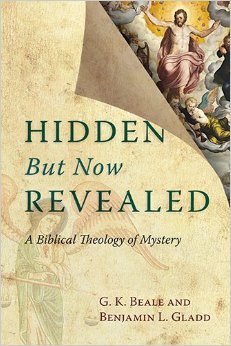 Hidden But Now Revealed: A Biblical Theology of Mystery G.K. Beale and Benjamin L. Gladd (IVP Academic) $27.00 Beale is a rigorous New Testament scholar (PhD from the University of Cambridge) who now teaches NT and Biblical Theology at Westminster Theological Seminary. His work is without doubt some of the most brilliant evangelical scholarship being done in our time; his commentary on Revelation in the New International Greek Testament Commentary series I’m told is extraordinary (not knowing Greek, I wouldn’t know.) I found his book We Become What We Worship an excellent resource and his somewhat more accessible commentary on Revelation to be demanding but important. This recent volume, co-authored, is intriguing, one I’ve been wishing to get to; we hear about “mystery” a lot, but few detail what we mean by that mysterious word and how the major works of God and the essential claims of Christ were often missed — if not hidden! — from the Biblical characters involved. It seems impossible to ignore this troubling fact and here these authors explore the things that are “partially hidden revelation” that are more fully revealed subsequently. It is a close reading of times the word mystery is used in the New Testament, which, they argue, is almost always drawing on the book of Daniel. So this ends up, in some regards, being a book about prophecy. Whew.
Hidden But Now Revealed: A Biblical Theology of Mystery G.K. Beale and Benjamin L. Gladd (IVP Academic) $27.00 Beale is a rigorous New Testament scholar (PhD from the University of Cambridge) who now teaches NT and Biblical Theology at Westminster Theological Seminary. His work is without doubt some of the most brilliant evangelical scholarship being done in our time; his commentary on Revelation in the New International Greek Testament Commentary series I’m told is extraordinary (not knowing Greek, I wouldn’t know.) I found his book We Become What We Worship an excellent resource and his somewhat more accessible commentary on Revelation to be demanding but important. This recent volume, co-authored, is intriguing, one I’ve been wishing to get to; we hear about “mystery” a lot, but few detail what we mean by that mysterious word and how the major works of God and the essential claims of Christ were often missed — if not hidden! — from the Biblical characters involved. It seems impossible to ignore this troubling fact and here these authors explore the things that are “partially hidden revelation” that are more fully revealed subsequently. It is a close reading of times the word mystery is used in the New Testament, which, they argue, is almost always drawing on the book of Daniel. So this ends up, in some regards, being a book about prophecy. Whew.
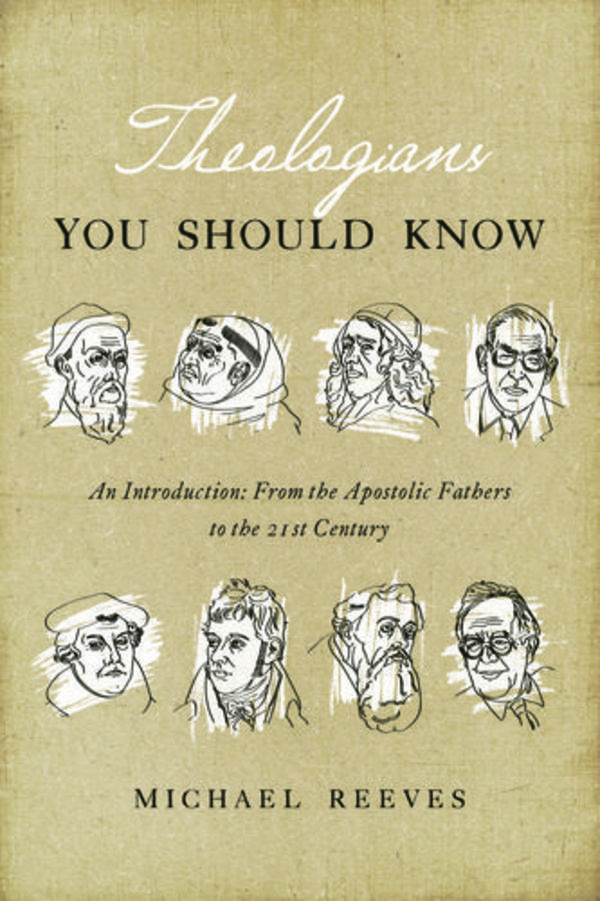 Theologians You Should Know: An Introduction from the Apostolic Fathers to the 21st Century Michael Reeves (Crossway) $19.99 You may know Reeves from a lovely book he wrote called Delighting in the Trinity or a great one called Rejoicing in Christ. He has a conservative, Reformed view and here offers a great reader in historical theology, an introduction to the monumental members of the “great cloud of witnesses” about whom it cannot hurt to know more. He looks at the lives and thought of the Apostolic Fathers, Justin Martyr, Athanasius, Augustine, Anselm, Aquinas, Luther, Calvin, Edwards, Barth, Schleiermacher and more.
Theologians You Should Know: An Introduction from the Apostolic Fathers to the 21st Century Michael Reeves (Crossway) $19.99 You may know Reeves from a lovely book he wrote called Delighting in the Trinity or a great one called Rejoicing in Christ. He has a conservative, Reformed view and here offers a great reader in historical theology, an introduction to the monumental members of the “great cloud of witnesses” about whom it cannot hurt to know more. He looks at the lives and thought of the Apostolic Fathers, Justin Martyr, Athanasius, Augustine, Anselm, Aquinas, Luther, Calvin, Edwards, Barth, Schleiermacher and more.
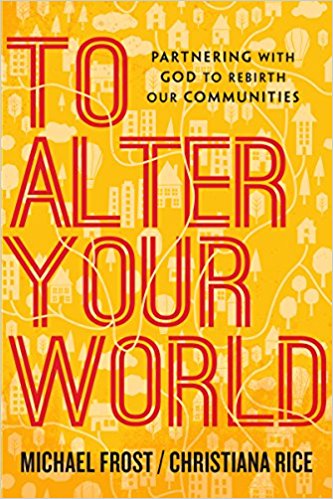 To Alter Your World: Partnering with God to Rebirth Our Communities Michael Frost & Christiana Rice (Forge America/IVP Praxis) $17.00 I suppose you know that we stock oodles of books about the missional church and, in more recent years, those who have taken missional church insights and applied them to daily discipleship. Michael Frost has given us great books both for congregations and for persons committed to robust, missional visions of vocation in the world but not of it. Wow, I love his stuff. But one sometimes wonders when an author has said most of what he or she has got within them to say. I rolled my eyes (sorry, Michael) when I heard there was yet another book by this prolific author. And then I started this, skimming the table of contents, dipping in here and there, looking at the always intriguing footnotes. And I was quickly hooked–from the evocative imagery of midwifery (okay, he had me at the quote by British home birth advocate Sheila Kitzinger) and birthing the new creation among us, I think this wonderful book reminds us yet again that we can truly partner with God, that we become agents of Christ’s own work in the world, that there is much required, even though it is all gift. Romans 8 uses this “all creation groaning” language and directly links it to childbirth. It’s a metaphor well worth living with for a while.
To Alter Your World: Partnering with God to Rebirth Our Communities Michael Frost & Christiana Rice (Forge America/IVP Praxis) $17.00 I suppose you know that we stock oodles of books about the missional church and, in more recent years, those who have taken missional church insights and applied them to daily discipleship. Michael Frost has given us great books both for congregations and for persons committed to robust, missional visions of vocation in the world but not of it. Wow, I love his stuff. But one sometimes wonders when an author has said most of what he or she has got within them to say. I rolled my eyes (sorry, Michael) when I heard there was yet another book by this prolific author. And then I started this, skimming the table of contents, dipping in here and there, looking at the always intriguing footnotes. And I was quickly hooked–from the evocative imagery of midwifery (okay, he had me at the quote by British home birth advocate Sheila Kitzinger) and birthing the new creation among us, I think this wonderful book reminds us yet again that we can truly partner with God, that we become agents of Christ’s own work in the world, that there is much required, even though it is all gift. Romans 8 uses this “all creation groaning” language and directly links it to childbirth. It’s a metaphor well worth living with for a while.
That the book was co-authored by a woman, Christiana Rice, is good, too. I’m told she came up with the birthing imagery that I so appreciated. This book about “partnering” with God is itself modeling that, a partnership, as it were. Congrats to Michael and his co-author Christiana for their lively collaboration. Here is what the bio says about her: Christiana serves “as a coach and trainer with Thresholds, a community of
player-coaches who help people create spaces of discovery and
communities of transformation. She leads a neighborhood faith community
in San Diego.”
As Jo Saxton (author of More Than Enchanting) says,
Frost and Rice recognize that as we engage with what God is birthing in our world, a fresh posture is required. Yep, it’s time to call the midwife; our world is waiting.
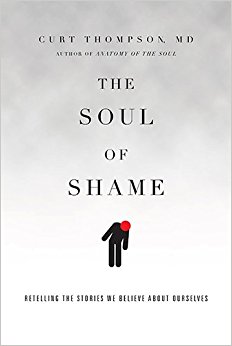 The Soul of Shame: Retelling the Stories We Believe About Ourselves Curt Thompson (IVP) $22.00 This splendid hardback could be a life-line for some of us who struggle with shame or recovering from some sense that we are not enough, not lovable, inadequate. In this sense, Thompson asserts, ” we are all infected with a spiritual disease. Its name is shame.”
The Soul of Shame: Retelling the Stories We Believe About Ourselves Curt Thompson (IVP) $22.00 This splendid hardback could be a life-line for some of us who struggle with shame or recovering from some sense that we are not enough, not lovable, inadequate. In this sense, Thompson asserts, ” we are all infected with a spiritual disease. Its name is shame.”
We have raved about this book from when it first came out, we awarded it one of our Books of the Year awards three years ago, and have been delighted to be with Curt several times hearing him present on this book (and his previous one, Anatomy of a Soul, which helpfully used his studies in neuro-science and psychotherapy to explain a bit about how the body is wired by God and how our relationships and vocations can improve if we are attentive to this sort of depth awareness of brain studies.) The Soul of Shame takes this “spirituality of neuro-science” approach to the deep questions of shame and brokenness, offering extraordinary Bible teaching to bring us to a place of understanding and healing and hope. We respect this author, appreciate his work, and love his books. As Gayle Beebe, the President of Westmont College ( himself somewhat of a mystic who has written with his friend Richard Foster) says, Dr. Thompson writes “with the heart of a pastor and the training of a surgeon…. he excavates layers and shame…” His compassion will help you identify your own pains and struggles and will help you find freedom from the lifelong negative messages that bind you. “Rewrite the story of your life” he says, calling us to brave, trusting, healing faith. What a book for this season of the year. Highly recommended.
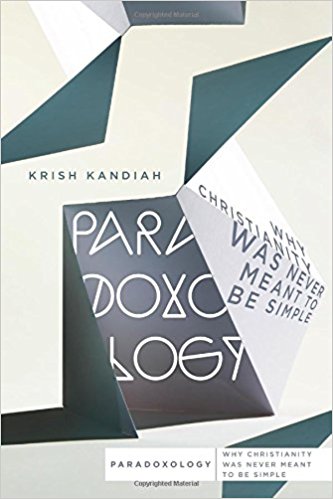 Paradoxology: Why Christianity Was Never Meant To Be Simple Krish Kandiah (IVP) $17.00 Okay, I have to say I haven’t looked at this much, but it is new and I’m so intrigued by it. People I respect – Scot McKnight, Jo Saxton, Eugene Cho — all endorse it with gusto. He starts with a wordy little joke in the first paragraph and says that if you get that paradox, there’s hope you’ll enjoy this book. Yep, there are a lot of paradoxes in the Bible and in Christian faith and this isn’t a book trying to “answer” them or explain them away. He invites us to live into the mystery, to embrace the seeming contradictions, to have a faith that is paradoxical. Every chapter is on a different part of the Bible or character, with titles like “The Abraham Paradox: The God Who Needs Nothing But Asks for Everything” or “The Job Paradox: The God Who Is Actively Inactive” or, from Esther, “The God Who Speaks Silently” or, from – hold on – one he calls “The Judas Paradox:The God Who Determines Our Free Will.” The ones about Jesus are not unfamiliar (being “Divinely Human”) and the one about the cross, while common place, I bet will be fabulous in Kandiah’s hands: “The God Who Wins as He Loses.” There’s more, but you get the drift. If this is your cup of tea, give us a call asap. I think you’ll want to read this in this upside down season.
Paradoxology: Why Christianity Was Never Meant To Be Simple Krish Kandiah (IVP) $17.00 Okay, I have to say I haven’t looked at this much, but it is new and I’m so intrigued by it. People I respect – Scot McKnight, Jo Saxton, Eugene Cho — all endorse it with gusto. He starts with a wordy little joke in the first paragraph and says that if you get that paradox, there’s hope you’ll enjoy this book. Yep, there are a lot of paradoxes in the Bible and in Christian faith and this isn’t a book trying to “answer” them or explain them away. He invites us to live into the mystery, to embrace the seeming contradictions, to have a faith that is paradoxical. Every chapter is on a different part of the Bible or character, with titles like “The Abraham Paradox: The God Who Needs Nothing But Asks for Everything” or “The Job Paradox: The God Who Is Actively Inactive” or, from Esther, “The God Who Speaks Silently” or, from – hold on – one he calls “The Judas Paradox:The God Who Determines Our Free Will.” The ones about Jesus are not unfamiliar (being “Divinely Human”) and the one about the cross, while common place, I bet will be fabulous in Kandiah’s hands: “The God Who Wins as He Loses.” There’s more, but you get the drift. If this is your cup of tea, give us a call asap. I think you’ll want to read this in this upside down season.
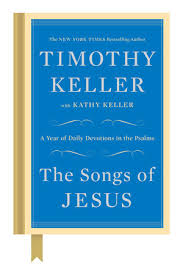 The Songs of Jesus: A Year of Daily Devotions in the Psalms Timothy & Kathy Keller (Viking) $19.95 Okay, I said this was a list for those who don’t want to read little Lenten devotionals, or books directly about the season of Lent. Fair enough. But this guide to the Psalms just seemed right to mention. The Songs of Jesus is a year’s worth of very short daily devotions, handsomely done with two color ink, gold-edged pages, a ribbon marker. But what should appeal is that these reflections and prayers are on the Psalms, by a serious, fine writer, and although you may resist a regimented devotional reading schedule, or maybe you already pray the hours with some daily office, this short collection of reflections on the church’s prayer book and the songbook of the ages, could be beneficial to many. I’m using it among other resources as I begin a class I’m teaching on the Psalms and wanted to commend it here.
The Songs of Jesus: A Year of Daily Devotions in the Psalms Timothy & Kathy Keller (Viking) $19.95 Okay, I said this was a list for those who don’t want to read little Lenten devotionals, or books directly about the season of Lent. Fair enough. But this guide to the Psalms just seemed right to mention. The Songs of Jesus is a year’s worth of very short daily devotions, handsomely done with two color ink, gold-edged pages, a ribbon marker. But what should appeal is that these reflections and prayers are on the Psalms, by a serious, fine writer, and although you may resist a regimented devotional reading schedule, or maybe you already pray the hours with some daily office, this short collection of reflections on the church’s prayer book and the songbook of the ages, could be beneficial to many. I’m using it among other resources as I begin a class I’m teaching on the Psalms and wanted to commend it here.
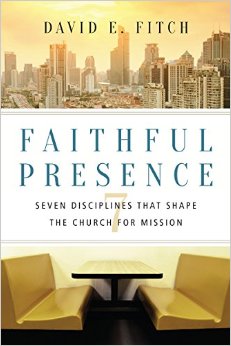 Faithful Presence: Seven Disciplines That Shape the Church for Mission David E. Fitch (Missio Alliance/IVP/Praxis) $17.00 This profound and important book deserves more than a shout out here in my list of suggested books for this month. I can tell you this much: Fitch starts off with a fine and generous overview of the much-discussed Oxford University Press book by UVA scholar James Davison Hunter, To Change the World. Many weighed in on that provocative book, but most agreed that he was right to say that the far left and the far right had similar weaknesses and that serious Christian reflection on impacting the culture should be a lot less ideological, a bit less idealistic, and much more attentive to how change actually transpires within late modernity. Fair enough.
Faithful Presence: Seven Disciplines That Shape the Church for Mission David E. Fitch (Missio Alliance/IVP/Praxis) $17.00 This profound and important book deserves more than a shout out here in my list of suggested books for this month. I can tell you this much: Fitch starts off with a fine and generous overview of the much-discussed Oxford University Press book by UVA scholar James Davison Hunter, To Change the World. Many weighed in on that provocative book, but most agreed that he was right to say that the far left and the far right had similar weaknesses and that serious Christian reflection on impacting the culture should be a lot less ideological, a bit less idealistic, and much more attentive to how change actually transpires within late modernity. Fair enough.
While some of us were engaged in reviews and conversations and study groups and symposium on that book — how does change happen and what does it mean to be faithful to God’s ways in our witness as salt and light and leaven as we “seek the peace of the city.” It remains an important book. Some like Fitch were willing to mostly concede Hunter’s basic call: we should be faithfully present, just showing up, living well, serving our neighbors in our places. Sure, we must engage the world, but not on the world’s terms, and we should surely be salt and leaven.
But, Fitch asks, how does that happen? That is, what kind of churches do we need to create disciples who have the wise and steady capacity to be “faithfully present”? Although he asks what “faithful presence” looks like, it is more the burden of this book to ask how we create it. What kind of churches create those kinds of people for that kind of mission?
Why not spend some time during this season of Lent to do some serious introspection and study about the nature of your own church? Here, Fitch offers seven practices that help us develop transformative contexts for real disciple-making, real Kingdom formation, so that we might all learn to “seek the peace of the city” in which God places us. If we want externally-focused churches, if we want to be sent into all-of-life-redeemed missional endeavors, if we want the post-Christian world in North America to be touched by vibrant, faithful servants of God, we need absolutely to rethink our congregational life. Methinks that James K.A. Smith’s You Are What You Love is a big part of that conversation, although Smith mostly talks about the formative power of worship, habits shaped by liturgy. This book insists or other practices, other formative contexts, other transforming opportunities within the routine life of the local congregation. Fitch truly offers “seven disciplines that shape the church” for a missional, in the world but not of it, effective, faithful, counter-cultural presence in the world.
I like the review by my friend Mandy Smith (whose book The Vulnerable Pastor is so, so good) who writes,
With scholarly care and pastoral zeal, David Fitch reminds us that it’s in long-term, communal devotion to small but transformative practices that we both discover and reflect the faithful
presence of God.
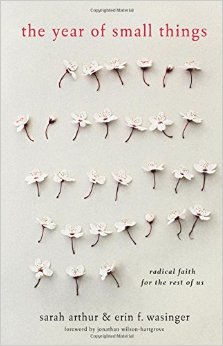 The Year of Small Things: Radical Faith for the Rest of Us Sarah Arthur & Erin F. Wasinger (Brazos Press) $17.99 I mentioned this new release a time or two before but have to tell you again that this is a perfect book to dip into during Lent. It isn’t a Lenten book, or even a devotional, but a set of memoir-like stories, a narrative that is beautifully-written, wonderfully-crafted, and powerfully told, as two women share how they and their families pledged to each other to take “baby steps” towards more faithful, radical, Christian discipleship. From Shane Claiborne and others we’ve heard in recent years about radical faith, missional living, alternative community, and how to serve the poor and marginalized. “Small things with great love” Mother Teresa advised, and so they try it, taking a year to move increasingly towards the things they most deeply want to do. How many of us live lives of “quiet desperation” as Thoreau put it, because we haven’t been intentional, don’t have the friends and support, can’t quite figure out how to take the time and energy to move towards living out our deepest convictions? This book will inspire you, help you, maybe be a companion and guide as these very literate and delightful women tell their own story. Leslie Leyland Fields calls is a “beautiful book that offers a mini-revolution that could shake up the world, or at least your neighborhood – and doesn’t require growing kale or living in a hut.” Ha. Unless you need to move into a hut or give away all your wealth this Lent, this book would be a fine way to spend some of your reading time this season. Take up The Year of Small Things and you will be glad you did.
The Year of Small Things: Radical Faith for the Rest of Us Sarah Arthur & Erin F. Wasinger (Brazos Press) $17.99 I mentioned this new release a time or two before but have to tell you again that this is a perfect book to dip into during Lent. It isn’t a Lenten book, or even a devotional, but a set of memoir-like stories, a narrative that is beautifully-written, wonderfully-crafted, and powerfully told, as two women share how they and their families pledged to each other to take “baby steps” towards more faithful, radical, Christian discipleship. From Shane Claiborne and others we’ve heard in recent years about radical faith, missional living, alternative community, and how to serve the poor and marginalized. “Small things with great love” Mother Teresa advised, and so they try it, taking a year to move increasingly towards the things they most deeply want to do. How many of us live lives of “quiet desperation” as Thoreau put it, because we haven’t been intentional, don’t have the friends and support, can’t quite figure out how to take the time and energy to move towards living out our deepest convictions? This book will inspire you, help you, maybe be a companion and guide as these very literate and delightful women tell their own story. Leslie Leyland Fields calls is a “beautiful book that offers a mini-revolution that could shake up the world, or at least your neighborhood – and doesn’t require growing kale or living in a hut.” Ha. Unless you need to move into a hut or give away all your wealth this Lent, this book would be a fine way to spend some of your reading time this season. Take up The Year of Small Things and you will be glad you did.
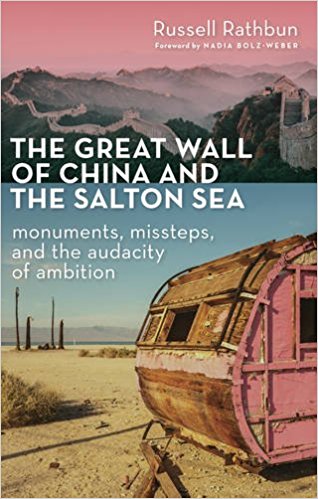 The Great Wall of China and the Salton Sea: Monuments, Missteps, and the Audacity of Ambition Russell Rathbun (Eerdmans) $21.99 Oh, man-o-man, this deserves a longer review and I hope I can get back to this to tell you even more about how I liked it so. I’ve been pondering this since I lost a bit too much sleep staying up reading (you’ve heard that phrase “I couldn’t put it down,” right?) This is an odd book, about an odd topic, and it is hard to say if it is creative nonfiction, a memoir of sorts, a travelogue, a family history, or some crazy-eyed, made-up novel. I say this mostly because a book he wrote a decade ago, a kind of novel called Post Rapture Radio, was so genre bending and spectacular (don’t get me started on how that wonderfully messed with my mind.) Since that dive into the deep end of the creative waters, Rathbun remains a pastor at the non-traditional House of Mercy (serving along side the excellent wordsmith and preacher herself, Debbie Blue) in Saint Paul, MN. That dear Nadia Bolz-Weber wrote a great introduction to this makes sense. She’s a fine, rather non-conventional pastor of a church for the “accidental saints” and other assorted odd-ball, unchurched, so a soul-mate of RR, I suppose, and a great storyteller. So she gets him.
The Great Wall of China and the Salton Sea: Monuments, Missteps, and the Audacity of Ambition Russell Rathbun (Eerdmans) $21.99 Oh, man-o-man, this deserves a longer review and I hope I can get back to this to tell you even more about how I liked it so. I’ve been pondering this since I lost a bit too much sleep staying up reading (you’ve heard that phrase “I couldn’t put it down,” right?) This is an odd book, about an odd topic, and it is hard to say if it is creative nonfiction, a memoir of sorts, a travelogue, a family history, or some crazy-eyed, made-up novel. I say this mostly because a book he wrote a decade ago, a kind of novel called Post Rapture Radio, was so genre bending and spectacular (don’t get me started on how that wonderfully messed with my mind.) Since that dive into the deep end of the creative waters, Rathbun remains a pastor at the non-traditional House of Mercy (serving along side the excellent wordsmith and preacher herself, Debbie Blue) in Saint Paul, MN. That dear Nadia Bolz-Weber wrote a great introduction to this makes sense. She’s a fine, rather non-conventional pastor of a church for the “accidental saints” and other assorted odd-ball, unchurched, so a soul-mate of RR, I suppose, and a great storyteller. So she gets him.
But more importantly, as Nadia says in the preface, and as Debbie Blue says on the back cover blurb (sharing space with, I can’t not tell you, Gordon Gano of the Violent Femmes) Russell Rathbun loves people, loves stories, loves that liminal place where story and words and history collide, even as he “hilariously unravels tales of our folly.” Which is to say (stay with me here) this is a Lenten book for those who don’t want a Lenten book. It is very enjoyable but, without being heavy handed, it is a study of the somewhat dark and twisted side of human foibles.
The plot line, such as it is, is simple: he criss-crosses across the globe visiting the legendary Salton Sea in Southern California’s desert and the Great Wall of China, the only two man-made objects (or so he heard growing up) that one can see from outer space.
He then launches into some remarkable re-telling of Bible stories, not only the flooding narrative from Noah and Ark et. al., but also the Tower of Babel story in Genesis 11. I’m not spoiling much (you can read it in the subtitle) to say that at the end of the day, this entertaining romp through his travels trying to visit these wild, storied, places, ends up being a book about hubris. Or, as Bolz-Weber says, since there is “no purity in the world,” it is about “the ambiguity of ambition.”
Rathbun’s reporting from China is riveting and his quick history of the rise of Chairman Mao and, importantly, his wife and the notorious Gang of Four is worth the price of the book. It tells you more about his fluency in pop culture to note that he also talks about the 1980s punk band of that name.
Years ago I read a book by one of my favorite writers, Dennis Covington, called Redneck Riviera which is about Covington trying to find out why his late father had some dumb deed to some swamp land in Florida. He was, apparently, ripped off and done wrong, and Covington decides to make it right, tracking down the Floridian long-ago deed dealers. Rathbun’s search isn’t quite that dramatic or dangerous and his story is more gentle and more haunting — but there are similarities: why did his modest, farmer grandfather end up with a deed to some luxury lot on the edge of the Salton Sea? It doesn’t make sense. What was going on there, and why did it end up to be so much of nothing? What sort of American dreams were shaping the development there and how did it go so wrong? I think his answers are different than Covington’s and they are closer to home.
And besides that stuff about hubris and ambition and pride and our human condition, there’s joy. As the stellar review in Publishers Weekly put it, it is “an explication of the mundane inside notions of the colossal or the grand, and a model of how to truly live and appreciate the world.”
Morgan Meis, a writer who contributes to the New Yorker, says,
I want to read everything Russell Rathbun has written — he’s funny and honest and attuned to the tragic and absurd. His prose made me laugh out loud, and it has made me cry. I cannot recommend The Great Wall of China and the Salton Sea more highly.
BookNotes

SPECIAL
DISCOUNT
ANY ITEM MENTIONED
10% off
order here
takes you to the secure Hearts & Minds order form page
just tell us what you want
inquire here
if you have questions or need more information
just ask us what you want to know
Hearts & Minds 234 East Main Street Dallastown, PA 17313 717-246-3333
read@heartsandmindsbooks.com
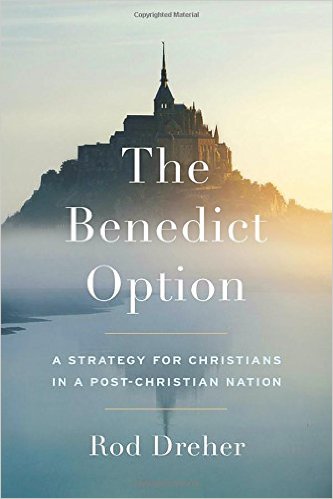
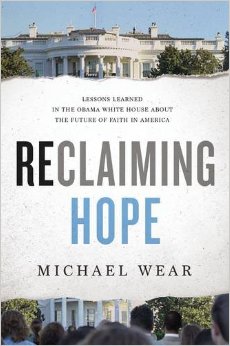 In the last few BookNotes we’ve waded into some rough waters, offering what I hope were balanced and helpful views of books such as the much-discussed The Benedict Option as well as books related to the contretemps about Keller and the Kuyper Center Award at Princeton. Before that we hosted Michael Wear in the store — a very pleasant evening where the former White House staffer talked about his book Reclaiming Hope: Lessons Learned in the Obama White House about the Future of Faith in America. Each of these posts and book-related conversations had a topic hovering nearby: in what way ought
In the last few BookNotes we’ve waded into some rough waters, offering what I hope were balanced and helpful views of books such as the much-discussed The Benedict Option as well as books related to the contretemps about Keller and the Kuyper Center Award at Princeton. Before that we hosted Michael Wear in the store — a very pleasant evening where the former White House staffer talked about his book Reclaiming Hope: Lessons Learned in the Obama White House about the Future of Faith in America. Each of these posts and book-related conversations had a topic hovering nearby: in what way ought 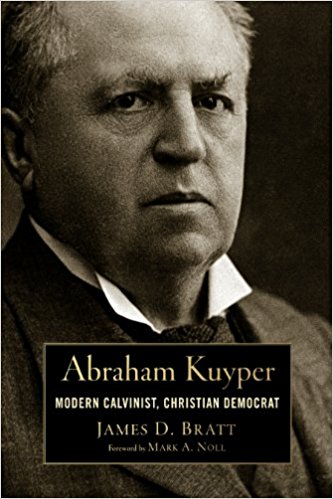 Christian people be involved in the world around them and what rights might society afford those who have religious convictions to live in ways that are true to their own consciences? Or, in more popular theological lingo, channeling the famous book by H. RIchard Niebuhr, what is the relationship between Christ and culture? Or, again, as one of the early church fathers asked “What does Athens have to do with Jerusalem?” It remains a live-wire question.
Christian people be involved in the world around them and what rights might society afford those who have religious convictions to live in ways that are true to their own consciences? Or, in more popular theological lingo, channeling the famous book by H. RIchard Niebuhr, what is the relationship between Christ and culture? Or, again, as one of the early church fathers asked “What does Athens have to do with Jerusalem?” It remains a live-wire question.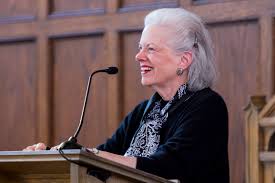 Fleming Rutledge — the wonderful author of books such as The Crucifixion, The Undoing of Death, The Seven Last Words from the Cross and more — and her husband complemented me after I highlighted a few of her books at event with her last week, declaring with enthusiasm that I was good at marketing. I don’t know about that, but I agreed that I can work myself into a good lather over books I believe in, resources that I think will bring pleasure and goodness and insight and truth to readers, as her learned ones surely do. And even she, theologian that she is, knows a bit about culcha: she has a collection of sermons sharply called The Bible and the New York Times as well as a very thorough literary study called The Battle for Middle-earth: Tolkien’s Divine Design in “The Lord of the Rings.”
Fleming Rutledge — the wonderful author of books such as The Crucifixion, The Undoing of Death, The Seven Last Words from the Cross and more — and her husband complemented me after I highlighted a few of her books at event with her last week, declaring with enthusiasm that I was good at marketing. I don’t know about that, but I agreed that I can work myself into a good lather over books I believe in, resources that I think will bring pleasure and goodness and insight and truth to readers, as her learned ones surely do. And even she, theologian that she is, knows a bit about culcha: she has a collection of sermons sharply called The Bible and the New York Times as well as a very thorough literary study called The Battle for Middle-earth: Tolkien’s Divine Design in “The Lord of the Rings.”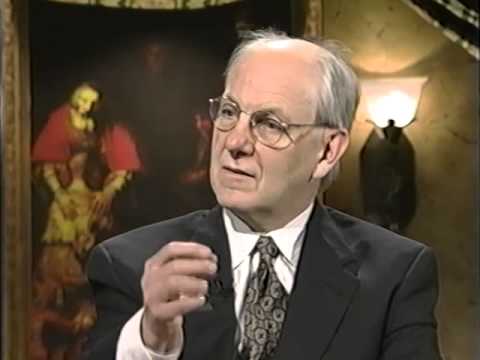 Which brings me to this.
Which brings me to this.![]() to re-tell much of what the good doctor taught us about Tertullian and the other early church fathers, but his main point was that the older story of the development of freedom of conscience in the West as a creation of the reasonable secular humanists of the Enlightenment, pushing back against sectarian religious impulses that caused wars and inquisitions is inadequate, that it was the earliest voices of the early Christians who cried out for religious freedom. He is not the first to say this but he documented it copiously.
to re-tell much of what the good doctor taught us about Tertullian and the other early church fathers, but his main point was that the older story of the development of freedom of conscience in the West as a creation of the reasonable secular humanists of the Enlightenment, pushing back against sectarian religious impulses that caused wars and inquisitions is inadequate, that it was the earliest voices of the early Christians who cried out for religious freedom. He is not the first to say this but he documented it copiously. Library of Congress, finding original books there, of course, from Jefferson’s own library.) This underlined sentence from the third century theologian made its way into one of Jefferson’s own books. Ahh, I thought, the power of a bookseller to get the right old book into the hands of a history-maker! I was encouraged and took pride as Wilken told the colorful story. His point was less about the virtue of the bookseller but was clear: even the wonderful American ideas — conscientious objection, free expression and the like — came not just from Quakers like William Penn or Baptists like Roger Williams or Reformers citing the developing tradition of human rights based on reformation thought, but it came (via Jefferson, in this case) from the early church! This is apparently astonishing news in the academy and the topic warranted Wilken delivering the prestigious Dunning Lecture in Baltimore, and will make its way into a bigger book, perhaps next year.
Library of Congress, finding original books there, of course, from Jefferson’s own library.) This underlined sentence from the third century theologian made its way into one of Jefferson’s own books. Ahh, I thought, the power of a bookseller to get the right old book into the hands of a history-maker! I was encouraged and took pride as Wilken told the colorful story. His point was less about the virtue of the bookseller but was clear: even the wonderful American ideas — conscientious objection, free expression and the like — came not just from Quakers like William Penn or Baptists like Roger Williams or Reformers citing the developing tradition of human rights based on reformation thought, but it came (via Jefferson, in this case) from the early church! This is apparently astonishing news in the academy and the topic warranted Wilken delivering the prestigious Dunning Lecture in Baltimore, and will make its way into a bigger book, perhaps next year.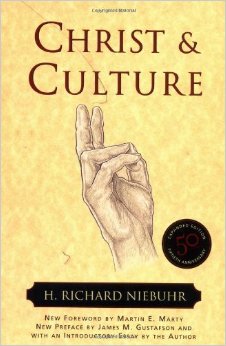 All of this circles back to Rod Dreher and how fast-paced and secularized modernity has eroded notions of religious identity for many of us and how the modern state has too often minimized notions of religious liberty. What do we do in times such as these? The BenOp is one response. Tim Keller’s Redeemer Presbyterian’s neo-Kuyperian worldview leading to robust sorts of gracious, evangelical cultural engagement is another. Liberal social gospel approaches from early 20th century Protestants are perhaps another. Niebuhr outlines five such options in the aforementioned Christ and Culture.
All of this circles back to Rod Dreher and how fast-paced and secularized modernity has eroded notions of religious identity for many of us and how the modern state has too often minimized notions of religious liberty. What do we do in times such as these? The BenOp is one response. Tim Keller’s Redeemer Presbyterian’s neo-Kuyperian worldview leading to robust sorts of gracious, evangelical cultural engagement is another. Liberal social gospel approaches from early 20th century Protestants are perhaps another. Niebuhr outlines five such options in the aforementioned Christ and Culture. 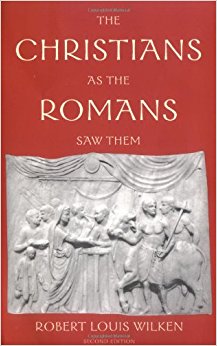 The Christians as the Romans Saw Them Robert Louis Wilken (Yale University Press) $15.95 What a great little book, erudite, influential, important, and so interesting. Numerous reviewers mention how gracious and eloquent the writing is, and it is true. It is not too lengthy nor expensive. The Atlantic Monthly review wrote that it “should fascinate any reader with an interest in the history of human thought.” One reviewer said it “draws upon well-known sources–both pagan and Christian–to provide the general reader with an illuminating account… of how Christianity appeared to the Romans before it became the established religion of the empire.” This stuff should be better known among us, I think, and I’m struck by how much we can learn in one little volume. Very nicely done.
The Christians as the Romans Saw Them Robert Louis Wilken (Yale University Press) $15.95 What a great little book, erudite, influential, important, and so interesting. Numerous reviewers mention how gracious and eloquent the writing is, and it is true. It is not too lengthy nor expensive. The Atlantic Monthly review wrote that it “should fascinate any reader with an interest in the history of human thought.” One reviewer said it “draws upon well-known sources–both pagan and Christian–to provide the general reader with an illuminating account… of how Christianity appeared to the Romans before it became the established religion of the empire.” This stuff should be better known among us, I think, and I’m struck by how much we can learn in one little volume. Very nicely done.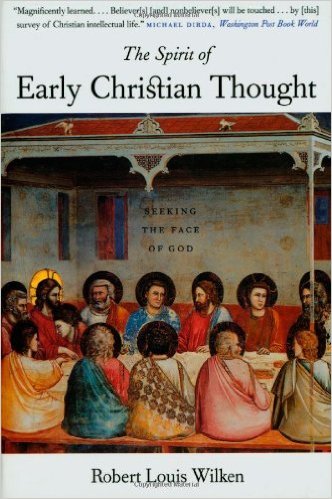 The Spirit of Early Christian Thought: Seeking the Face of God Robert Wilken (Yale University Press) $22.00 This book came out about a decade ago and remains a true standard, eloquent and fascinating, important and good. It was a real honor to get to display them for Dr. Wilken at St. Mary’s.
The Spirit of Early Christian Thought: Seeking the Face of God Robert Wilken (Yale University Press) $22.00 This book came out about a decade ago and remains a true standard, eloquent and fascinating, important and good. It was a real honor to get to display them for Dr. Wilken at St. Mary’s. 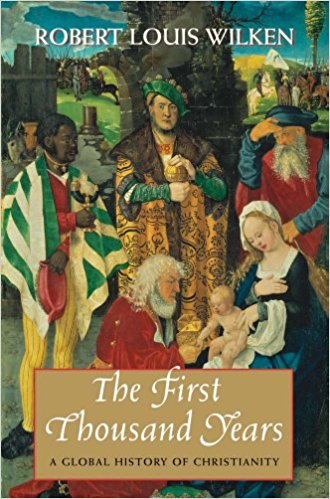 The First Thousand Years: A Global History of Christianity Robert Louis Wilken (Yale University Press) $22.00 Increasingly there has been academic attention to the global nature of church history and there have been new and surprising titles about the spread of Christianity centuries ago, and how the church grew and struggled, to supplement more typical tellings of the tale which focus on Europe. This book came out in 2013 and is required reading in many colleges and seminary courses. It is considered a one of the best of its kind. We were thrilled to have this on sale at the author event in Baltimore and are happy to offer you a great savings now.
The First Thousand Years: A Global History of Christianity Robert Louis Wilken (Yale University Press) $22.00 Increasingly there has been academic attention to the global nature of church history and there have been new and surprising titles about the spread of Christianity centuries ago, and how the church grew and struggled, to supplement more typical tellings of the tale which focus on Europe. This book came out in 2013 and is required reading in many colleges and seminary courses. It is considered a one of the best of its kind. We were thrilled to have this on sale at the author event in Baltimore and are happy to offer you a great savings now.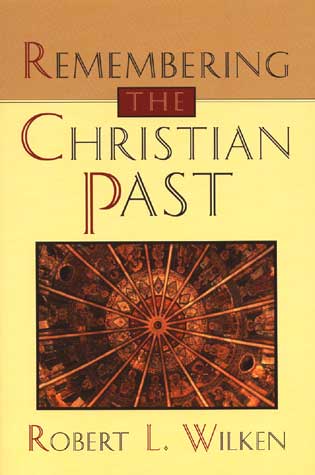 Remembering the Christian Past Robert Louis Wilken (Eerdmans) $21.50 Readers in the know about these things realize Wilken is a major thinker, one of the most esteemed scholars in this field, and it made sense that decades ago Eerdmans got him to compile a collection of essays, pithy and smart, wise, and elegant, making a case that we should draw on the past, that knowing something about church history matters, and that the earliest days of the church under the Roman Empire — and on into Christendom — generated insights (and problems) that are with us yet today.
Remembering the Christian Past Robert Louis Wilken (Eerdmans) $21.50 Readers in the know about these things realize Wilken is a major thinker, one of the most esteemed scholars in this field, and it made sense that decades ago Eerdmans got him to compile a collection of essays, pithy and smart, wise, and elegant, making a case that we should draw on the past, that knowing something about church history matters, and that the earliest days of the church under the Roman Empire — and on into Christendom — generated insights (and problems) that are with us yet today.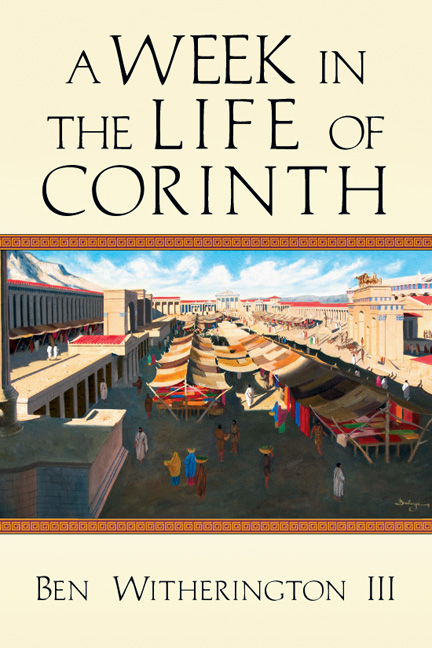 A Week in the Life of Corinth Ben Witherington III (IVP Academic) $16.00 While this is published by a scholarly, academic imprint, I must say it is good for nearly anyone, even high school students. It is a work of historical fiction, an imaginative and creative way to introduce us to what was going on in Corinth about the time the Apostle Paul wrote his famous letters to them. This is a one of a kind sort of window into the travels around the Mediterranean basin from which Paul wrote, and, more, how the Christians in this Greco-Roman city lived, related to their culture, and how they were caught up in the cultural, sexual, ethnic, and philosophical trends of their day. Fascinating for any study of the Bible book called Corinthians, but, more broadly, for anyone wondering how the early Christians really lives and related to their social world.
A Week in the Life of Corinth Ben Witherington III (IVP Academic) $16.00 While this is published by a scholarly, academic imprint, I must say it is good for nearly anyone, even high school students. It is a work of historical fiction, an imaginative and creative way to introduce us to what was going on in Corinth about the time the Apostle Paul wrote his famous letters to them. This is a one of a kind sort of window into the travels around the Mediterranean basin from which Paul wrote, and, more, how the Christians in this Greco-Roman city lived, related to their culture, and how they were caught up in the cultural, sexual, ethnic, and philosophical trends of their day. Fascinating for any study of the Bible book called Corinthians, but, more broadly, for anyone wondering how the early Christians really lives and related to their social world.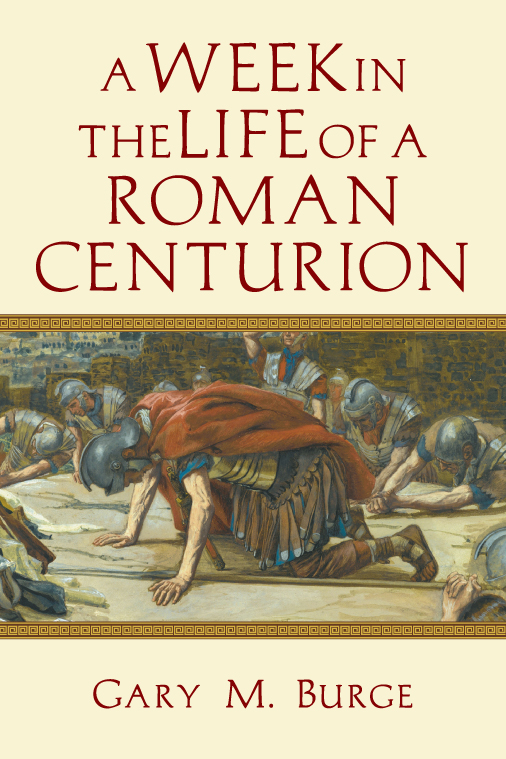 A Week in the Life of a Roman Centurion Gary Burge (IVP Academic) $16.00 This, too, is a very creatively done bit of historical fiction, a story set which, I believe, can help readers grapple with the “Christ and culture” questions. In this case, we get a window into the life of the Roman Empire, told through the eyes of a centurion mentioned in the Biblical text who seeks a healing for his Jewish slave from the itinerant Rabbi from Galilee. It is fast-paced, full of first century color, and highly recommended — especially for this time of the church year when we think of the Roman’s imperial power in the execution of Jesus. We really can appreciate our well known Bible stories more deeply when we can imagine the life of first century Rome and its environs.
A Week in the Life of a Roman Centurion Gary Burge (IVP Academic) $16.00 This, too, is a very creatively done bit of historical fiction, a story set which, I believe, can help readers grapple with the “Christ and culture” questions. In this case, we get a window into the life of the Roman Empire, told through the eyes of a centurion mentioned in the Biblical text who seeks a healing for his Jewish slave from the itinerant Rabbi from Galilee. It is fast-paced, full of first century color, and highly recommended — especially for this time of the church year when we think of the Roman’s imperial power in the execution of Jesus. We really can appreciate our well known Bible stories more deeply when we can imagine the life of first century Rome and its environs.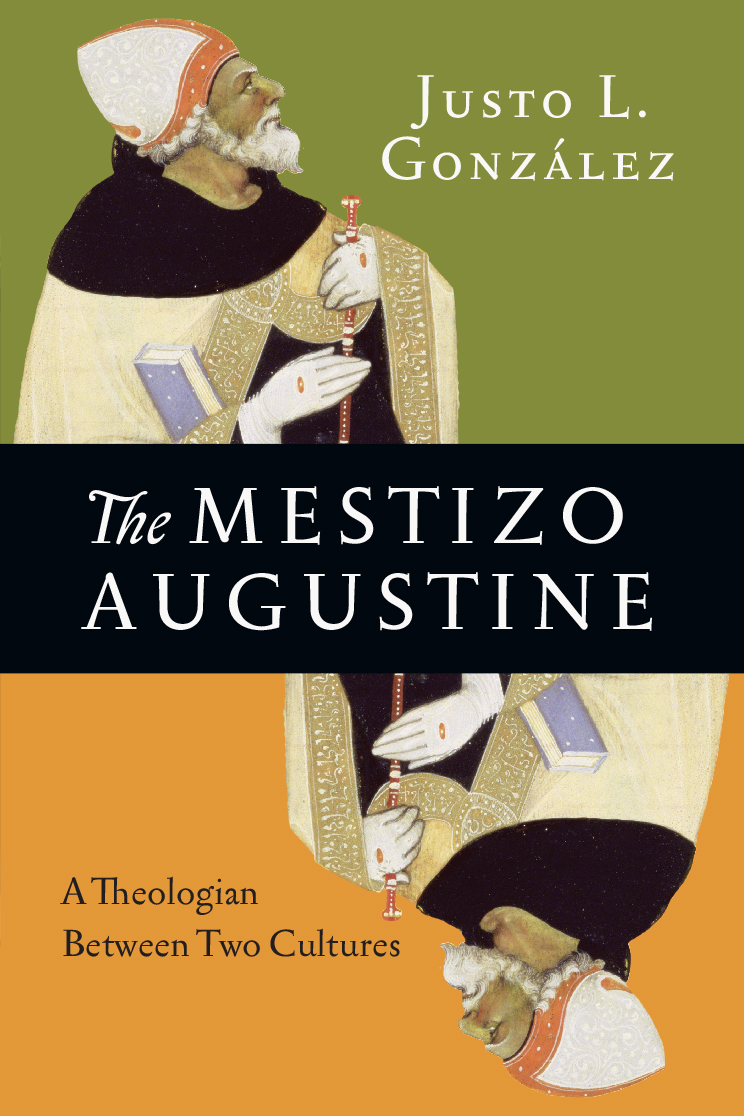 The Mestizo Augustine: A Theologian Between Two Cultures Justo Gonzalez (IVP Academic) $24.00 This is a recent book written by one of the great church historians of our time. We have carried his big and small works for those wanting an overview of the flow of Western church history. This one, though, is very special and a unique contribution. In keeping with the theme of this post, it seems so relevant to our questions today about justice and racial-reconciliation and globalization and how we are not the first ones to navigate such things. Augustine, as we should know, was both a Roman and an African — he was, after all, the Bishop of Hippo, in the Roman occupied region of Numbidia, what today we call Algeria (in Northern Africa.) He lived in that historical space between early Christianity and medieval Christendom, interacting with literature, philosophy, culture, theology, politics, church growth and parish life. Historian Mark Noll calls this new exploration “particularly insightful.” The brilliant scholar from Princeton, Eric Gregory, noting how many books there are on Augustine, says that “It is hard to think of one more timely for a new generation of readings than The Mestizo Augustine.
The Mestizo Augustine: A Theologian Between Two Cultures Justo Gonzalez (IVP Academic) $24.00 This is a recent book written by one of the great church historians of our time. We have carried his big and small works for those wanting an overview of the flow of Western church history. This one, though, is very special and a unique contribution. In keeping with the theme of this post, it seems so relevant to our questions today about justice and racial-reconciliation and globalization and how we are not the first ones to navigate such things. Augustine, as we should know, was both a Roman and an African — he was, after all, the Bishop of Hippo, in the Roman occupied region of Numbidia, what today we call Algeria (in Northern Africa.) He lived in that historical space between early Christianity and medieval Christendom, interacting with literature, philosophy, culture, theology, politics, church growth and parish life. Historian Mark Noll calls this new exploration “particularly insightful.” The brilliant scholar from Princeton, Eric Gregory, noting how many books there are on Augustine, says that “It is hard to think of one more timely for a new generation of readings than The Mestizo Augustine.

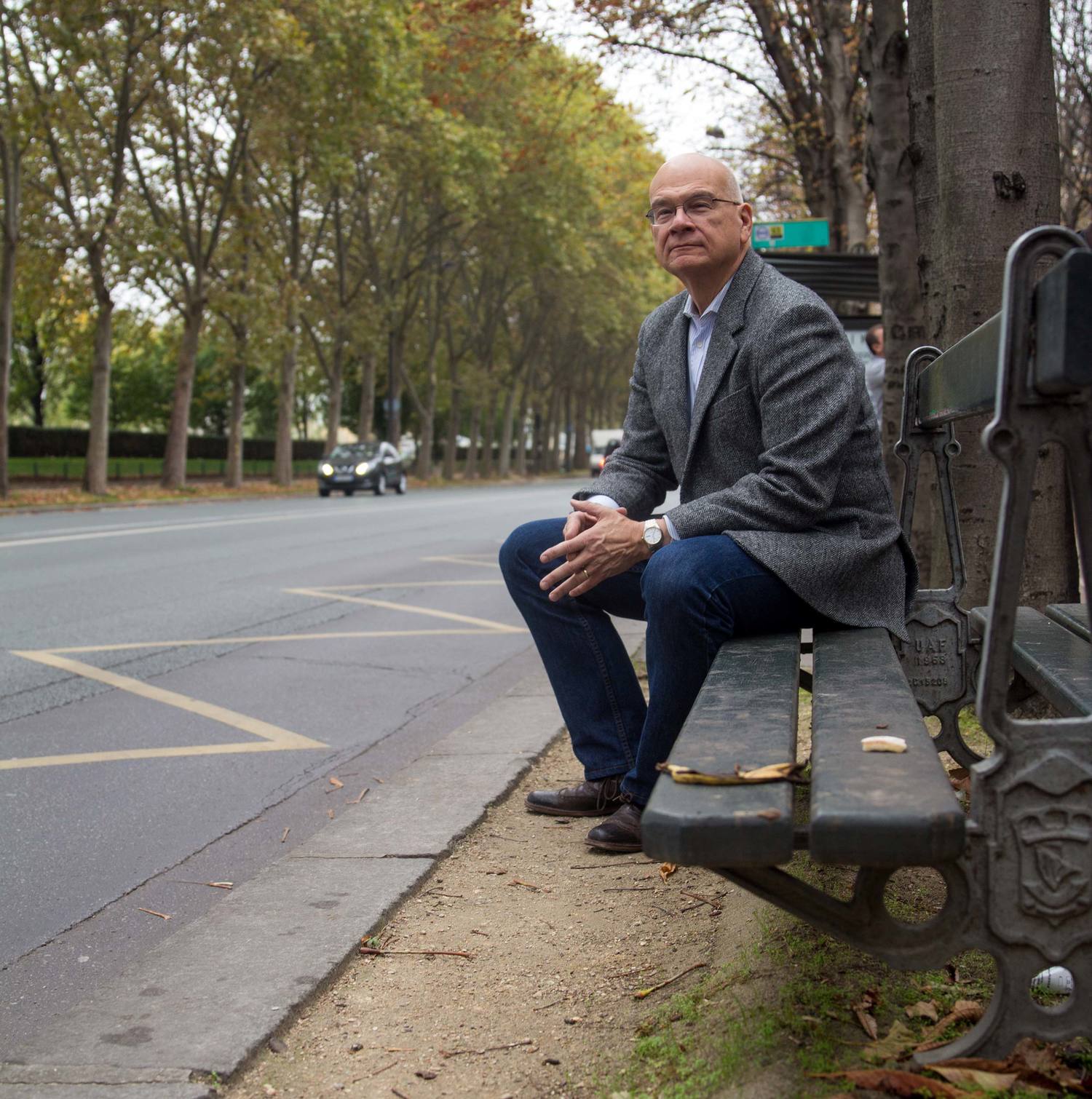
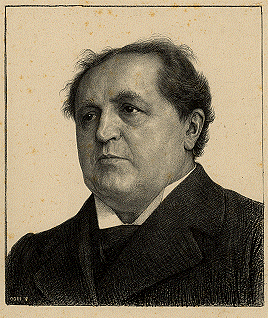
 No dualisms between the sacred and secular? All of life redeemed? We are culture-makers? Salvation means creation regained? The drama of Scripture is a four-chapter story, sometimes described as creation/fall/redemption/restoration? The integration of faith and scholarship? We must learn to see through the lens of a Christian worldview? You Are What You Love? These are all big picture slogans that carry transforming visions that have become increasingly embraced within evangelicalism, because, as religious historian George Marsden once quipped, “We are all Kuyperians now.” Whether we know it or not.
No dualisms between the sacred and secular? All of life redeemed? We are culture-makers? Salvation means creation regained? The drama of Scripture is a four-chapter story, sometimes described as creation/fall/redemption/restoration? The integration of faith and scholarship? We must learn to see through the lens of a Christian worldview? You Are What You Love? These are all big picture slogans that carry transforming visions that have become increasingly embraced within evangelicalism, because, as religious historian George Marsden once quipped, “We are all Kuyperians now.” Whether we know it or not. 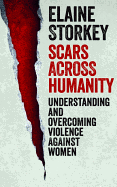
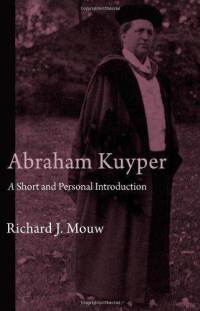 Abraham Kuyper: A Short and Personal Introduction Richard Mouw (Eerdmans) $16.00 Oh how I wish folks would order this from us. They use it at Redeemer’s Gotham Fellows program (I know because they order them from us) and it serves as an easy introduction to the main strengths of the hefty, Dutch public intellectual. And if anybody can help us see easily why this matters, it is the always interesting Rich Mouw. As noted above, Mouw himself was an Kuyper Center honoree, quite deservedly so.
Abraham Kuyper: A Short and Personal Introduction Richard Mouw (Eerdmans) $16.00 Oh how I wish folks would order this from us. They use it at Redeemer’s Gotham Fellows program (I know because they order them from us) and it serves as an easy introduction to the main strengths of the hefty, Dutch public intellectual. And if anybody can help us see easily why this matters, it is the always interesting Rich Mouw. As noted above, Mouw himself was an Kuyper Center honoree, quite deservedly so.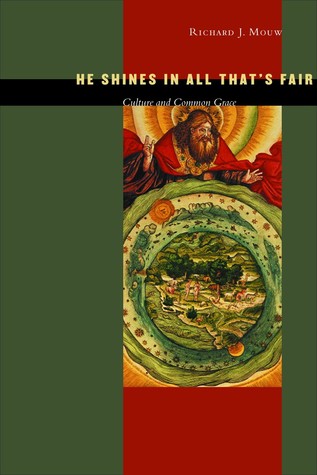 He Shines in All That’s Fair: Culture and Common Grace Richard Mouw (Eerdmans) $15.95 I think I tossed this off in passing in my review of Dreher’s Benedict Option book saying I’d love to hear him ruminate on these wild ideas of Kuyper as presented so nicely by Rich Mouw. Does God love jazz music, a good golf putt, the flight of a hawk? That is, are there seemingly secular or non-consequential and non-religious things that make up a good life that pleases God? And if so, does affirming those things and being active in those very things — playing, learning, art appreciation, making stuff — matter for eternity? Kuyper’s view of common grace does not negate the need for saving faith in Christ,but it does offer generative notions to sustain greater involvement in the world, building bridges with others who are made in God’s image, advancing a generally positive view of life in the world and our callings to be engaged well in culture. I have mentioned this book often, and think it should be better known among us.
He Shines in All That’s Fair: Culture and Common Grace Richard Mouw (Eerdmans) $15.95 I think I tossed this off in passing in my review of Dreher’s Benedict Option book saying I’d love to hear him ruminate on these wild ideas of Kuyper as presented so nicely by Rich Mouw. Does God love jazz music, a good golf putt, the flight of a hawk? That is, are there seemingly secular or non-consequential and non-religious things that make up a good life that pleases God? And if so, does affirming those things and being active in those very things — playing, learning, art appreciation, making stuff — matter for eternity? Kuyper’s view of common grace does not negate the need for saving faith in Christ,but it does offer generative notions to sustain greater involvement in the world, building bridges with others who are made in God’s image, advancing a generally positive view of life in the world and our callings to be engaged well in culture. I have mentioned this book often, and think it should be better known among us.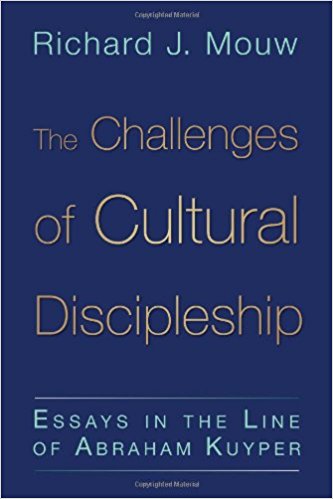 The Challenges of Cultural Discipleship: Essays in the Line of Abraham Kuyper Richard Mouw (Eerdmans) $20.00 This starts to get a bit deep, I must say; here are thirteen essays that are uniquely neo-Calvinist, evaluating and engaging some of the unique issues and theories that circle around the air of those in the heritage of Abraham Kuyper and his tribe. As it says in the promo copy: “In this volume Mouw provides the scholarly backstory to his popular books as he interprets, applies, expands on — and at times even corrects — Kuyper’s remarkable vision for faith and public life.” Pretty heavy stuff. Wow.
The Challenges of Cultural Discipleship: Essays in the Line of Abraham Kuyper Richard Mouw (Eerdmans) $20.00 This starts to get a bit deep, I must say; here are thirteen essays that are uniquely neo-Calvinist, evaluating and engaging some of the unique issues and theories that circle around the air of those in the heritage of Abraham Kuyper and his tribe. As it says in the promo copy: “In this volume Mouw provides the scholarly backstory to his popular books as he interprets, applies, expands on — and at times even corrects — Kuyper’s remarkable vision for faith and public life.” Pretty heavy stuff. Wow.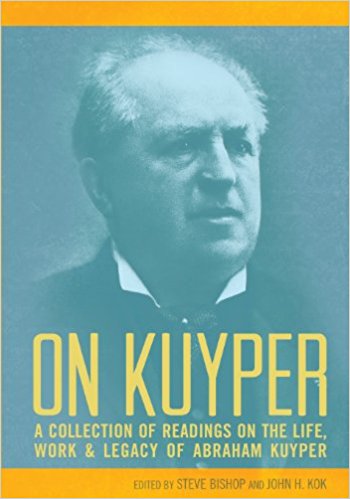 On Kuyper: A Collection of Readings on the Life, Work & Legacy of Abraham Kuyper edited by Steve Bishop and John H. Kok (Dordt College Press) $36.00 This. I mean it: this. This is a magisterial, unique, colorful, scholarly, flamboyant and at times nearly mind-boggling collection of very important pieces about Kuyper. It is slightly oversized and over 475 pages. Some are reprints from years ago, some are in print for the first time. They evaluate Kuyper and Kuyperian philosophy and explore the implications of his thought-system for (among other things) the church, culture, gender, politics, education, fashion, evolution, and more. There is discussion about the implications of common grace, sphere sovereignty, pluralism, all somehow giving tribute to this robust thinker who promoted the Lordship of Christ over all zones of life.
On Kuyper: A Collection of Readings on the Life, Work & Legacy of Abraham Kuyper edited by Steve Bishop and John H. Kok (Dordt College Press) $36.00 This. I mean it: this. This is a magisterial, unique, colorful, scholarly, flamboyant and at times nearly mind-boggling collection of very important pieces about Kuyper. It is slightly oversized and over 475 pages. Some are reprints from years ago, some are in print for the first time. They evaluate Kuyper and Kuyperian philosophy and explore the implications of his thought-system for (among other things) the church, culture, gender, politics, education, fashion, evolution, and more. There is discussion about the implications of common grace, sphere sovereignty, pluralism, all somehow giving tribute to this robust thinker who promoted the Lordship of Christ over all zones of life.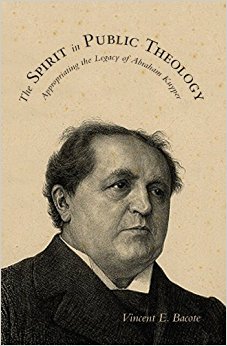 The Spirit in Public Theology: Appropriating the Legacy of Abraham Kuyper
The Spirit in Public Theology: Appropriating the Legacy of Abraham Kuyper 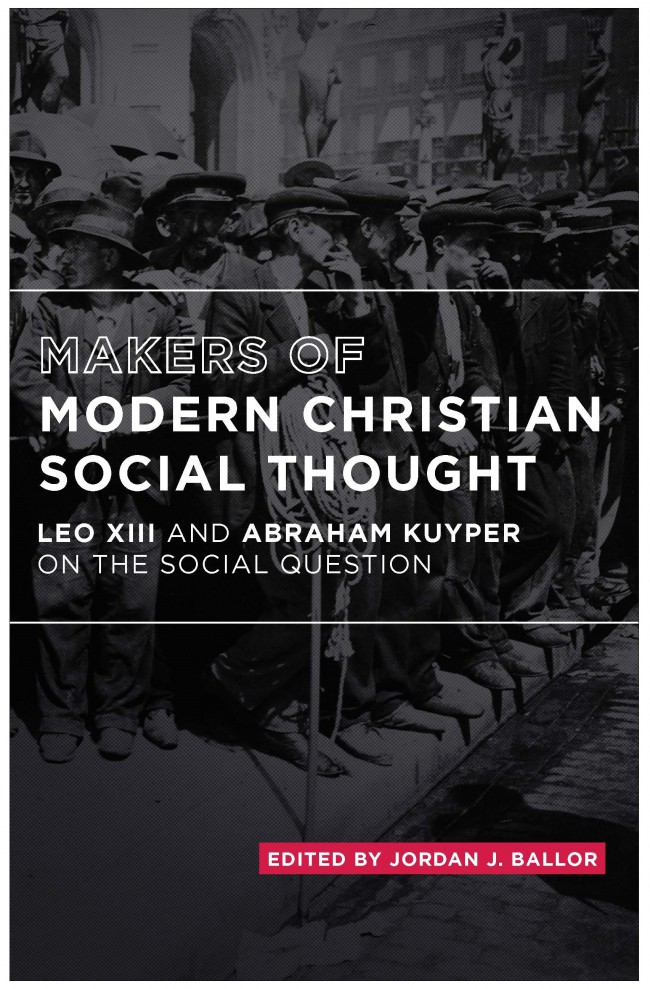 Makers of Modern Christian Social Thought: Leo XIII and Abraham Kuyper on the Social Question Jordon Ballor (Acton Institute for the Study of Religion and Liberty) $14.95 This is an extraordinary book, one that covers a topic some of us have alluded to for years — namely, that there is much overlap between Pope Leo XIII and Kuyper. Leo’s pivotal social encyclical Rerum Novarum and Kuyper’s dramatic speech, published in English as Christianity and the Class Struggle and, later, as The Problem of Poverty) are both very, very important and we are indebted to the always brilliant Jordan Ballor for doing this good work, comparing and contrasting these two somewhat connected social justice traditions.
Makers of Modern Christian Social Thought: Leo XIII and Abraham Kuyper on the Social Question Jordon Ballor (Acton Institute for the Study of Religion and Liberty) $14.95 This is an extraordinary book, one that covers a topic some of us have alluded to for years — namely, that there is much overlap between Pope Leo XIII and Kuyper. Leo’s pivotal social encyclical Rerum Novarum and Kuyper’s dramatic speech, published in English as Christianity and the Class Struggle and, later, as The Problem of Poverty) are both very, very important and we are indebted to the always brilliant Jordan Ballor for doing this good work, comparing and contrasting these two somewhat connected social justice traditions.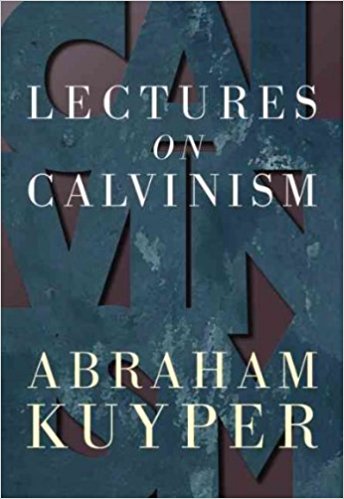 Lectures on Calvinism Abraham Kuyper (Eerdmans) $18.00 This is the book that first introduced me to Kuyper and it is dry and complex, written in the style of public addresses at Princeton at the turn of the 19th century into the 20th. These were given in 1898 as the “Stone Lectures” and the rocked the world, changing much about Presbyterianism, lasting even to today. Alas they are not thrilling for most readers. These lectures explore the notion that God is sovereign, and therefore, we should honor Christ as King over all of life — the English translation renders the first chapter “Christianity as a Life System.” He specifically looks at science, the arts, commerce, and education and the future — and hearing about it was life-changing for me. His complex lectures never turned me on, but the idea that religion is an all-encompassing world-and-life view and that Calvinism’s importance is therefore more than theological debates about predestination, but about God’s rulership over all creation, still resonates today.
Lectures on Calvinism Abraham Kuyper (Eerdmans) $18.00 This is the book that first introduced me to Kuyper and it is dry and complex, written in the style of public addresses at Princeton at the turn of the 19th century into the 20th. These were given in 1898 as the “Stone Lectures” and the rocked the world, changing much about Presbyterianism, lasting even to today. Alas they are not thrilling for most readers. These lectures explore the notion that God is sovereign, and therefore, we should honor Christ as King over all of life — the English translation renders the first chapter “Christianity as a Life System.” He specifically looks at science, the arts, commerce, and education and the future — and hearing about it was life-changing for me. His complex lectures never turned me on, but the idea that religion is an all-encompassing world-and-life view and that Calvinism’s importance is therefore more than theological debates about predestination, but about God’s rulership over all creation, still resonates today.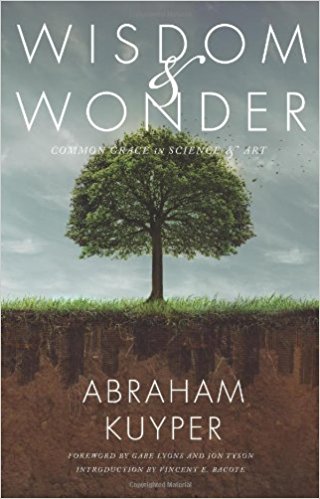 Wisdom & Wonder: Common Grace in Science & Art Abraham Kuyper (Christian’s Library Press) $14.99 We were one of the first places to review this when it first came out a few years back and we still enjoy telling folks about it — and pointing out the very cool cover. This is a good way into Kuyper’s own writings on common grace, on how to address issues of the arts and sciences. Edited by Jordan Ballor and Stephen Grabill (yes, the guy in For the Life of the World) Wisdom & Wonder includes a foreword by Q founder Gabe Lyons and a great introduction by Wheaton College political theologian, Vincent Bacote.
Wisdom & Wonder: Common Grace in Science & Art Abraham Kuyper (Christian’s Library Press) $14.99 We were one of the first places to review this when it first came out a few years back and we still enjoy telling folks about it — and pointing out the very cool cover. This is a good way into Kuyper’s own writings on common grace, on how to address issues of the arts and sciences. Edited by Jordan Ballor and Stephen Grabill (yes, the guy in For the Life of the World) Wisdom & Wonder includes a foreword by Q founder Gabe Lyons and a great introduction by Wheaton College political theologian, Vincent Bacote.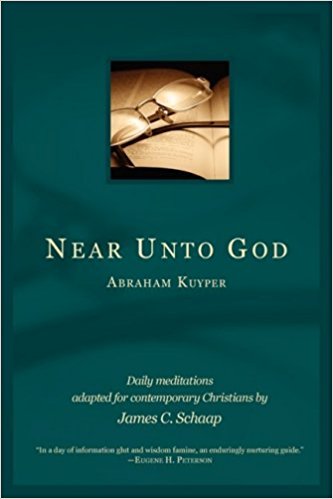 Near Unto God Abraham Kuyper (Dordt College Press) $17.00 This is a slightly modernized (by novelist James Schaap) and somewhat abridged edition of Kuyper’s beloved devotional based on the phrase from Psalm 73:28. I was moved and inspired by RIchard Mouw’s introduction, explaining how this deeply spiritual piety motivated not only the public activism and myriad of reforms of the busy Kuyper but of generations of Dutch Christian leaders in the 20th century.
Near Unto God Abraham Kuyper (Dordt College Press) $17.00 This is a slightly modernized (by novelist James Schaap) and somewhat abridged edition of Kuyper’s beloved devotional based on the phrase from Psalm 73:28. I was moved and inspired by RIchard Mouw’s introduction, explaining how this deeply spiritual piety motivated not only the public activism and myriad of reforms of the busy Kuyper but of generations of Dutch Christian leaders in the 20th century.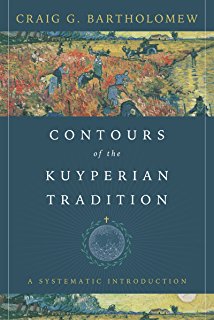 PRE-ORDER Contours of the Kuyperian Tradition: A Systematic Introduction Craig C. Bartholomew (IVP Academic) $40.00 I have been itching to see this since I heard about it a while ago, and I’ve not yet seen any of the manuscript. I can tell you this much: it is going to be academically sound and yet exciting. And important. When the publisher says Kuyper is “much discussed but little read” I think they are right, and there are reasons for that. Not unlike other great writers of the past, delving into older ways of writing is hard even for some scholars. We need a guide. We need some assistance. We need a teacher to tell us about it all. Philosopher, theologian, artist, farmer from South Africa, we have our guide here in Mr. Bartholomew. I cannot wait for this and suspect it is going to be a blessing to many. Agree or disagree with Kuyper — and some view him as too conservative and totalizing, and some view him as too liberal and pluralizing — this will be the indispensable resource to help us understand his importance, his legacy, and how many are working out his faith-based vision for just and healing multi-dimensional societal reform today in our own time and place. I’m hoping many are glad to hear about it, and will send us an order. It is due out in mid April, 2017 and we will be among the very first to have it, I’m sure.
PRE-ORDER Contours of the Kuyperian Tradition: A Systematic Introduction Craig C. Bartholomew (IVP Academic) $40.00 I have been itching to see this since I heard about it a while ago, and I’ve not yet seen any of the manuscript. I can tell you this much: it is going to be academically sound and yet exciting. And important. When the publisher says Kuyper is “much discussed but little read” I think they are right, and there are reasons for that. Not unlike other great writers of the past, delving into older ways of writing is hard even for some scholars. We need a guide. We need some assistance. We need a teacher to tell us about it all. Philosopher, theologian, artist, farmer from South Africa, we have our guide here in Mr. Bartholomew. I cannot wait for this and suspect it is going to be a blessing to many. Agree or disagree with Kuyper — and some view him as too conservative and totalizing, and some view him as too liberal and pluralizing — this will be the indispensable resource to help us understand his importance, his legacy, and how many are working out his faith-based vision for just and healing multi-dimensional societal reform today in our own time and place. I’m hoping many are glad to hear about it, and will send us an order. It is due out in mid April, 2017 and we will be among the very first to have it, I’m sure.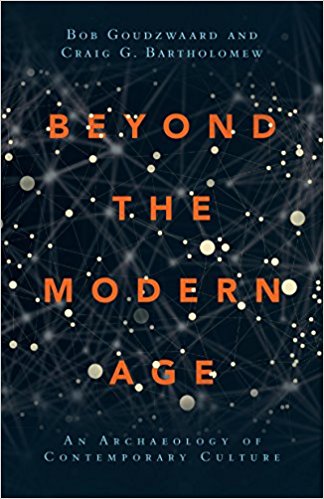
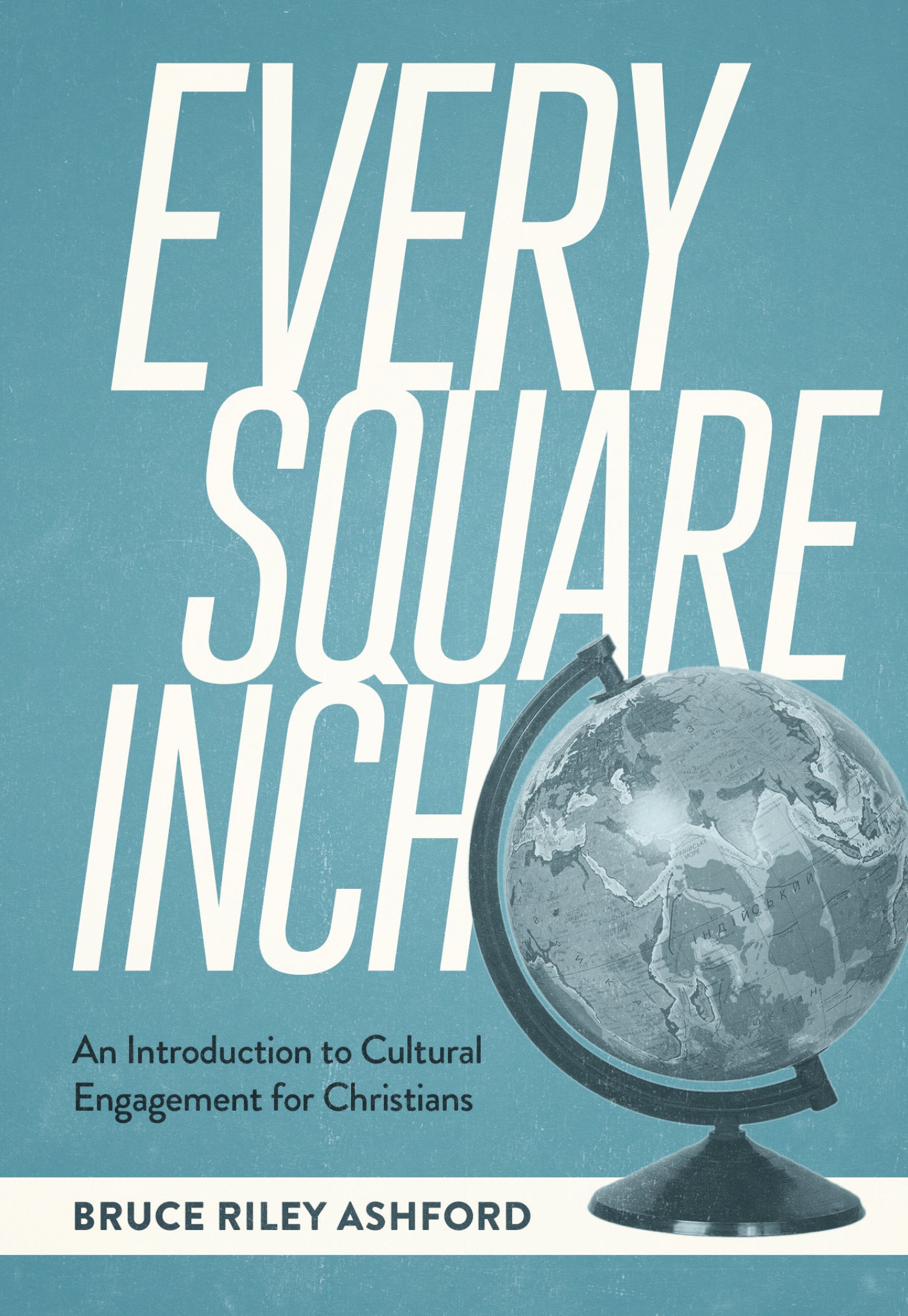 Every Square Inch: An Introduction to Cultural Engagement for Christians (Lexham Press) $14.99 Okay, this little hardback isn’t exactly a bio of Kuyper, or even about him, exactly, but his Dutch fingerprints are all over it. It looks at what contemporary neo-Calvinists in the line of Kuyper are thinking about culture, about engagement with the world from a radically Christian life perspective, and how to relate faith and public life in principled but gracious ways. It tends a bit conservative at times and some readers will not agree with it all, but it captures much about what is going on it this stream of renewal within both Reformed and, interestingly, some Southern Baptist circles. A nice little read, good to know about and helpful for beginners.
Every Square Inch: An Introduction to Cultural Engagement for Christians (Lexham Press) $14.99 Okay, this little hardback isn’t exactly a bio of Kuyper, or even about him, exactly, but his Dutch fingerprints are all over it. It looks at what contemporary neo-Calvinists in the line of Kuyper are thinking about culture, about engagement with the world from a radically Christian life perspective, and how to relate faith and public life in principled but gracious ways. It tends a bit conservative at times and some readers will not agree with it all, but it captures much about what is going on it this stream of renewal within both Reformed and, interestingly, some Southern Baptist circles. A nice little read, good to know about and helpful for beginners.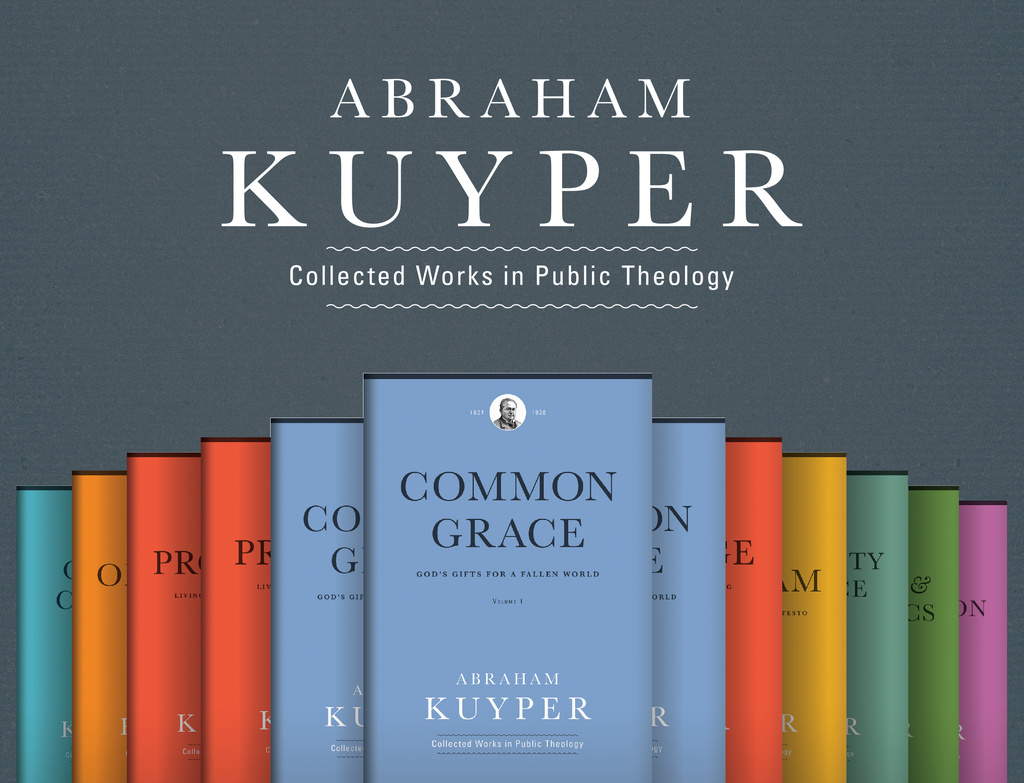

 and various studies from the gospels are all thoughtful, insightful, and very helpful. Many pastors find them very useful in preparing their own studies and sermons although they are not exceedingly scholarly and any thoughtful reader can take them up. From his recent devotional (written with his wife,
and various studies from the gospels are all thoughtful, insightful, and very helpful. Many pastors find them very useful in preparing their own studies and sermons although they are not exceedingly scholarly and any thoughtful reader can take them up. From his recent devotional (written with his wife, 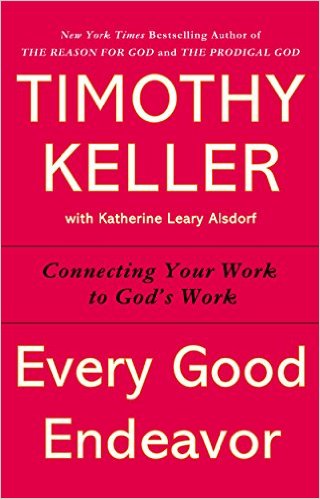 Kathy Keller) on the Psalms (The Songs of Jesus) to his excellent book co-authored with former corporate exec, Katherine Leary Alsdorf, Every Good Endeavor: Connecting Your Work to God’s Work, to the older, but still very popular short take on the misunderstood Prodigal Son story, The Prodigal God: Recovering the Heart of Christian Faith, Keller
Kathy Keller) on the Psalms (The Songs of Jesus) to his excellent book co-authored with former corporate exec, Katherine Leary Alsdorf, Every Good Endeavor: Connecting Your Work to God’s Work, to the older, but still very popular short take on the misunderstood Prodigal Son story, The Prodigal God: Recovering the Heart of Christian Faith, Keller 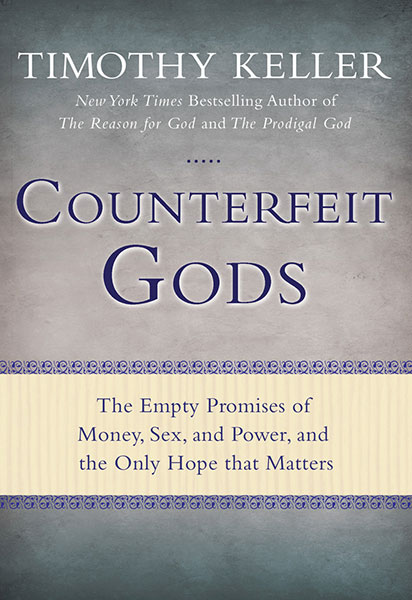 has a way with words that are lucid and often thought-provoking. His Counterfeit Gods: The Empty Promises of Money, Sex, and Power, and the Only Hope That Matters is a very serious critique of modern idols; oh, if other evangelical (or progressive) thinkers were so incisive and so clear and so gospel-centered.
has a way with words that are lucid and often thought-provoking. His Counterfeit Gods: The Empty Promises of Money, Sex, and Power, and the Only Hope That Matters is a very serious critique of modern idols; oh, if other evangelical (or progressive) thinkers were so incisive and so clear and so gospel-centered.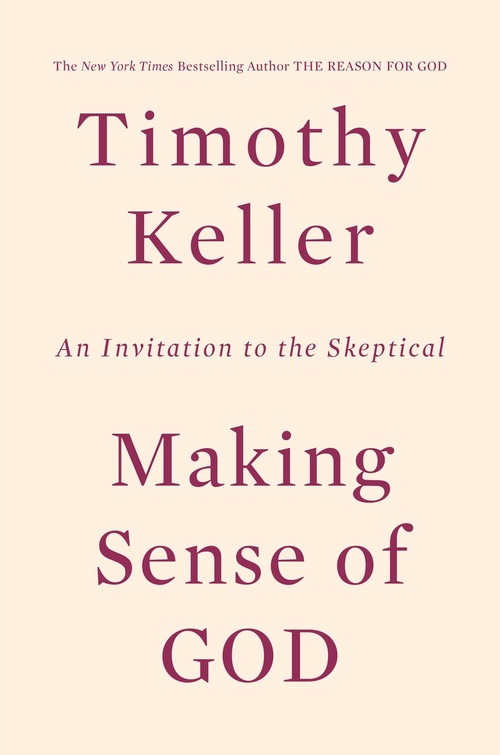

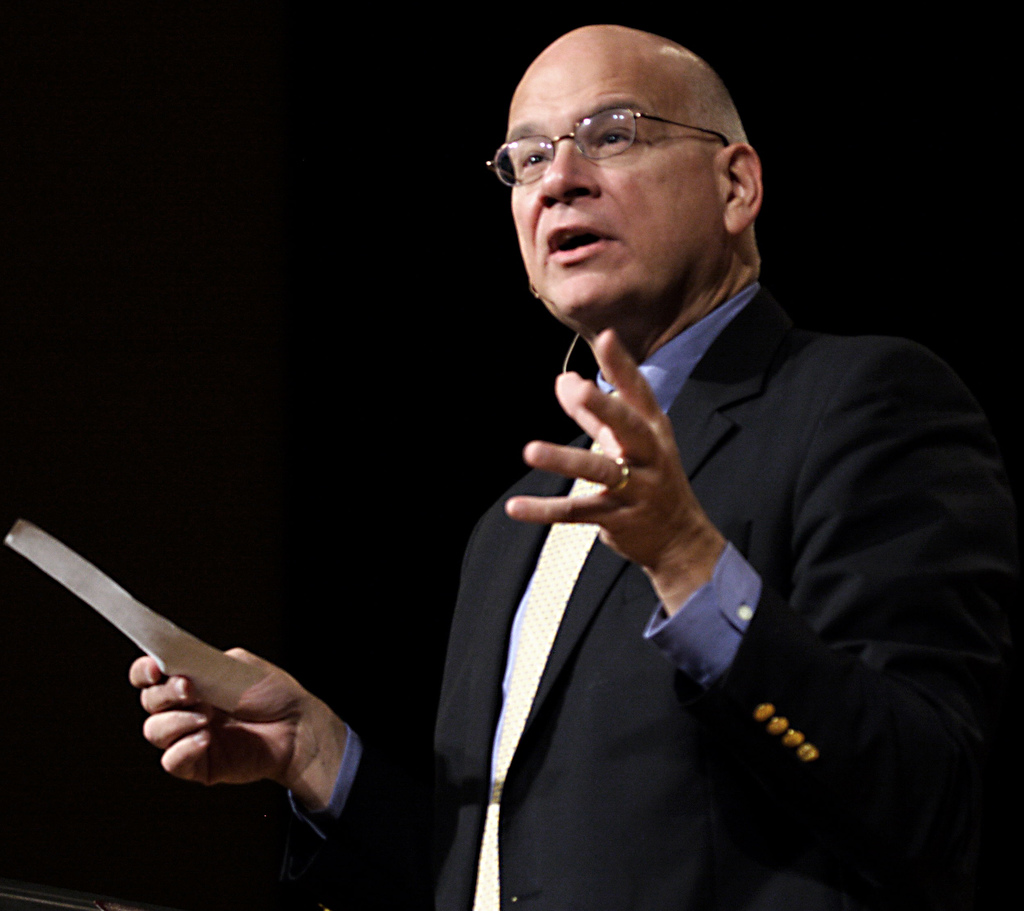
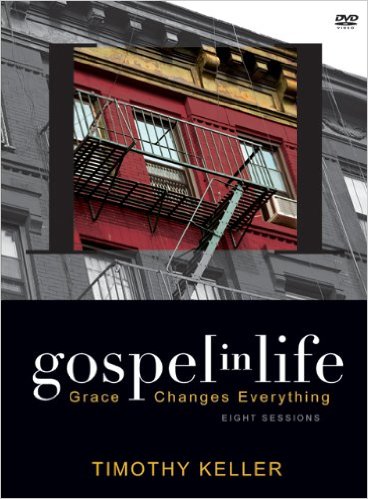 Gospel in Life: Grace Changes Everything (DVD and study book) Timothy Keller (Zondervan) $36.99 This is a classy DVD curriculum that offers eight fairly brief mini-lectures by Keller coupled with a very thorough (230 page) workbook for participants to process the information. In some cases, some DVD participant’s guides aren’t always necessary but in this case, the Gospel In Life workbook is an amazing resource and each participant must have one, as it includes much of the content of the course, lots of discussion stuff, a narrative from Keller, and more. (Extra Participant’s Guides sell for $12.99 each without the DVD.)
Gospel in Life: Grace Changes Everything (DVD and study book) Timothy Keller (Zondervan) $36.99 This is a classy DVD curriculum that offers eight fairly brief mini-lectures by Keller coupled with a very thorough (230 page) workbook for participants to process the information. In some cases, some DVD participant’s guides aren’t always necessary but in this case, the Gospel In Life workbook is an amazing resource and each participant must have one, as it includes much of the content of the course, lots of discussion stuff, a narrative from Keller, and more. (Extra Participant’s Guides sell for $12.99 each without the DVD.)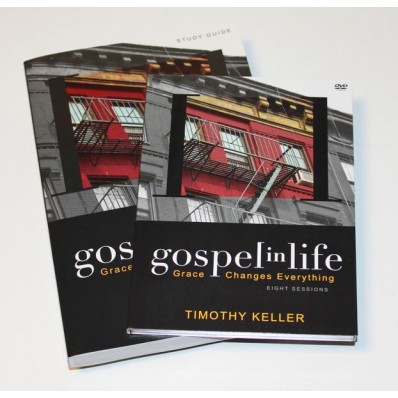

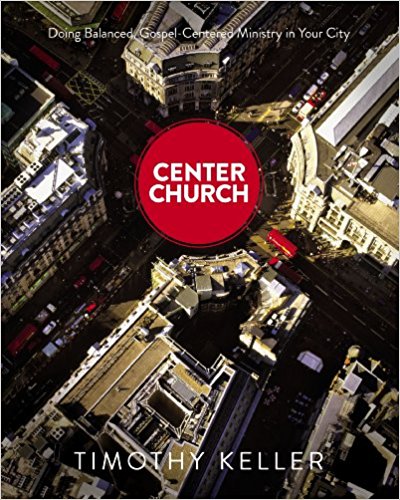 Center Church: Doing Balanced, Gospel-Centered Ministry in Your City Timothy Keller (Zondervan) $34.99 In the Fall of 2012 Keller, surely with good help from his innovative, missional team, released a major work, this big Center Church textbook-like volume. We named it one of the Books of the Year that year and we told many — even folks in smaller towns and in smaller churches — that his emphasis on a “gospel-centered” ministry that was balanced and informed by the first things of the gospel was profound and needed.
Center Church: Doing Balanced, Gospel-Centered Ministry in Your City Timothy Keller (Zondervan) $34.99 In the Fall of 2012 Keller, surely with good help from his innovative, missional team, released a major work, this big Center Church textbook-like volume. We named it one of the Books of the Year that year and we told many — even folks in smaller towns and in smaller churches — that his emphasis on a “gospel-centered” ministry that was balanced and informed by the first things of the gospel was profound and needed.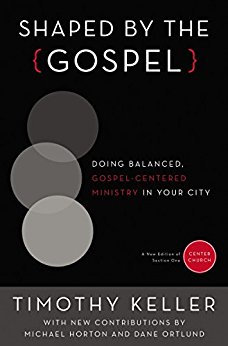 Shaped by the Gospel: Doing Balanced, Gospel-Centered Ministry in Your City Timothy Keller, with new chapters by Michael Horton and Dane Calvin Ortlund (Zondervan) $15.99
Shaped by the Gospel: Doing Balanced, Gospel-Centered Ministry in Your City Timothy Keller, with new chapters by Michael Horton and Dane Calvin Ortlund (Zondervan) $15.99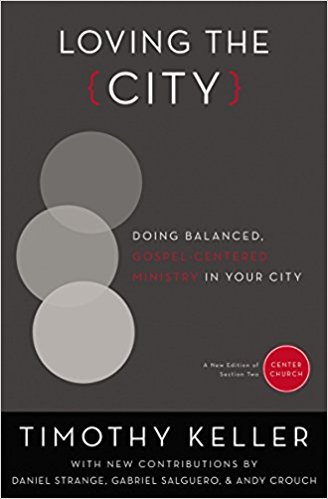 Loving the City: Doing Balanced, Gospel-Centered Ministry in Your City Timothy Keller, with new chapters by Daniel Strange, Gabriel Salguero, and Andy Crouch (Zondervan) $18.99
Loving the City: Doing Balanced, Gospel-Centered Ministry in Your City Timothy Keller, with new chapters by Daniel Strange, Gabriel Salguero, and Andy Crouch (Zondervan) $18.99 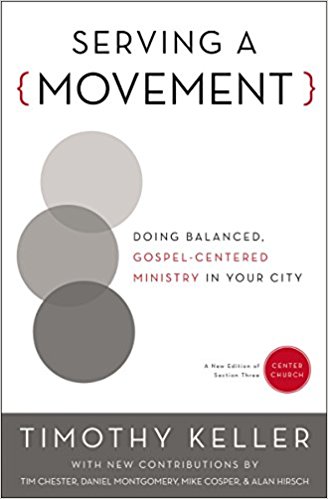 Serving a Movement: Doing Balanced, Gospel-Centered Ministry in Your City Timothy Keller, with new chapters by Tim Chester, Daniel Montgomery, Mike Cosper and Alan Hirsch (Zondervan) $18.99
Serving a Movement: Doing Balanced, Gospel-Centered Ministry in Your City Timothy Keller, with new chapters by Tim Chester, Daniel Montgomery, Mike Cosper and Alan Hirsch (Zondervan) $18.99
 (monastic or otherwise) after having read any of Guinness’s extraordinary books, not least, The Call or Garber’s eloquent, must-read Visions of Vocation or the recent Culture Care by Makoto Fujimura or Kingdom Callings about “vocational stewardship” by Amy Sherman or any number of books that teach about the non-negotiable cultural mandate to be involved for the common good and reflect God’s goodness into the world, needy as it is. It may be out there on the internets somewhere, but I’d love to read Rod’s review of Andy Crouch’s Culture Making or, for that matter, Niebuhr’s old classic Christ and Culture. I know there is some debate among the truly Reformed about Kuyper’s notions of “common grace” but Mouw’s He Shines In All That Fair is a book about which I’d love to hear Dreher comment. And there’s that brand new “theology of culture” book by jazzman Bill Edgar, Created and Creating. I could go on.
(monastic or otherwise) after having read any of Guinness’s extraordinary books, not least, The Call or Garber’s eloquent, must-read Visions of Vocation or the recent Culture Care by Makoto Fujimura or Kingdom Callings about “vocational stewardship” by Amy Sherman or any number of books that teach about the non-negotiable cultural mandate to be involved for the common good and reflect God’s goodness into the world, needy as it is. It may be out there on the internets somewhere, but I’d love to read Rod’s review of Andy Crouch’s Culture Making or, for that matter, Niebuhr’s old classic Christ and Culture. I know there is some debate among the truly Reformed about Kuyper’s notions of “common grace” but Mouw’s He Shines In All That Fair is a book about which I’d love to hear Dreher comment. And there’s that brand new “theology of culture” book by jazzman Bill Edgar, Created and Creating. I could go on.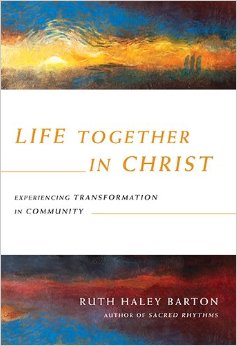
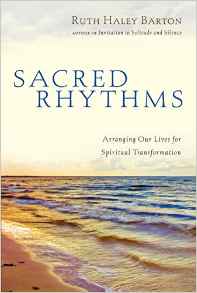 If any of this speaks to you but you’ve not read anything along these lines, I suggest you might start with Sacred Rhythms: Arranging our Lives for Spiritual Transformation by Ruth Haley Barton (IVP; $19.00) and her great book about doing these classic practices in community, with others, Life Together in Christ: Experiencing Transformation in Community (IVP; $18.00.) Or, somewhat deeper, the true classic Celebration of Discipline: The Path to Spiritual Growth by Richard J. Foster (HarperSanFrancisco; $25.99.) Perhaps you could use the marvelously rich and very helpfully arranged and annotated books by Foster Spiritual Classics and/or Devotional Classics (both published by Harper; $17.99 each.) All of these are influenced, naturally, by Benedict, but none are exclusively Benedictine.
If any of this speaks to you but you’ve not read anything along these lines, I suggest you might start with Sacred Rhythms: Arranging our Lives for Spiritual Transformation by Ruth Haley Barton (IVP; $19.00) and her great book about doing these classic practices in community, with others, Life Together in Christ: Experiencing Transformation in Community (IVP; $18.00.) Or, somewhat deeper, the true classic Celebration of Discipline: The Path to Spiritual Growth by Richard J. Foster (HarperSanFrancisco; $25.99.) Perhaps you could use the marvelously rich and very helpfully arranged and annotated books by Foster Spiritual Classics and/or Devotional Classics (both published by Harper; $17.99 each.) All of these are influenced, naturally, by Benedict, but none are exclusively Benedictine. 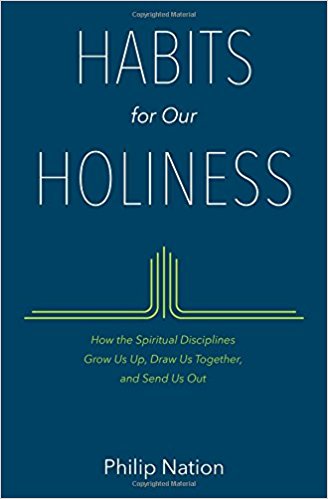
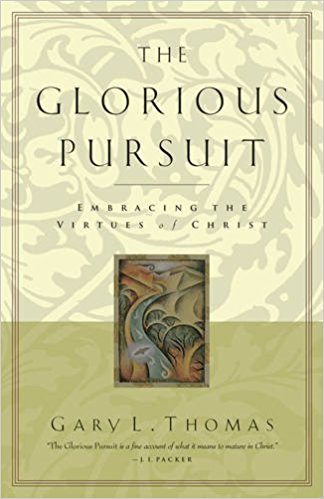 or
or 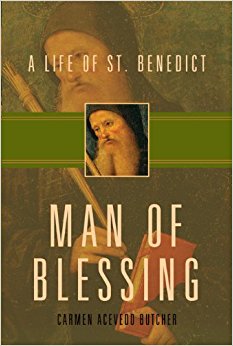 Man of Blessing: A Life of St. Benedict Carmen Acevedo Butcher (Paraclete Press) $21.95 Although not out of print, we have a few of these stellar biographies still in stock. Phyllis Tickle wrote, “Here medievalist Butcher revives the craft of hagiography, but with a twist. Her affection for her subject is as appealing as it is unfailing, but in this gentle retelling of Benedict’s life, it is Butcher’s familiarity with late Roman literature and culture that roots the saint and his miracles in a well-defined time and place.” There was a sixth-century volume called Dialogues about Benedict written by Pope Gregory the Great and this book draws on that, making it an important historical work.
Man of Blessing: A Life of St. Benedict Carmen Acevedo Butcher (Paraclete Press) $21.95 Although not out of print, we have a few of these stellar biographies still in stock. Phyllis Tickle wrote, “Here medievalist Butcher revives the craft of hagiography, but with a twist. Her affection for her subject is as appealing as it is unfailing, but in this gentle retelling of Benedict’s life, it is Butcher’s familiarity with late Roman literature and culture that roots the saint and his miracles in a well-defined time and place.” There was a sixth-century volume called Dialogues about Benedict written by Pope Gregory the Great and this book draws on that, making it an important historical work.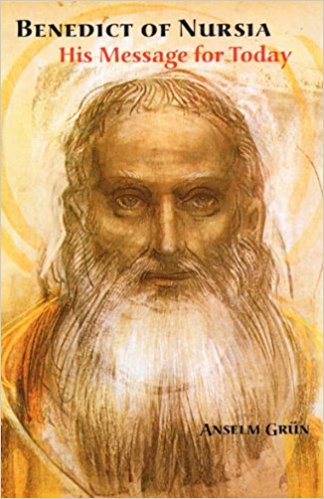 Benedict of Nursia: His Message for Today Anselm Grun (Liturgical Press) $12.95 This is a serious but slim book by one of the great European spiritual writers these days; we carry a number of books, including a few children’s books. This is partially an introductory biography and also a bit of a cultural study suggesting why Benedict’s message resonates so today. He is, by the way, a cellarer, or supplies manager, for his monastery in Germany, so knows much about work, administration, and the like. Maybe he might remind you of Brother Lawrence and his situation, finding God in the kitchen and insisting the pots and pans are holy.
Benedict of Nursia: His Message for Today Anselm Grun (Liturgical Press) $12.95 This is a serious but slim book by one of the great European spiritual writers these days; we carry a number of books, including a few children’s books. This is partially an introductory biography and also a bit of a cultural study suggesting why Benedict’s message resonates so today. He is, by the way, a cellarer, or supplies manager, for his monastery in Germany, so knows much about work, administration, and the like. Maybe he might remind you of Brother Lawrence and his situation, finding God in the kitchen and insisting the pots and pans are holy.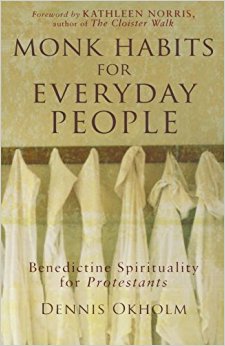 Monk Habits for Everyday People: Benedictine Spirituality for Protestants Dennis Okholm (Brazos Press) $16.00 I am assuming that many who read Rod Dreher’s The Benedict Option
Monk Habits for Everyday People: Benedictine Spirituality for Protestants Dennis Okholm (Brazos Press) $16.00 I am assuming that many who read Rod Dreher’s The Benedict Option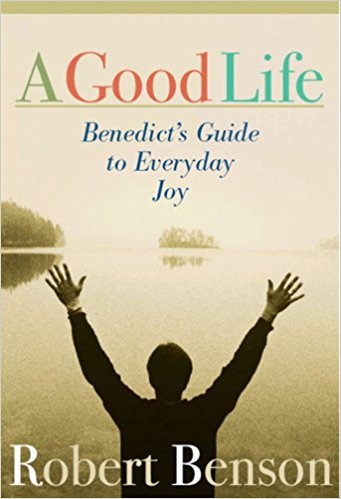 A Good Life: Benedict’s Guide to Everyday Joy Robert
A Good Life: Benedict’s Guide to Everyday Joy Robert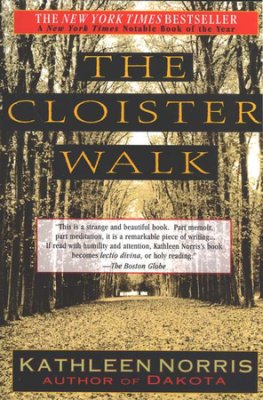 The Cloister Walk Kathleen Norris (Riverhead Books) $16.00 One of the most popular spiritual writers of recent decades, her spiritual memoir, Dakota, capitulated her to fame within mainline denominational circles, especially, but this story of a Presbyterian’s extended stays at a Benedictine monastery is perhaps her best known book. Here, she walks us through what it was like for her, with meditations on the Rule, of course, luminous reflections on the bigger picture of liturgical calendar, but also the ordinary stuff – the monk’s jokes, the food, the sense of time as one is immersed in this alternative world, her love for the liturgy. The Chicago Tribune’s review said, “Norris continues to write plainspoken meditations that expand the purview of non-fiction… She writes about religion with the imagination of a poet…” It is a good read for those who like spiritual autobiography and creative nonfiction, and it’s a very good window into the real world life of a Minnesota Benedictine monastery.
The Cloister Walk Kathleen Norris (Riverhead Books) $16.00 One of the most popular spiritual writers of recent decades, her spiritual memoir, Dakota, capitulated her to fame within mainline denominational circles, especially, but this story of a Presbyterian’s extended stays at a Benedictine monastery is perhaps her best known book. Here, she walks us through what it was like for her, with meditations on the Rule, of course, luminous reflections on the bigger picture of liturgical calendar, but also the ordinary stuff – the monk’s jokes, the food, the sense of time as one is immersed in this alternative world, her love for the liturgy. The Chicago Tribune’s review said, “Norris continues to write plainspoken meditations that expand the purview of non-fiction… She writes about religion with the imagination of a poet…” It is a good read for those who like spiritual autobiography and creative nonfiction, and it’s a very good window into the real world life of a Minnesota Benedictine monastery. Wisdom Distilled from the Daily: Living the Rule of St. Benedict Today Joan Chittister (HarperOne) $13.00 Sister Joan is a member and former prioress of the Benedictine Sisters of Erie, and the founder of Benetvision, a resource center for contemplative spirituality, often applied to her passions of peacemaking, creation care and social justice. This is the first book I ever read about Benedictine and I highly recommend it. It carries endorsements from Eugene Peterson (who calls it “a lengthy, wisdom-filled conversation”) Written in 1990 it remains a staple. Robert McAfee Brown wrote “anyone who thinks monasticism means turning away from the world needs this book.” Franciscan Richard Rohr wrote that it “makes me want to be a Benedictine.”
Wisdom Distilled from the Daily: Living the Rule of St. Benedict Today Joan Chittister (HarperOne) $13.00 Sister Joan is a member and former prioress of the Benedictine Sisters of Erie, and the founder of Benetvision, a resource center for contemplative spirituality, often applied to her passions of peacemaking, creation care and social justice. This is the first book I ever read about Benedictine and I highly recommend it. It carries endorsements from Eugene Peterson (who calls it “a lengthy, wisdom-filled conversation”) Written in 1990 it remains a staple. Robert McAfee Brown wrote “anyone who thinks monasticism means turning away from the world needs this book.” Franciscan Richard Rohr wrote that it “makes me want to be a Benedictine.” 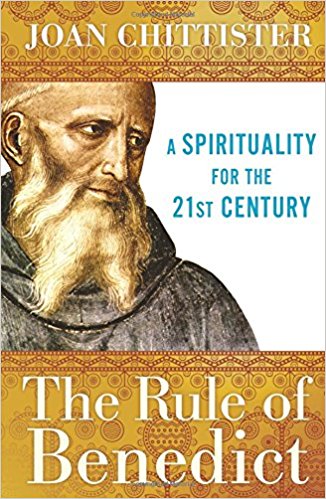 The Rule of Benedict: A Spirituality for the 21
The Rule of Benedict: A Spirituality for the 21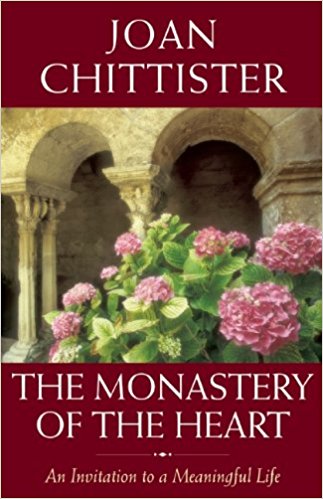 The Monastery of the Heart: An Invitation to a Meaningful Life Joan Chittister (BlueBridge) $13.95 This book is mostly written as loose, poetic reflections and will appeal to those who want a gentle, spiritual reflection. Again, the late Phyllis Tickle wrote, “This marvel of a book sings in the heart and makes the mind quiet with reverence, even as it instructs both with a holy gladness.” Sister Joan has written bunches of books and in this one she poetically reminds us of the central truth that our search for a meaningful life must be connected to this life, our daily life. She evokes Benedict’s Rule as she ruminates on our search, our interior life, our community, our service, our promise, and our spiritual growth.
The Monastery of the Heart: An Invitation to a Meaningful Life Joan Chittister (BlueBridge) $13.95 This book is mostly written as loose, poetic reflections and will appeal to those who want a gentle, spiritual reflection. Again, the late Phyllis Tickle wrote, “This marvel of a book sings in the heart and makes the mind quiet with reverence, even as it instructs both with a holy gladness.” Sister Joan has written bunches of books and in this one she poetically reminds us of the central truth that our search for a meaningful life must be connected to this life, our daily life. She evokes Benedict’s Rule as she ruminates on our search, our interior life, our community, our service, our promise, and our spiritual growth.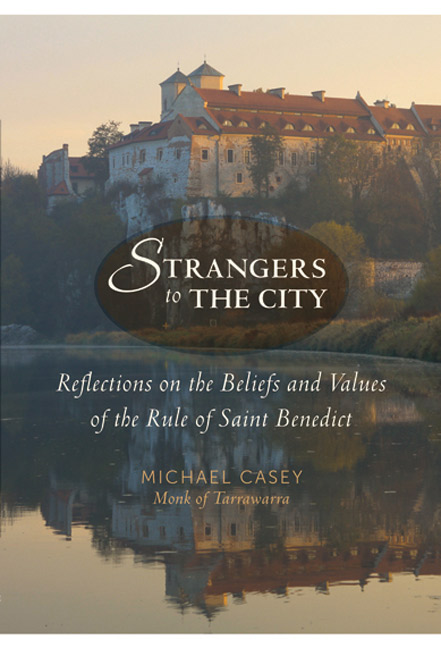 Strangers to the City: Reflections on the Beliefs and Values of the Rule of Saint Benedict Michael Casey (Paraclete Press) $15.95 Casey is a Cistercian Monk of Tarrawarra (in Australia) and has written here an eloquent and incisive overview of the distinctive path of St. Benedict. Casey is one of the leading experts on monastic spirituality (and we have stocked other books of his for years.) This includes thoughtful reflections on the values of asceticism, silence, leisure, reading, chastity, and poverty, “placing each of these ancient beliefs in a vibrant, contemporary context.” This is part of the publisher’s “Voice From the Monastery Series” and it is truly excellent.
Strangers to the City: Reflections on the Beliefs and Values of the Rule of Saint Benedict Michael Casey (Paraclete Press) $15.95 Casey is a Cistercian Monk of Tarrawarra (in Australia) and has written here an eloquent and incisive overview of the distinctive path of St. Benedict. Casey is one of the leading experts on monastic spirituality (and we have stocked other books of his for years.) This includes thoughtful reflections on the values of asceticism, silence, leisure, reading, chastity, and poverty, “placing each of these ancient beliefs in a vibrant, contemporary context.” This is part of the publisher’s “Voice From the Monastery Series” and it is truly excellent.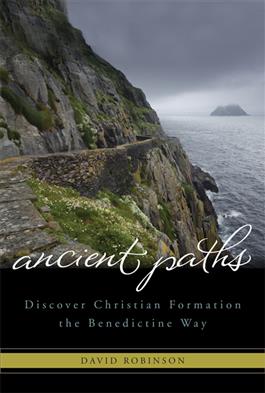 Ancient Paths: Discover Christian Formation the Benediction Way David Robinson (Paraclete Press) $16.99 I reviewed this wonderful book when it first came out, saying it was the best book on Benedict that I ever read. Robinson has advanced theological degrees from Fuller and is a Presbyterian pastor in Oregon. He is a Benedictine oblate of Mount Angel Abbey. Maybe it is Presbyterian impulses, but he helps everyone apply Benedict’s spirituality in their own setting.
Ancient Paths: Discover Christian Formation the Benediction Way David Robinson (Paraclete Press) $16.99 I reviewed this wonderful book when it first came out, saying it was the best book on Benedict that I ever read. Robinson has advanced theological degrees from Fuller and is a Presbyterian pastor in Oregon. He is a Benedictine oblate of Mount Angel Abbey. Maybe it is Presbyterian impulses, but he helps everyone apply Benedict’s spirituality in their own setting.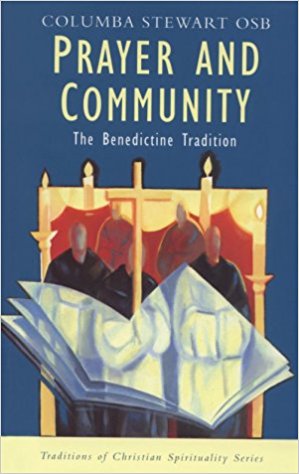 Prayer and Community: The Benedictine Tradition Columba Stewart, OSB (Orbis Press) $18.00 Orbis Press has done a remarkable job offering a major set of books that summarize, clarify, and teach about various religious traditions within the big Body of Christ. From Pentecostals to Quakers, Cistercians to Anglicans, Reformed to Salesian, Wesleyan to Franciscan,
Prayer and Community: The Benedictine Tradition Columba Stewart, OSB (Orbis Press) $18.00 Orbis Press has done a remarkable job offering a major set of books that summarize, clarify, and teach about various religious traditions within the big Body of Christ. From Pentecostals to Quakers, Cistercians to Anglicans, Reformed to Salesian, Wesleyan to Franciscan, 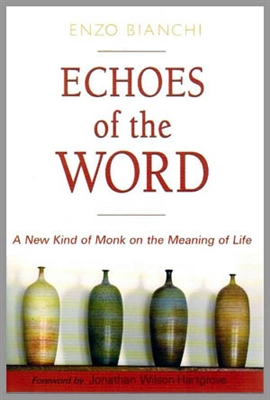 Echoes of the Word: A New Kind of Monk on the Meaning of Life Enzo Bianchi (Paraclete Press) $15.99 Enzo Bianchi was a young Catholic layperson when he founded an ecumenical monastery in Italy called the Bose Community in 1965. He is still the prior there and his books have been translated into many languages. Jonathan Wilson-Hartgove (a Baptist who has written widely about Benedict and his Rule of Life) says:
Echoes of the Word: A New Kind of Monk on the Meaning of Life Enzo Bianchi (Paraclete Press) $15.99 Enzo Bianchi was a young Catholic layperson when he founded an ecumenical monastery in Italy called the Bose Community in 1965. He is still the prior there and his books have been translated into many languages. Jonathan Wilson-Hartgove (a Baptist who has written widely about Benedict and his Rule of Life) says: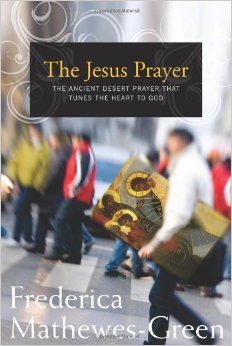 The Jesus Prayer: The Ancient Desert Prayer That Tunes the Heart to God Frederica Mathewes-Green (Paraclete Pres) $18.99 We had the great joy of hearing Frederica again last week at an event at the Roman Catholic Diocese offices in Harrisburg (thanks Fresh Expressions) and we were reminded how much we appreciate her clear, sensible writing. The Jesus Prayer is not particularly Benedictine (having its origins much earlier) but Rod mentions it from time to time, even in his wonderful memoir How Dante Saved My Life. His Orthodox pastor had him learn to recite this prayer and you may have heard Dreher mention this in one of the discussion questions at the Trinity Forum presentation to which we had linked on Facebook. Anyway, this is a good overview of this most mysterious, simple prayer of Eastern Christianity. A conversational question-and-answer format takes the reader through practical steps for adopting this profound practice in everyday life.
The Jesus Prayer: The Ancient Desert Prayer That Tunes the Heart to God Frederica Mathewes-Green (Paraclete Pres) $18.99 We had the great joy of hearing Frederica again last week at an event at the Roman Catholic Diocese offices in Harrisburg (thanks Fresh Expressions) and we were reminded how much we appreciate her clear, sensible writing. The Jesus Prayer is not particularly Benedictine (having its origins much earlier) but Rod mentions it from time to time, even in his wonderful memoir How Dante Saved My Life. His Orthodox pastor had him learn to recite this prayer and you may have heard Dreher mention this in one of the discussion questions at the Trinity Forum presentation to which we had linked on Facebook. Anyway, this is a good overview of this most mysterious, simple prayer of Eastern Christianity. A conversational question-and-answer format takes the reader through practical steps for adopting this profound practice in everyday life.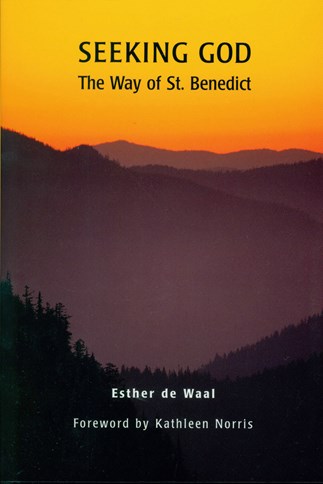 Seeking God: The Way of St. Benedict Esther de Waal (Liturgical Press) $14.99 Esther de Waal is widely recognized as one of the wise, gentle writers about Benedict and we stock many of her books. One reviewer says that she was “one of the pioneers in applying Benedictine spirituality to life outside of the monasteries. She herself is an “Anglican lay woman, married with four sons and a number of grandchildren. She lives on the Welsh Borders where she grew up and spends her time gardening, writing, traveling, and taking retreats. She became interested in Benedictine monasticism as a result of living for ten years in Canterbury and has written several books on the Rule… She holds a PhD. from Cambridge and was given an honorary doctorate from St. John’s University for her contribution to Benedictine studies and for her ecumenical work. She was awarded the Templeton Prize for having started the Benedictine Experience weeks which are now widely held throughout America and England.” This second edition, by the way, has a very supportive and eloquent foreword by Kathleen Norris, author of, among other wonderful memoirs, The Cloister Walk.
Seeking God: The Way of St. Benedict Esther de Waal (Liturgical Press) $14.99 Esther de Waal is widely recognized as one of the wise, gentle writers about Benedict and we stock many of her books. One reviewer says that she was “one of the pioneers in applying Benedictine spirituality to life outside of the monasteries. She herself is an “Anglican lay woman, married with four sons and a number of grandchildren. She lives on the Welsh Borders where she grew up and spends her time gardening, writing, traveling, and taking retreats. She became interested in Benedictine monasticism as a result of living for ten years in Canterbury and has written several books on the Rule… She holds a PhD. from Cambridge and was given an honorary doctorate from St. John’s University for her contribution to Benedictine studies and for her ecumenical work. She was awarded the Templeton Prize for having started the Benedictine Experience weeks which are now widely held throughout America and England.” This second edition, by the way, has a very supportive and eloquent foreword by Kathleen Norris, author of, among other wonderful memoirs, The Cloister Walk. Seeking Life: The Baptismal Invitation of the Rule of St. Benedict Esther de Waal (Liturgical Press) $19.95 This is a very nice book, a small, handsome hardback, that focuses on the prologue to the Rule of Saint Benedict, explaining how it contains “the clues we need to both understand and live by the vows made at our baptism.” Parts of the Rule are actually believed to be based on addresses given to those about to be – or maybe who had recently been – baptized; they are a practical guide to “choosing the road that leads to life.” There’s a lovely long endorsement on the back by Alan Jones. Very impressive.
Seeking Life: The Baptismal Invitation of the Rule of St. Benedict Esther de Waal (Liturgical Press) $19.95 This is a very nice book, a small, handsome hardback, that focuses on the prologue to the Rule of Saint Benedict, explaining how it contains “the clues we need to both understand and live by the vows made at our baptism.” Parts of the Rule are actually believed to be based on addresses given to those about to be – or maybe who had recently been – baptized; they are a practical guide to “choosing the road that leads to life.” There’s a lovely long endorsement on the back by Alan Jones. Very impressive.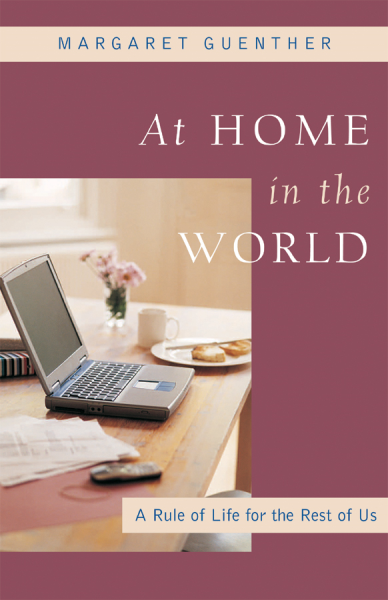 At Home in the World: A Rule of Life for the Rest of Us Margaret Guenther (Seabury Books) $16.00 Anyone familiar with the literature of spiritual formation will know Guenther’s name -her Holy Listening is ca classic. This includes ancient and contemporary takes on the classic monastic vows of poverty, chastity and obedience (in the first half of the book) which is then followed up with a series of shorter essays on “the essentials” for devising a rule of life of your own. This is informed by Benedict’s rule but she isn’t attempting to cling to it, but draw on a variety of monastic rules, insights from various disciplines, encouraging us to find some guidelines for helping us navigate our lives well. Although Guenther visits monasteries often and is a sought after spiritual retreat leader, she writes also as a wife, mother, grandmother, professor, mentor and Episcopal priest.
At Home in the World: A Rule of Life for the Rest of Us Margaret Guenther (Seabury Books) $16.00 Anyone familiar with the literature of spiritual formation will know Guenther’s name -her Holy Listening is ca classic. This includes ancient and contemporary takes on the classic monastic vows of poverty, chastity and obedience (in the first half of the book) which is then followed up with a series of shorter essays on “the essentials” for devising a rule of life of your own. This is informed by Benedict’s rule but she isn’t attempting to cling to it, but draw on a variety of monastic rules, insights from various disciplines, encouraging us to find some guidelines for helping us navigate our lives well. Although Guenther visits monasteries often and is a sought after spiritual retreat leader, she writes also as a wife, mother, grandmother, professor, mentor and Episcopal priest. 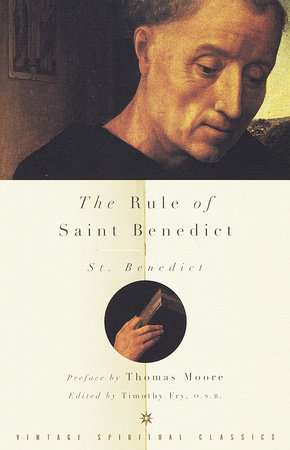 The Rule of Saint Benedict St. Benedict of Nursia (Vintage) $13.95 I don’t know anything about the translation from the original Latin but this seems to be a very reliable edition, the one most people enjoy, with a cool, classy cover. It was edited by Timothy Fry (who translated the famous RB1980) and there is an interesting foreword by Thomas Moore. Highly recommended.
The Rule of Saint Benedict St. Benedict of Nursia (Vintage) $13.95 I don’t know anything about the translation from the original Latin but this seems to be a very reliable edition, the one most people enjoy, with a cool, classy cover. It was edited by Timothy Fry (who translated the famous RB1980) and there is an interesting foreword by Thomas Moore. Highly recommended. 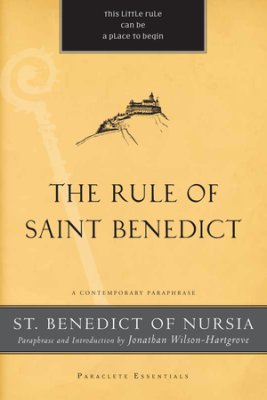 The Rule of Saint Benedict: A Contemporary Paraphrase St. Benedict of Nursia; paraphrased and introduced by Jonathan Wilson-Hartgrove (Paraclete Press) $13.99 This slim volume is in the publishers’ “Paraclete Essentials” series which offers nice paraphrases of classic texts coupled with extensive notes and advise about contemporary application. Jonathan Wilson-Hartgrove graduated from Eastern University where he was pals with Shane Claiborne; he and his wife started Rutba House, one of a network of intentional communities committed to sharing life with those on the margins of society and forming folks able to be involved in peace and justice work. He is an associate minister at St. John’s Baptist Church in Durham. Perhaps you know Jonathan’s co-authored prayer book Common Prayer: A Liturgy for Ordinary Radicals or his lovely The Wisdom of Stability which draws on Benedictine spirituality quite nicely. Highly recommended.
The Rule of Saint Benedict: A Contemporary Paraphrase St. Benedict of Nursia; paraphrased and introduced by Jonathan Wilson-Hartgrove (Paraclete Press) $13.99 This slim volume is in the publishers’ “Paraclete Essentials” series which offers nice paraphrases of classic texts coupled with extensive notes and advise about contemporary application. Jonathan Wilson-Hartgrove graduated from Eastern University where he was pals with Shane Claiborne; he and his wife started Rutba House, one of a network of intentional communities committed to sharing life with those on the margins of society and forming folks able to be involved in peace and justice work. He is an associate minister at St. John’s Baptist Church in Durham. Perhaps you know Jonathan’s co-authored prayer book Common Prayer: A Liturgy for Ordinary Radicals or his lovely The Wisdom of Stability which draws on Benedictine spirituality quite nicely. Highly recommended.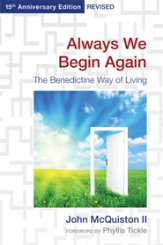
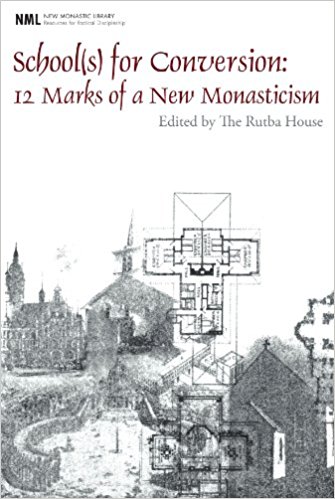 School(s) for Conversion: 12 Marks of a New Monasticism
School(s) for Conversion: 12 Marks of a New Monasticism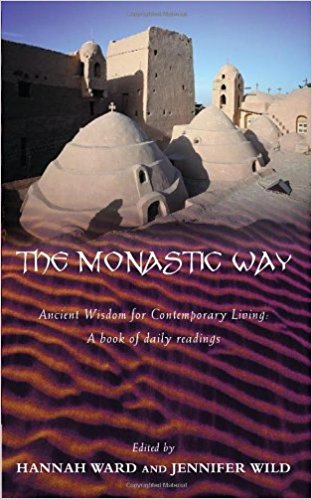 The Monastic Way: Ancient Wisdom for Contemporary Living: A Book of Daily Readings
The Monastic Way: Ancient Wisdom for Contemporary Living: A Book of Daily Readings Preferring Christ: A Devotional Commentary on the Rule of St. Benedict
Preferring Christ: A Devotional Commentary on the Rule of St. Benedict 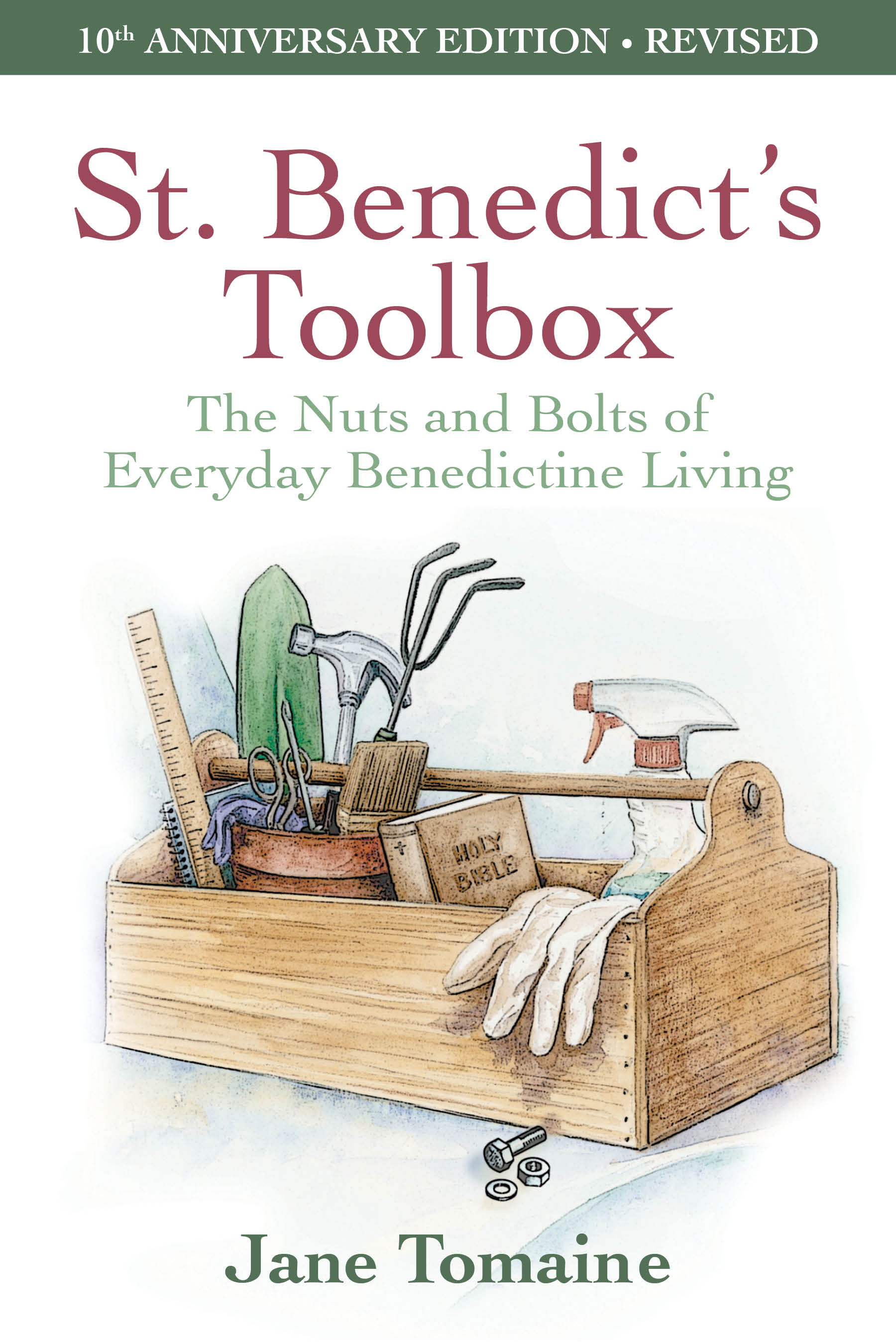 St. Benedict’s Toolbox: The Nuts and Bolts of Everyday Benedictine Living Jane Tomaine (Morehouse Publishing) $24.00 A few years ago this Episcopalian publisher re-issued this in a special “10
St. Benedict’s Toolbox: The Nuts and Bolts of Everyday Benedictine Living Jane Tomaine (Morehouse Publishing) $24.00 A few years ago this Episcopalian publisher re-issued this in a special “10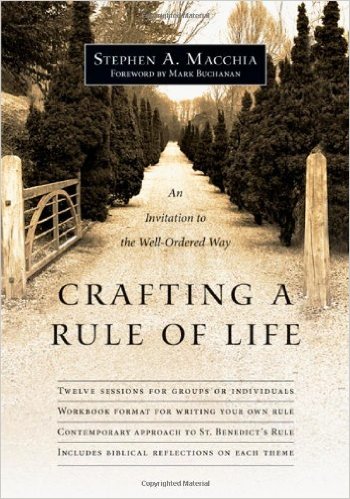 Crafting a Rule of Life: An Invitation to the Well-Ordered Way
Crafting a Rule of Life: An Invitation to the Well-Ordered Way  Benedictine Daily Prayer: A Short Breviary
Benedictine Daily Prayer: A Short Breviary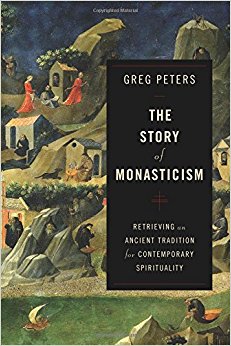 The Story of Monasticism: Retrieving an Ancient Tradition for Contemporary Spirituality
The Story of Monasticism: Retrieving an Ancient Tradition for Contemporary Spirituality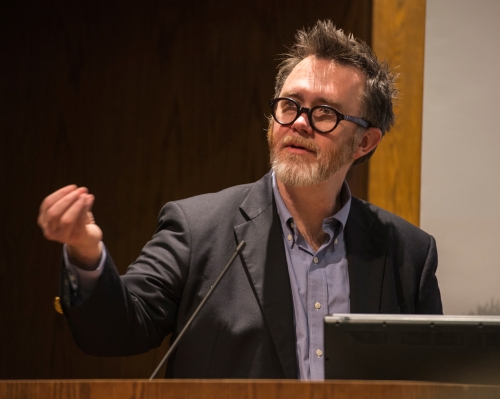 And, for the record, my wife and I met Rod and his wife at a conference book signing a few years ago and had a blast. We laughed and talked and truly enjoyed them a lot. I hope we cross paths again.
And, for the record, my wife and I met Rod and his wife at a conference book signing a few years ago and had a blast. We laughed and talked and truly enjoyed them a lot. I hope we cross paths again.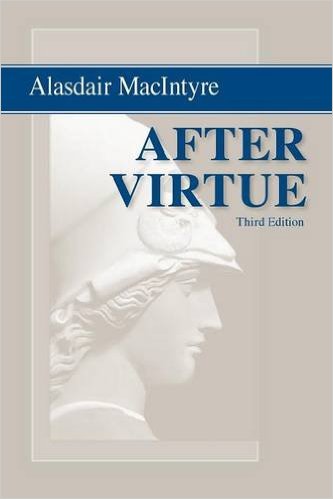 important philosophy books of the last 50 years: After Virtue: A Study in Moral Theology, published by the University of Notre Dame Press.
important philosophy books of the last 50 years: After Virtue: A Study in Moral Theology, published by the University of Notre Dame Press.

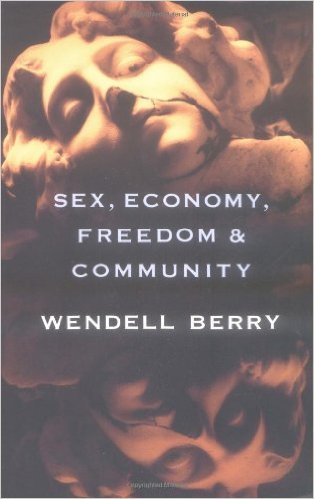 By the way, I have to say in passing that although Rod quotes Wendell several times in The Benedict Option it is selective. He nicely cites Berry’s comments about stability and family and fairly traditional views of sexual fidelity. (In one brilliant essay in Berry’s Sex, Economy, Freedom & Community: Eight Essays – which Lauren Winner so beautifully describes in her book Real Sex: The Hidden Truth about Chastity — Berry explains how consumerism shapes us to want stuff for ourselves, which has less than subtly deformed our views of sexual desire; Ms. Winner says maybe the thing to do to resist her lust and help her learn sexual chastity is to quit going to the mall to buy more sweaters. Learning to say no to American capitalism’s reductionism and deforming of our desires might be a deeper, better practice to help us think differently about a theology of the body and a wholesome view of sex., more serious and radical than evangelicalism’s penchant for morality pledges and purity rings.)
By the way, I have to say in passing that although Rod quotes Wendell several times in The Benedict Option it is selective. He nicely cites Berry’s comments about stability and family and fairly traditional views of sexual fidelity. (In one brilliant essay in Berry’s Sex, Economy, Freedom & Community: Eight Essays – which Lauren Winner so beautifully describes in her book Real Sex: The Hidden Truth about Chastity — Berry explains how consumerism shapes us to want stuff for ourselves, which has less than subtly deformed our views of sexual desire; Ms. Winner says maybe the thing to do to resist her lust and help her learn sexual chastity is to quit going to the mall to buy more sweaters. Learning to say no to American capitalism’s reductionism and deforming of our desires might be a deeper, better practice to help us think differently about a theology of the body and a wholesome view of sex., more serious and radical than evangelicalism’s penchant for morality pledges and purity rings.)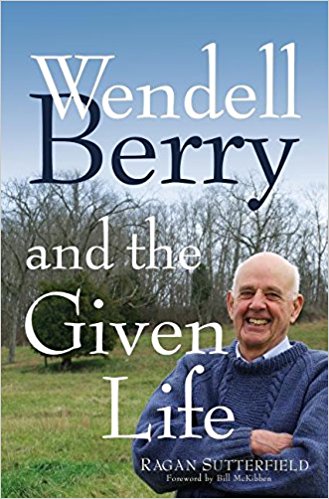
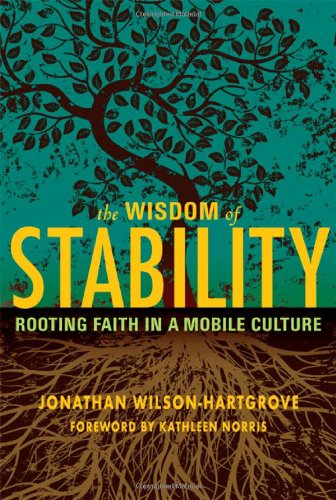
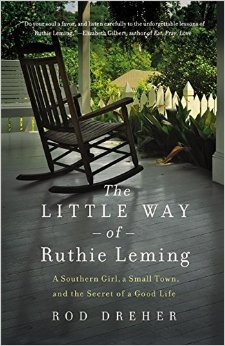
 rulings in favor of marriage equality in our pluralistic society and disagree with him that this is disastrous for Christian discipleship; my own discipleship hasn’t become any more difficult since Obergefell v Hodges; really it hasn’t. I’m still too much of a jerk and always in need of God’s grace, but the Supreme Court ruling didn’t change that one bit. (I found it nearly surreal reading some astonishingly outlandish statements insisting that we can’t even be Christian with such a ruling as Obergefell in our background. This really is a driving force for him; it is, he insists, about “order.” And that’s a theological notion that needs to be more carefully explored, I’d suggest. We know what happens when a movement makes too much of a fetish out of order and fears “disorder.” I’m not suggesting we take lightly dis-order and certainly agree with Rod in his desire to resist whatever the Bible calls sin. But his fear and anxiety about the shift away from order is notable.)
rulings in favor of marriage equality in our pluralistic society and disagree with him that this is disastrous for Christian discipleship; my own discipleship hasn’t become any more difficult since Obergefell v Hodges; really it hasn’t. I’m still too much of a jerk and always in need of God’s grace, but the Supreme Court ruling didn’t change that one bit. (I found it nearly surreal reading some astonishingly outlandish statements insisting that we can’t even be Christian with such a ruling as Obergefell in our background. This really is a driving force for him; it is, he insists, about “order.” And that’s a theological notion that needs to be more carefully explored, I’d suggest. We know what happens when a movement makes too much of a fetish out of order and fears “disorder.” I’m not suggesting we take lightly dis-order and certainly agree with Rod in his desire to resist whatever the Bible calls sin. But his fear and anxiety about the shift away from order is notable.)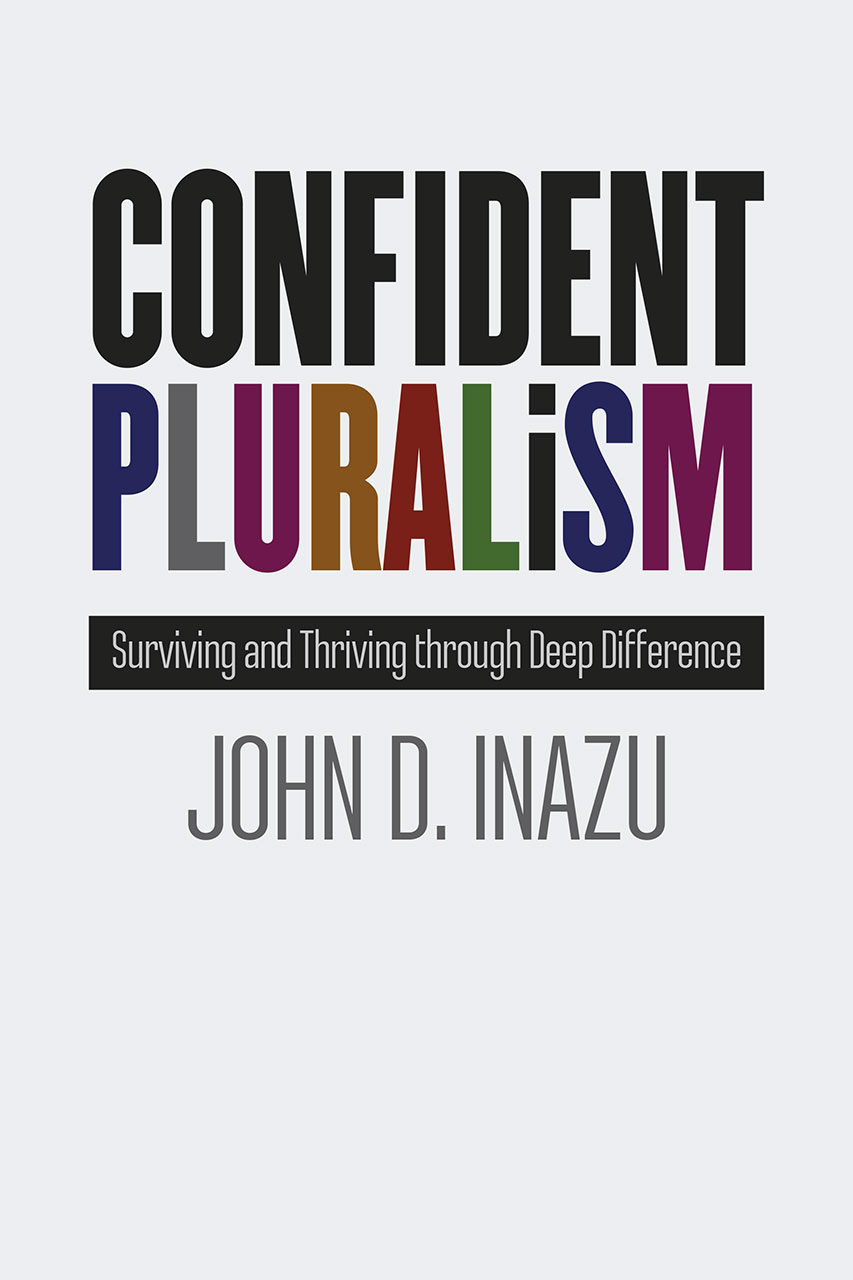
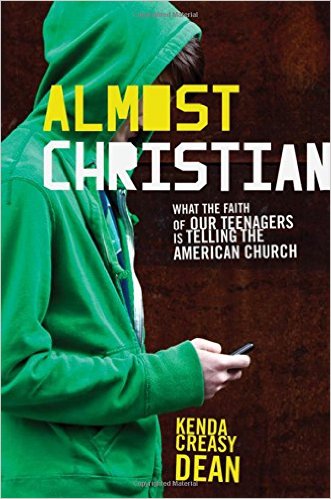 ago, he tells a story about middle school kids watching hard core porn on their cell phones. He laments the number of young women pregnant without the father intending to be involved in the lives of their children. He mentions the unusually high number of middle school girls who announce confidently that they are bi. He describes the shallow sort of religion found in many churches, drawing on the significant work of sociologist Christian Smith (see Soul Searching: The Religious and Spiritual Lives of American Teenagers and Lost in Transition: The Dark Side of Emerging Adulthood, or the very important popularization of that work found in Kenda Creasy Dean’s Almost Christian or even David Kinnaman’s You Lost Me.)
ago, he tells a story about middle school kids watching hard core porn on their cell phones. He laments the number of young women pregnant without the father intending to be involved in the lives of their children. He mentions the unusually high number of middle school girls who announce confidently that they are bi. He describes the shallow sort of religion found in many churches, drawing on the significant work of sociologist Christian Smith (see Soul Searching: The Religious and Spiritual Lives of American Teenagers and Lost in Transition: The Dark Side of Emerging Adulthood, or the very important popularization of that work found in Kenda Creasy Dean’s Almost Christian or even David Kinnaman’s You Lost Me.)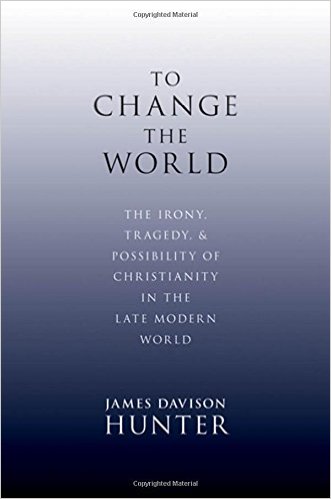 formulations of sexuality and his almost overstated call to “order.” Since he is writing to conservatives to sway them away from culture wars — perhaps almost in the tradition of To Change the World: The Irony, Tragedy, and Possibility of Christianity in the Late Modern World the Oxford University Press book by James Davison Hunter, but with less “in” and more “not of” the world — I get that he doesn’t use the Bible to explain his assumptions. He is not particularly evangelical and makes it clear he is writing firstly as a conservative, albeit a Christian one.
formulations of sexuality and his almost overstated call to “order.” Since he is writing to conservatives to sway them away from culture wars — perhaps almost in the tradition of To Change the World: The Irony, Tragedy, and Possibility of Christianity in the Late Modern World the Oxford University Press book by James Davison Hunter, but with less “in” and more “not of” the world — I get that he doesn’t use the Bible to explain his assumptions. He is not particularly evangelical and makes it clear he is writing firstly as a conservative, albeit a Christian one. 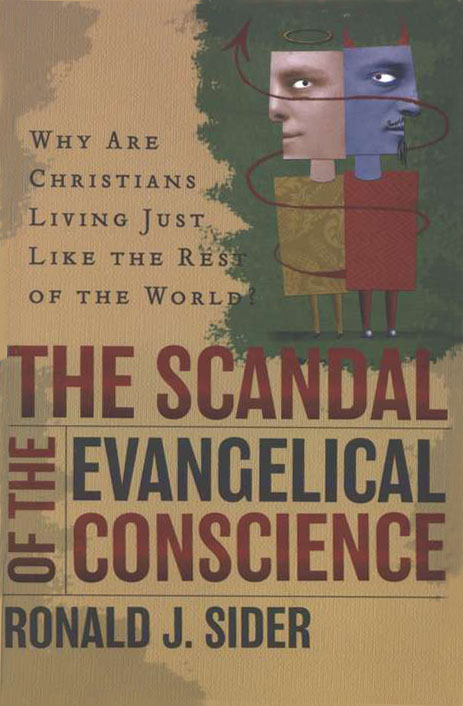
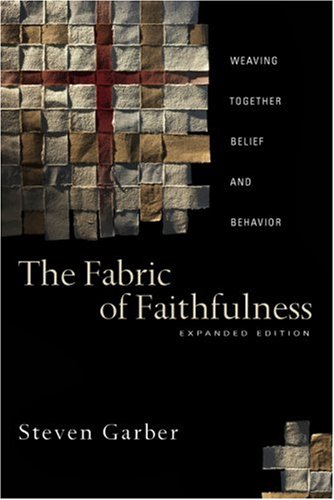
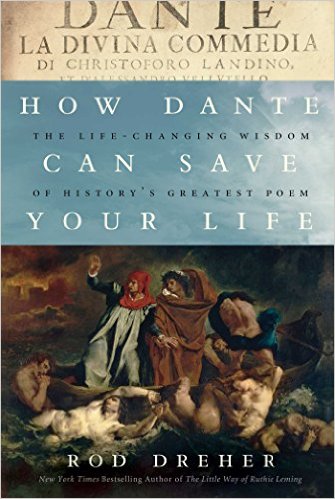 The Benedict Option shows us how to draw on ancient asceticism as a tool to help us keep our digital and media influences at bay. It insists on more active involvement in local churches to keep our spirits alive. Dreher asks us to consider starting alternative study groups, book clubs, young adult discipleship houses, even study centers, to study classical literature, history, poetry, and to allow deep truth to influence our hearts and minds. (He knows how this works somewhat and tells us all about it in the magnificent memoir of how he was somewhat healed of a bad relationship with his father and extended family and moved out of serious depression by reading “The Divine Comedy called How Dante Can Save Your Life which I hope you have ordered from us.)
The Benedict Option shows us how to draw on ancient asceticism as a tool to help us keep our digital and media influences at bay. It insists on more active involvement in local churches to keep our spirits alive. Dreher asks us to consider starting alternative study groups, book clubs, young adult discipleship houses, even study centers, to study classical literature, history, poetry, and to allow deep truth to influence our hearts and minds. (He knows how this works somewhat and tells us all about it in the magnificent memoir of how he was somewhat healed of a bad relationship with his father and extended family and moved out of serious depression by reading “The Divine Comedy called How Dante Can Save Your Life which I hope you have ordered from us.)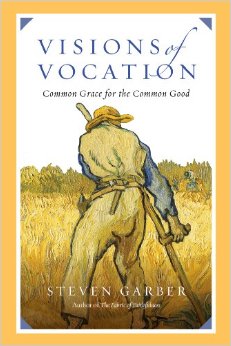
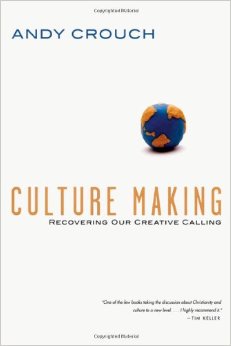
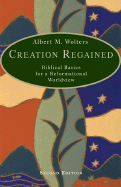

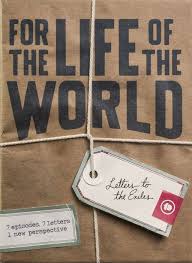
 The Body Keeps the Score: Brain, Mind and Body in the Healing of Trauma Bessel Van Der Kolk (Penguin) $18.00 A wondrous, remarkable book by a leading expert on trauma who has pioneered new ways to treat PTSD (including sand trays in children’s therapy) and has helped us all realize new things about the human mind, memory, neuroscience, and pathways to recovery. For anyone concerned about the toll of the cycle of trauma and violence in our society – and about how relationships can be hurtful but also healing — this intense but beautiful book is a must.
The Body Keeps the Score: Brain, Mind and Body in the Healing of Trauma Bessel Van Der Kolk (Penguin) $18.00 A wondrous, remarkable book by a leading expert on trauma who has pioneered new ways to treat PTSD (including sand trays in children’s therapy) and has helped us all realize new things about the human mind, memory, neuroscience, and pathways to recovery. For anyone concerned about the toll of the cycle of trauma and violence in our society – and about how relationships can be hurtful but also healing — this intense but beautiful book is a must.  The Body in Pain: The Making and Unmaking of the World Elaine Scarry (Oxford University Press) $19.95 I know more than one person who has recently raved to me about how important this book was for them; it is a dense and complex read, studying chronic pain, trauma, including a major report on research Scarry did in the 1980s (in cooperation with Amnesty International, I believe) on the impact of torture. As a literary critic (a recent book was on the Shakespeare sonnets) she is known for close readings, for good listening, for rich and moving meditations. Susan Sontag calls this “large-spirited, heroically truthful, a necessary book.” Is pain inexpressible? Can it destroy a sufferers language? How do political regimes “unmake” an individual’s world in their exercise of power? And how do we then re-make the world (through act is of creativity that produce language and culture and hope? If you want a book that is perhaps a bit more accessible and not as long, see her beloved work about aesthetics and public justice on Princeton University Press called Beauty and Being Just. That’s a good read any time.
The Body in Pain: The Making and Unmaking of the World Elaine Scarry (Oxford University Press) $19.95 I know more than one person who has recently raved to me about how important this book was for them; it is a dense and complex read, studying chronic pain, trauma, including a major report on research Scarry did in the 1980s (in cooperation with Amnesty International, I believe) on the impact of torture. As a literary critic (a recent book was on the Shakespeare sonnets) she is known for close readings, for good listening, for rich and moving meditations. Susan Sontag calls this “large-spirited, heroically truthful, a necessary book.” Is pain inexpressible? Can it destroy a sufferers language? How do political regimes “unmake” an individual’s world in their exercise of power? And how do we then re-make the world (through act is of creativity that produce language and culture and hope? If you want a book that is perhaps a bit more accessible and not as long, see her beloved work about aesthetics and public justice on Princeton University Press called Beauty and Being Just. That’s a good read any time. Losing Susan: Brain Disease, The Priest’s Life, and the God Who Gives and Takes Away Victor Lee Austin (Brazos Press) $19.99 We discovered the serious work of this Episcopal priest and social critic when we read Up With Authority, a book about authority structures in society. In this moving, powerful story, the theologian gets personal, telling of his love for his wife, Susan, as he cared for her during her long struggle with brain cancer – and the aftereffects which brought him more “face to face with God” and allowed him to re-evaluate his own faith. Endorsements are from other deep, thoughtful, pastoral theologians such as Robert Jensen and Sam Wells and others who have written about suffering, such as Stanley Hauerwas and Tobias Winright who teaches Health Care Ethics at Saint Louis University who calls it “a moving work, carefully crafted and thoughtfully honest.”
Losing Susan: Brain Disease, The Priest’s Life, and the God Who Gives and Takes Away Victor Lee Austin (Brazos Press) $19.99 We discovered the serious work of this Episcopal priest and social critic when we read Up With Authority, a book about authority structures in society. In this moving, powerful story, the theologian gets personal, telling of his love for his wife, Susan, as he cared for her during her long struggle with brain cancer – and the aftereffects which brought him more “face to face with God” and allowed him to re-evaluate his own faith. Endorsements are from other deep, thoughtful, pastoral theologians such as Robert Jensen and Sam Wells and others who have written about suffering, such as Stanley Hauerwas and Tobias Winright who teaches Health Care Ethics at Saint Louis University who calls it “a moving work, carefully crafted and thoughtfully honest.” Learning to Walk in the Dark Barbara Brown Taylor (HarperOne) $14.99 It is rare to find someone who doesn’t appreciate Barbara Brown Taylor’s rich prose, her wonderful use of words, her charming tone, even in serious sermons. One of my own all-time favorite books is her brief memoir of coming to Christian faith and discerning a call to the ministry called The Preaching Life (which concludes with some sample sermons, themselves always worth reading. Let us know if you want to make our day by ordering one from us.) But this, her most recent book, is a study of darkness in our lives, literal and metaphorical, explored in the entertaining form of story and memoir, how she came to embrace doubt and darkness, which, in her estimation, isn’t at all a bad thing. From sitting in an utterly dark cave to camping out in the deepest night to attending to some perplexities and pain in her own life, she invites us all to explore this side of life, literally darkness and the “dark night of the soul.”. I loved this book and its quiet blend of charm and provocation and commend it to you during these weeks of Lent.
Learning to Walk in the Dark Barbara Brown Taylor (HarperOne) $14.99 It is rare to find someone who doesn’t appreciate Barbara Brown Taylor’s rich prose, her wonderful use of words, her charming tone, even in serious sermons. One of my own all-time favorite books is her brief memoir of coming to Christian faith and discerning a call to the ministry called The Preaching Life (which concludes with some sample sermons, themselves always worth reading. Let us know if you want to make our day by ordering one from us.) But this, her most recent book, is a study of darkness in our lives, literal and metaphorical, explored in the entertaining form of story and memoir, how she came to embrace doubt and darkness, which, in her estimation, isn’t at all a bad thing. From sitting in an utterly dark cave to camping out in the deepest night to attending to some perplexities and pain in her own life, she invites us all to explore this side of life, literally darkness and the “dark night of the soul.”. I loved this book and its quiet blend of charm and provocation and commend it to you during these weeks of Lent. Forgive Us: Confessions of a Compromised Faith Mae Elise Cannon, Lisa Sharon Harper, Troy Jackson, Soong-Chan Rah (Zondervan) $22.99 I have raved about this book since before it came out (indeed have a long blurb on the inside, alongside many, many pastors, authors, activists, leaders that I so admire and respect, from Anthony Bradley to John Perkins to Virgilio Elizondo and more.) We’ve mentioned it often, insisting that reading such an overview of many of the sins against others in which the church has been complicit, is good for the soul, important for our witness to the world, and an important aspect of any serious transformation for the sake of God’s Kingdom. This well-informed survey has chapters on how the Christian religion was too often used to harm indigenous peoples, blacks and other people of color, immigrants, women, gays and lesbians, the poor, the Earth itself. There are prayers included to help us learn the art of public confession and wise, pastoral invitations to lament, to show remorse, to change and to grow. Margot Starbuck says reading Forgive Us “was an experience I’d never had with any other book…” Now might be a good time for some of our readers to order it and spend some time in prayerful reflection about its hard truths. Such is the path of holiness and true liberation, I am convinced. Please consider this…
Forgive Us: Confessions of a Compromised Faith Mae Elise Cannon, Lisa Sharon Harper, Troy Jackson, Soong-Chan Rah (Zondervan) $22.99 I have raved about this book since before it came out (indeed have a long blurb on the inside, alongside many, many pastors, authors, activists, leaders that I so admire and respect, from Anthony Bradley to John Perkins to Virgilio Elizondo and more.) We’ve mentioned it often, insisting that reading such an overview of many of the sins against others in which the church has been complicit, is good for the soul, important for our witness to the world, and an important aspect of any serious transformation for the sake of God’s Kingdom. This well-informed survey has chapters on how the Christian religion was too often used to harm indigenous peoples, blacks and other people of color, immigrants, women, gays and lesbians, the poor, the Earth itself. There are prayers included to help us learn the art of public confession and wise, pastoral invitations to lament, to show remorse, to change and to grow. Margot Starbuck says reading Forgive Us “was an experience I’d never had with any other book…” Now might be a good time for some of our readers to order it and spend some time in prayerful reflection about its hard truths. Such is the path of holiness and true liberation, I am convinced. Please consider this… The Wired Soul: Finding Spiritual Balance in a Hyperconnected Age Tricia McCary Rhodes (NavPress) $14.99 I’ve told you about this book before, so will be brief: it is a beautifully written book ruminating on spiritual formation in the digital age. Do we have to give up technology and social media to earn quiet and solitude? Do our habits of the heart and mind, informed as they are by the fast-paced (or slow if you’ve got my computer) pixels and images of the internets, need to be re-calibrated if we are going to be attentive to the things of God? This book reintroduces us to the classic disciplines of Scripture reading, meditation, prayer and contemplation, but not describing them just as “technologies to aid our faith” but as tools to keep us mindful and focused in an increasingly disoriented digital age. What does it mean to ‘be still and know that I am God’ in these times? A very nice book.
The Wired Soul: Finding Spiritual Balance in a Hyperconnected Age Tricia McCary Rhodes (NavPress) $14.99 I’ve told you about this book before, so will be brief: it is a beautifully written book ruminating on spiritual formation in the digital age. Do we have to give up technology and social media to earn quiet and solitude? Do our habits of the heart and mind, informed as they are by the fast-paced (or slow if you’ve got my computer) pixels and images of the internets, need to be re-calibrated if we are going to be attentive to the things of God? This book reintroduces us to the classic disciplines of Scripture reading, meditation, prayer and contemplation, but not describing them just as “technologies to aid our faith” but as tools to keep us mindful and focused in an increasingly disoriented digital age. What does it mean to ‘be still and know that I am God’ in these times? A very nice book. The Desire: Satisfying the Heart James M. Houston (Victor) $16.99 The remarkably profound scholar and teacher and spiritual leader, James Houston, who founded Regent College in British Columbia, is known for his mastery of medieval and other spiritual writers and remains a like-minded colleague with authors such as J.I. Packer, Marva Dawn, Eugene Peterson. A small evangelical publisher rather oddly published three magisterial books of his years ago and they went out of print. This was one of those and we have a few that we’ve been holding for ages. Given the popularity of thinking about desire (see books just as David Naugle’s excellent Reordered Loves Reordered Lives, Jen Pollock Michel’s splendid Teach Us to Want, and of course Jamie Smith’s must-read You Are What You Love ) we wanted to highlight this now, and make our few available, while our supplies last. The Desire explores the very nature of the human heart and how longings for the eternal play out in our daily lives, even as we discern false desires (which can become addictions and dysfunctions.) A remarkable book, especially in this season where we seek, as this book offers, “a more substantial and satisfying life.”
The Desire: Satisfying the Heart James M. Houston (Victor) $16.99 The remarkably profound scholar and teacher and spiritual leader, James Houston, who founded Regent College in British Columbia, is known for his mastery of medieval and other spiritual writers and remains a like-minded colleague with authors such as J.I. Packer, Marva Dawn, Eugene Peterson. A small evangelical publisher rather oddly published three magisterial books of his years ago and they went out of print. This was one of those and we have a few that we’ve been holding for ages. Given the popularity of thinking about desire (see books just as David Naugle’s excellent Reordered Loves Reordered Lives, Jen Pollock Michel’s splendid Teach Us to Want, and of course Jamie Smith’s must-read You Are What You Love ) we wanted to highlight this now, and make our few available, while our supplies last. The Desire explores the very nature of the human heart and how longings for the eternal play out in our daily lives, even as we discern false desires (which can become addictions and dysfunctions.) A remarkable book, especially in this season where we seek, as this book offers, “a more substantial and satisfying life.” The Seven Deadly Virtues: Temptations in Our Pursuit of Goodness Todd E. Outcalt (IVP) $16.00 There have been a small spate of books along these lines – we like The Danger of Doing Good by Peter Greer and the very useful and wise Doing Good Without Giving Up: Sustaining Social Action in a World That’s Hard to Change by Ben Lowe — but this one is more literary, more deeply theological, wonderfully written, drawing on thoughtful sources from the Ante-Nicene Fathers to Kierkegaard to Pope John Paul. The author is a United Methodist pastor and popular author. This looks tremendous and feels like a good book to read during Lent, even though it isn’t exactly a Lenten book. Check it out and you may be surprised how insightful it may be for you.
The Seven Deadly Virtues: Temptations in Our Pursuit of Goodness Todd E. Outcalt (IVP) $16.00 There have been a small spate of books along these lines – we like The Danger of Doing Good by Peter Greer and the very useful and wise Doing Good Without Giving Up: Sustaining Social Action in a World That’s Hard to Change by Ben Lowe — but this one is more literary, more deeply theological, wonderfully written, drawing on thoughtful sources from the Ante-Nicene Fathers to Kierkegaard to Pope John Paul. The author is a United Methodist pastor and popular author. This looks tremendous and feels like a good book to read during Lent, even though it isn’t exactly a Lenten book. Check it out and you may be surprised how insightful it may be for you. Evangelical, Sacramental & Pentecostal: Why the Church Should Be All Three Gordon T. Smith (IVP Academic) $17.00 This slim book just came and it looks like it is worth its weight in gold. I recommend every single book Gordon Smith has written, and highly esteem his ecumenical perspective, his contemplative tone, his good vision to integrate varying traditions within the broader church. (I’m a fan of Richard Foster’s Streams of Living Water as well, which is a broader study than Smith’s new one.) Glen Scorgie of Bethel Seminary (in San Diego) says “This is a provocative call for a fresh ecumenical synergy – for weaving all these elements together into something stronger and better than the older, isolating silos were able by themselves to deliver.” Wow – if in this season you are eager for more fullness of life, deeper reality, a wider connection to others in other faith traditions within the church, this corrective will pull you happily into other “means of grace.” I cannot wait to read this, and hope many Hearts & Minds friends, too, will be eager to spread the word about this approach. By the way, it would certainly be fitting during this season of deeper reflection and repentance and intentionality about Christian growth to work through his major volume Called to Be Saints.
Evangelical, Sacramental & Pentecostal: Why the Church Should Be All Three Gordon T. Smith (IVP Academic) $17.00 This slim book just came and it looks like it is worth its weight in gold. I recommend every single book Gordon Smith has written, and highly esteem his ecumenical perspective, his contemplative tone, his good vision to integrate varying traditions within the broader church. (I’m a fan of Richard Foster’s Streams of Living Water as well, which is a broader study than Smith’s new one.) Glen Scorgie of Bethel Seminary (in San Diego) says “This is a provocative call for a fresh ecumenical synergy – for weaving all these elements together into something stronger and better than the older, isolating silos were able by themselves to deliver.” Wow – if in this season you are eager for more fullness of life, deeper reality, a wider connection to others in other faith traditions within the church, this corrective will pull you happily into other “means of grace.” I cannot wait to read this, and hope many Hearts & Minds friends, too, will be eager to spread the word about this approach. By the way, it would certainly be fitting during this season of deeper reflection and repentance and intentionality about Christian growth to work through his major volume Called to Be Saints. 
 The Prophets Abraham Joshua Heschel (Harper Perennial) $19.99 You may have been meaning to read this large, serious work for years, now, or maybe you’ve only recently heard of this passionate mid-twentieth century Rabbi/scholar/activist. (You will see his white hair and beard in many old pictures of Dr. King and the civil rights marches.) First published in 1962 The Prophets has been considered a classic ever since, plumbing as it does, the pathos of the Hebrew prophets. Perhaps now is a time to start it. For a less daunting, but equally rich, very rewarding read, consider Rabbi Heschel’s wonderful and important work The Sabbath (Farrar Straus Giroux; $14.00.) It was released, I think, in 1951 and remains a standard in any discussion of Jewish spirituality. I think I first learned of it, or was challenged to read it, by Marva Dawn or maybe Eugene Peterson, who often recommends it. You really should have both of these…
The Prophets Abraham Joshua Heschel (Harper Perennial) $19.99 You may have been meaning to read this large, serious work for years, now, or maybe you’ve only recently heard of this passionate mid-twentieth century Rabbi/scholar/activist. (You will see his white hair and beard in many old pictures of Dr. King and the civil rights marches.) First published in 1962 The Prophets has been considered a classic ever since, plumbing as it does, the pathos of the Hebrew prophets. Perhaps now is a time to start it. For a less daunting, but equally rich, very rewarding read, consider Rabbi Heschel’s wonderful and important work The Sabbath (Farrar Straus Giroux; $14.00.) It was released, I think, in 1951 and remains a standard in any discussion of Jewish spirituality. I think I first learned of it, or was challenged to read it, by Marva Dawn or maybe Eugene Peterson, who often recommends it. You really should have both of these… The Yoke of Jesus: A School for the Soul in Solitude Addison Hodges Hart (Eerdmans) $14.00 This compact sized paperback is so beautifully written, so warm, so insightful, that I wanted to list it here. He is a Catholic priest and college chaplain – his books are oddly winsome even as they tackle some tough stuff. (See, for instance, his book Knowing Darkness: On Skepticism, Melancholy, Friendship and God.) This gracious volume invites us to silence and solitude, to care about our souls by attending to ordinary practices, bringing together dogma and belief (on one hand) but linking it to true knowledge of God and earnest love for God. What is the role of stillness in Christian discipleship, and how have the ancient writers (and the Bible itself) taught us about deeper prayer through nurturing habits of solitude?
The Yoke of Jesus: A School for the Soul in Solitude Addison Hodges Hart (Eerdmans) $14.00 This compact sized paperback is so beautifully written, so warm, so insightful, that I wanted to list it here. He is a Catholic priest and college chaplain – his books are oddly winsome even as they tackle some tough stuff. (See, for instance, his book Knowing Darkness: On Skepticism, Melancholy, Friendship and God.) This gracious volume invites us to silence and solitude, to care about our souls by attending to ordinary practices, bringing together dogma and belief (on one hand) but linking it to true knowledge of God and earnest love for God. What is the role of stillness in Christian discipleship, and how have the ancient writers (and the Bible itself) taught us about deeper prayer through nurturing habits of solitude?  Restoring Broken Things Steven Curtis Chapman & Scotty Smith (Thomas Nelson) $14.99 Maybe you’ve heard that there is a brand new memoir by CCM singer Steven Curtis Chapman (Between Heaven and the Real World: My Story) or maybe you’ve read some of pastor Scotty Smith’s powerful, serious books of prayers. They are both men who have suffered, men who are attentive to the fallen nature of our hurting world, and who are firm in the hope that the gospel is, in fact, a restoration of creation. This old book (which I featured at Jubilee this year on Saturday morning as we studied the fall, injustice, and brokenness) tells the big gospel story — creation/fall/redemption — and invites us to see “what happens when we catch a vision of the new world Jesus is creating.” This is good, accessible, Biblical theology, offering varying ways to tell the story of the gospel, to help us see our own role in the fresh start of new creation that God is bringing to bear in our lives and in all of creation. Dan Allender wrote a lovely, passionate forward. This is a great book to read anytime, and certainly a good one for now, here in the midst of the Lenten season when we ponder broken things, and yearn for authenticity about that, and yet hope for greater comfort and healing and restoration. I’m a big fan of this book and commend it to you.
Restoring Broken Things Steven Curtis Chapman & Scotty Smith (Thomas Nelson) $14.99 Maybe you’ve heard that there is a brand new memoir by CCM singer Steven Curtis Chapman (Between Heaven and the Real World: My Story) or maybe you’ve read some of pastor Scotty Smith’s powerful, serious books of prayers. They are both men who have suffered, men who are attentive to the fallen nature of our hurting world, and who are firm in the hope that the gospel is, in fact, a restoration of creation. This old book (which I featured at Jubilee this year on Saturday morning as we studied the fall, injustice, and brokenness) tells the big gospel story — creation/fall/redemption — and invites us to see “what happens when we catch a vision of the new world Jesus is creating.” This is good, accessible, Biblical theology, offering varying ways to tell the story of the gospel, to help us see our own role in the fresh start of new creation that God is bringing to bear in our lives and in all of creation. Dan Allender wrote a lovely, passionate forward. This is a great book to read anytime, and certainly a good one for now, here in the midst of the Lenten season when we ponder broken things, and yearn for authenticity about that, and yet hope for greater comfort and healing and restoration. I’m a big fan of this book and commend it to you. The Givenness of Things: Essays Marilynne Robinson (Picador) $16.00 This paperback is worth every dime – loaded, as it is, with ponderings deep and delicious, thoughtful and interesting, glorious, even. Granted, she is writing deeply, as a literary essayist here — you may only know her Pulitzer-Prize winning novels such as Gildead, Homecoming, or Lila — but if you are a serious thinker or wanting to be aware of the major public intellectuals of our day, you could hardly do better than to spend time with these remarkable, heady essays. Her intellectual prowess is well-respected (The Christian Science Monitor mentioned her “formidable intellect” and The New Republic said her handiwork is “capacious and serious, but also mysterious and wondrous.”) The Givenness of Things was named as Time’s top ten nonfiction books when it came out in hardcover and now, in this nice paperback, there is added a two-part interview between her and then-President Barack Obama that first appeared in the New York Review of Books. The New York Times Book Review, by the way, said her “heroic lamentation is magnificent… timely and important.” That she is a John Calvin scholar, too, makes her just a fascinating, tremendously interesting figure. Until her next novel comes, read this.
The Givenness of Things: Essays Marilynne Robinson (Picador) $16.00 This paperback is worth every dime – loaded, as it is, with ponderings deep and delicious, thoughtful and interesting, glorious, even. Granted, she is writing deeply, as a literary essayist here — you may only know her Pulitzer-Prize winning novels such as Gildead, Homecoming, or Lila — but if you are a serious thinker or wanting to be aware of the major public intellectuals of our day, you could hardly do better than to spend time with these remarkable, heady essays. Her intellectual prowess is well-respected (The Christian Science Monitor mentioned her “formidable intellect” and The New Republic said her handiwork is “capacious and serious, but also mysterious and wondrous.”) The Givenness of Things was named as Time’s top ten nonfiction books when it came out in hardcover and now, in this nice paperback, there is added a two-part interview between her and then-President Barack Obama that first appeared in the New York Review of Books. The New York Times Book Review, by the way, said her “heroic lamentation is magnificent… timely and important.” That she is a John Calvin scholar, too, makes her just a fascinating, tremendously interesting figure. Until her next novel comes, read this. Silence and Beauty: Hidden Faith Born of Suffering Makoto Fujimura (IVP) $26.00 Well, if you haven’t gotten this yet, might I suggest you do so now? I am not always this “pushy” but I am confident that this marvelous reflection on the relationship of art and creativity and beauty and suffering — and what all that tells us about God and the hope of redemption in the sufferings of Jesus — is a perfect book to take up as we move towards Good Friday. You know we respect Mr. Fujimura (what a thrill it was to have me introduced at Grove City College last week and having it said that the next speaker in their series of which I was a part, was painter and essayist Makoto Fujimura!) This is not only a survey of good thinking about faith and art and suffering but it is, quite specifically, a conversation with Japanese novelist Shusaku Endo and his stunning story Silence. And, also, tangentially, about Mako’s friend Martin Scorcese and his making of a film based on this 1960s novel. The novel (about the persecution of Christian missionaries in Seventeenth Century Japan) was influential in Mako’s own journey to Christ and his Christian witness today in the world of the arts and letters is somewhat indebted to Endo’s novel. It all comes full circle in Silence and Beauty — Mako, Endo, Japan, art, film, pain and redemption, goodness and life, the gospel and cultural renewal, faith and mystery. What a book! Very highly recommended!
Silence and Beauty: Hidden Faith Born of Suffering Makoto Fujimura (IVP) $26.00 Well, if you haven’t gotten this yet, might I suggest you do so now? I am not always this “pushy” but I am confident that this marvelous reflection on the relationship of art and creativity and beauty and suffering — and what all that tells us about God and the hope of redemption in the sufferings of Jesus — is a perfect book to take up as we move towards Good Friday. You know we respect Mr. Fujimura (what a thrill it was to have me introduced at Grove City College last week and having it said that the next speaker in their series of which I was a part, was painter and essayist Makoto Fujimura!) This is not only a survey of good thinking about faith and art and suffering but it is, quite specifically, a conversation with Japanese novelist Shusaku Endo and his stunning story Silence. And, also, tangentially, about Mako’s friend Martin Scorcese and his making of a film based on this 1960s novel. The novel (about the persecution of Christian missionaries in Seventeenth Century Japan) was influential in Mako’s own journey to Christ and his Christian witness today in the world of the arts and letters is somewhat indebted to Endo’s novel. It all comes full circle in Silence and Beauty — Mako, Endo, Japan, art, film, pain and redemption, goodness and life, the gospel and cultural renewal, faith and mystery. What a book! Very highly recommended! A Gathering of Larks: Letters to Saint Francis from a Modern-Day Pilgrim Abigail Carroll (Eerdmans) $12.99 Oh my, what an interesting book this is, not the easiest to describe, but simple to explain. This is a luminous set of poems written to, yep, Saint Francis. Consequently, this becomes what creative writing guru Brian Doyle calls “a most refreshing, eloquent, wonderfully unassuming, gentle inquiry into the actual Saint Francis and the song of his awed life” and Carroll’s own awed life as well. Mystic Richard Rohr says these lyrical letters “court wonder, inviting the reader on a pilgrimage to the heart.”
A Gathering of Larks: Letters to Saint Francis from a Modern-Day Pilgrim Abigail Carroll (Eerdmans) $12.99 Oh my, what an interesting book this is, not the easiest to describe, but simple to explain. This is a luminous set of poems written to, yep, Saint Francis. Consequently, this becomes what creative writing guru Brian Doyle calls “a most refreshing, eloquent, wonderfully unassuming, gentle inquiry into the actual Saint Francis and the song of his awed life” and Carroll’s own awed life as well. Mystic Richard Rohr says these lyrical letters “court wonder, inviting the reader on a pilgrimage to the heart.” Love Let Go: Radical Generosity for the Real World Laura Sumner Truax & Amalya Campbell (Eerdmans) $21.99 A few years ago I was blown away by the raw and revealing memoir by Laura Truax called Undone: When Coming Apart Puts You Back Together. She is the passionate pastor of the storied faith community in urban Chicago called LaSalle Street Church and in this new book she and a congregation member who taught stewardship classes there (and herself has an MBA from Harvard Business School), tell of something amazing that transpired in that place. A smaller version of this has been used as sermon illustrations and youth talks for years, but this is the real thing: a major donor gave the church a ton of money. They concluded they didn’t want it – itself a story worth writing a book about! – but they decided to give each member $500 and instructed them to go out and do good in the world. This is, on the surface, the stories of what happened as radical generosity became even more of a way of life for this congregation. This is more than fun tales of giving and sharing and helping, it is what Publisher’s Weekly has called “a well-wrought book, of interest to anyone interested in community building or philanthropy.” It is what McLaren calls “a powerful alternative message (to greed)” and “the transformative power of generosity.” This is a counter-cultural story that needs to be known, but it is also a rich study of the psychology of giving, the nature of living abundant lives within a culture that promotes scarcity, and the plausibility of being Christ-like in a world like ours. One of the best books of the year, I’m sure.
Love Let Go: Radical Generosity for the Real World Laura Sumner Truax & Amalya Campbell (Eerdmans) $21.99 A few years ago I was blown away by the raw and revealing memoir by Laura Truax called Undone: When Coming Apart Puts You Back Together. She is the passionate pastor of the storied faith community in urban Chicago called LaSalle Street Church and in this new book she and a congregation member who taught stewardship classes there (and herself has an MBA from Harvard Business School), tell of something amazing that transpired in that place. A smaller version of this has been used as sermon illustrations and youth talks for years, but this is the real thing: a major donor gave the church a ton of money. They concluded they didn’t want it – itself a story worth writing a book about! – but they decided to give each member $500 and instructed them to go out and do good in the world. This is, on the surface, the stories of what happened as radical generosity became even more of a way of life for this congregation. This is more than fun tales of giving and sharing and helping, it is what Publisher’s Weekly has called “a well-wrought book, of interest to anyone interested in community building or philanthropy.” It is what McLaren calls “a powerful alternative message (to greed)” and “the transformative power of generosity.” This is a counter-cultural story that needs to be known, but it is also a rich study of the psychology of giving, the nature of living abundant lives within a culture that promotes scarcity, and the plausibility of being Christ-like in a world like ours. One of the best books of the year, I’m sure. The Sense of the Call: A Sabbath Way of Life for Those Who Serve God, the Church, and the World Marva Dawn (Eerdmans) $18.00 One of the great books of our time, and one that we continue to carry with us whenever we sell books off site, if it is remotely appropriate, is Marva Dawn’s Keeping the Sabbath Wholly. (It is a book that would be wonderful to read during this time of the church season, by the way, learning to build some rest and discipline into your schedule.) In that remarkable and influential volume she delightfully unpacks four aspects of Sabbath keeping: resting, ceasing, feasting, and embracing. That’s a lot, but not too much, and it clarified a lot for many of us about the restorative, beautiful gift of Sabbath time. Of course, it isn’t easy to enter in to that sort of counter-cultural practice, and it is even harder for those who are in leadership within the local church where much work is done on Sunday. Anyway, in this book (for church leaders, yes, but, truly, for anyone and everyone) Marva spells out how those four movements of the Sabbath day’s rest can actually be woven into daily living the other six days of the week. In this powerful work she revisits those same four life-giving aspects from her Sabbath book, turning them into a “Sabbath way of life” and shows how we all can be formed in these helpful way, through these historic disciplines and practices, dispositions and attitudes. It is a remarkable, rich, rewarding, good read , just over 300 pages. As Eugene Peterson says, “there is not a trivial or superfluous word in this book.”
The Sense of the Call: A Sabbath Way of Life for Those Who Serve God, the Church, and the World Marva Dawn (Eerdmans) $18.00 One of the great books of our time, and one that we continue to carry with us whenever we sell books off site, if it is remotely appropriate, is Marva Dawn’s Keeping the Sabbath Wholly. (It is a book that would be wonderful to read during this time of the church season, by the way, learning to build some rest and discipline into your schedule.) In that remarkable and influential volume she delightfully unpacks four aspects of Sabbath keeping: resting, ceasing, feasting, and embracing. That’s a lot, but not too much, and it clarified a lot for many of us about the restorative, beautiful gift of Sabbath time. Of course, it isn’t easy to enter in to that sort of counter-cultural practice, and it is even harder for those who are in leadership within the local church where much work is done on Sunday. Anyway, in this book (for church leaders, yes, but, truly, for anyone and everyone) Marva spells out how those four movements of the Sabbath day’s rest can actually be woven into daily living the other six days of the week. In this powerful work she revisits those same four life-giving aspects from her Sabbath book, turning them into a “Sabbath way of life” and shows how we all can be formed in these helpful way, through these historic disciplines and practices, dispositions and attitudes. It is a remarkable, rich, rewarding, good read , just over 300 pages. As Eugene Peterson says, “there is not a trivial or superfluous word in this book.” Subversive Meals: An Analysis of the Lord’s Supper Under Roman Domination During the First Century R. Alan Streett (Pickwick Publications) $37.00 A hefty academic monograph, this may be of great interest to some of our readers who want to explore how ancient Christian practices had at their roots anti-empire connotations and nearly revolutionary impact. Endorsements on this lively book are from Richard Horsley and Warrant Carter (who have long written about this counter-cultural hermeneutic that explores the radical socio-political themes embedded but often missed in Biblical teaching and practice.) Interestingly, Street teaches Biblical Exegesis at the ultra-conservative Criswell College in Texas. Joel Green, an esteemed evangelical scholar (formerly of Asbury, now at Fuller) says that Streett “demonstrates the surprisingly political significance of the Lord’s Supper” and that his book is “historically important and theological challenging” which “participates in the ongoing destruction of the walls that separate theology and practices, worship and politics.”
Subversive Meals: An Analysis of the Lord’s Supper Under Roman Domination During the First Century R. Alan Streett (Pickwick Publications) $37.00 A hefty academic monograph, this may be of great interest to some of our readers who want to explore how ancient Christian practices had at their roots anti-empire connotations and nearly revolutionary impact. Endorsements on this lively book are from Richard Horsley and Warrant Carter (who have long written about this counter-cultural hermeneutic that explores the radical socio-political themes embedded but often missed in Biblical teaching and practice.) Interestingly, Street teaches Biblical Exegesis at the ultra-conservative Criswell College in Texas. Joel Green, an esteemed evangelical scholar (formerly of Asbury, now at Fuller) says that Streett “demonstrates the surprisingly political significance of the Lord’s Supper” and that his book is “historically important and theological challenging” which “participates in the ongoing destruction of the walls that separate theology and practices, worship and politics.” 
 Cruciformity: Paul’s Narrative Spirituality of the Cross Michael J. Gorman (Eerdmans) $38.00
Cruciformity: Paul’s Narrative Spirituality of the Cross Michael J. Gorman (Eerdmans) $38.00 too, and could be read in ways that are helpful, illuminating, challenging, informative and – the author hopes – transformative. Some have of called these a “tour de force” and “superb and groundbreaking” etcetera. He is an author you should know – in league with and quoted by nearly everyone serious in New Testament studies these days (from N.T. Wright to Richard Hays to Fleming Rutledge and other world class authors.) Lent seems like a good time to take up his challenge to “participate” in God’s own mission, as explained by Paul, as embodied by the sacrificial suffering of the Lamb of God, Christ Himself. This is heady scholarship but always with a view of how local churches live out the call to costly discipleship. Wow.
too, and could be read in ways that are helpful, illuminating, challenging, informative and – the author hopes – transformative. Some have of called these a “tour de force” and “superb and groundbreaking” etcetera. He is an author you should know – in league with and quoted by nearly everyone serious in New Testament studies these days (from N.T. Wright to Richard Hays to Fleming Rutledge and other world class authors.) Lent seems like a good time to take up his challenge to “participate” in God’s own mission, as explained by Paul, as embodied by the sacrificial suffering of the Lamb of God, Christ Himself. This is heady scholarship but always with a view of how local churches live out the call to costly discipleship. Wow. Saving Power: Theories of Atonement and Forms of the Church Peter Schmiechen (Eerdmans) $39.95 Peter was former President of Lancaster Theological Seminary and for one so situated within UCC higher education it may surprise some to know of his orthodox passions. (He is involved in the rather conservative Mercersburg Society that applies Schaff and Nevin to today’s ecumenical challenges; indeed, his new book is about Eucharistic theology written with what seems to be a Mercersburg accent.) Endorsements of this almost 400 page study are from Walter Brueggemann, Sally Brown (of Princeton) and S. Mark Heim (of Andover Newton, a “nonviolent atonement” voice) and evangelically Reformed Hans Boersma of Regent College, affirming the book’s scholarly clarity (it studies 10 different models) and congeniality, notes “even when he feels the need to express his strong reservations, Schmiechen treads carefully, respectfully, and yet frankly.”
Saving Power: Theories of Atonement and Forms of the Church Peter Schmiechen (Eerdmans) $39.95 Peter was former President of Lancaster Theological Seminary and for one so situated within UCC higher education it may surprise some to know of his orthodox passions. (He is involved in the rather conservative Mercersburg Society that applies Schaff and Nevin to today’s ecumenical challenges; indeed, his new book is about Eucharistic theology written with what seems to be a Mercersburg accent.) Endorsements of this almost 400 page study are from Walter Brueggemann, Sally Brown (of Princeton) and S. Mark Heim (of Andover Newton, a “nonviolent atonement” voice) and evangelically Reformed Hans Boersma of Regent College, affirming the book’s scholarly clarity (it studies 10 different models) and congeniality, notes “even when he feels the need to express his strong reservations, Schmiechen treads carefully, respectfully, and yet frankly.” 
 The Cross of Christ John R.W. Stott (IVP Academic) $28.00 I seem to recommend this every year at this time, in part because it has meant so much to me, advancing a mature, winsome, if seriously evangelical view of the nature of the work of the cross. Granted, other authors push in fresh, new directions, but this is the best overview of the conventional position that we know of.
The Cross of Christ John R.W. Stott (IVP Academic) $28.00 I seem to recommend this every year at this time, in part because it has meant so much to me, advancing a mature, winsome, if seriously evangelical view of the nature of the work of the cross. Granted, other authors push in fresh, new directions, but this is the best overview of the conventional position that we know of.
 The Undoing of Death: Sermons for Holy Week and Easter Fleming Rutledge (Eerdmans) $24.00 This is another that, while not technically a Lenten devotional, is, in fact, a collection of sermons preached over a lifetime by the eloquent Episcopal pastor and scholar. Her words are powerful, her studies extraordinary, and this book deserves being read and re-read. I hope you own it. If not, it would be our great pleasure to send one soon.
The Undoing of Death: Sermons for Holy Week and Easter Fleming Rutledge (Eerdmans) $24.00 This is another that, while not technically a Lenten devotional, is, in fact, a collection of sermons preached over a lifetime by the eloquent Episcopal pastor and scholar. Her words are powerful, her studies extraordinary, and this book deserves being read and re-read. I hope you own it. If not, it would be our great pleasure to send one soon.  Jesus Journey: Shattering the Stained Glass Superhero and Discovering the Humanity of God – a 40 Day Encounter Trent Shepard (Zondervan) $16.99 I am sometimes a bit weary of uber-cool authors whose bios tell you snarky stuff about their favorite lattes and pastors who look like they play in an emo band, with churches with stages that look like hip malls or the local rock arena. I dunno, maybe I’m getting old. There are a lot of books that are just a little too familiar, and little too casual, trying sooo hard to be cool. So when a book comes out saying it’s going to overturn our stuffy attitudes about Jesus and religion, well, I sometimes just roll my eyes. It’s useful, especially for millennials, I suppose, to hear somebody that at least appears edgy with an out-side-the-box message, helping them appreciate faith in their own vernacular. My faith in my youthful years was impacted by bell-bottom wearing, long-haired, Jesus Freaks. (And, later, I met Terry Thomas who in those years looked liked David Crosby, but I digress.) So I get it. But I’m still a little tired of the marketing schtick.
Jesus Journey: Shattering the Stained Glass Superhero and Discovering the Humanity of God – a 40 Day Encounter Trent Shepard (Zondervan) $16.99 I am sometimes a bit weary of uber-cool authors whose bios tell you snarky stuff about their favorite lattes and pastors who look like they play in an emo band, with churches with stages that look like hip malls or the local rock arena. I dunno, maybe I’m getting old. There are a lot of books that are just a little too familiar, and little too casual, trying sooo hard to be cool. So when a book comes out saying it’s going to overturn our stuffy attitudes about Jesus and religion, well, I sometimes just roll my eyes. It’s useful, especially for millennials, I suppose, to hear somebody that at least appears edgy with an out-side-the-box message, helping them appreciate faith in their own vernacular. My faith in my youthful years was impacted by bell-bottom wearing, long-haired, Jesus Freaks. (And, later, I met Terry Thomas who in those years looked liked David Crosby, but I digress.) So I get it. But I’m still a little tired of the marketing schtick. The Jesus Way: A Conversation on the Ways That Jesus is the Way Eugene Peterson (Eerdmans) $17.00 I suppose you know all five of these remarkable, mostly big, somewhat dense books that Peterson saw as his most important contribution. It is called “spiritual theology” that is more than only spirituality, more than systematic theology, more than Bible study, but a rich and rewarding combination, by a scholar/pastor. I agree with Scot McKnight who said once that “no one simply reads, or worse, skims Peterson. One ponders Peterson, as Peterson ponders the Bible.” Yes, and more. I’ve been working on these five volumes, on and off, for years, and I cannot tell you how important they are. This third one in the series – following Christ Plays in Ten Thousand Places and Eat This Book and Tell It Slant offers profound insight into how others in the Bible anticipated His coming and shows how the ways of those who came before Christ – specifically Abraham, Moses, David, Elijah, and Isaiah — “revealed and prepared the ‘way of the Lord’ that became incarnate and complete in Jesus.”
The Jesus Way: A Conversation on the Ways That Jesus is the Way Eugene Peterson (Eerdmans) $17.00 I suppose you know all five of these remarkable, mostly big, somewhat dense books that Peterson saw as his most important contribution. It is called “spiritual theology” that is more than only spirituality, more than systematic theology, more than Bible study, but a rich and rewarding combination, by a scholar/pastor. I agree with Scot McKnight who said once that “no one simply reads, or worse, skims Peterson. One ponders Peterson, as Peterson ponders the Bible.” Yes, and more. I’ve been working on these five volumes, on and off, for years, and I cannot tell you how important they are. This third one in the series – following Christ Plays in Ten Thousand Places and Eat This Book and Tell It Slant offers profound insight into how others in the Bible anticipated His coming and shows how the ways of those who came before Christ – specifically Abraham, Moses, David, Elijah, and Isaiah — “revealed and prepared the ‘way of the Lord’ that became incarnate and complete in Jesus.” The Bad Habits of Jesus: Showing Us the Way to Live Right in a World Gone Wrong Leonard Sweet (Tyndale) $14.99 I am convinced that there is always more going on in a Len Sweet book than most of us realize. Just his footnotes alone are an education, better than browsing through a big Barnes & Noble or meandering through your local college library. He brings remarkable learning, a fertile curiosity, and a breath-taking — even for some, exasperating — use of wordplay and wit to whatever project he takes up. Such is one way to read his new one — it can be skimmed quickly as any collection of sermons or Bible lessons might be, getting the gist, taking in the many ideas, applauding the keen cleverness that would find all this “bad” stuff Jesus did, the rules he broke, the manners he seems to avoid, the trouble he caused. I suppose much of this has been said before but, to be honest, I can’t think of a better intro to this line of thought for ordinary folks: Jesus did have some “bad habits” did he not? He’d disappear when people needed him most, he’d refuse to answer questions directly, he’d offend people, especially important religious folks. He was late. He spit. He spent time with unproductive children. He was at times wasteful. He told stories that didn’t make a lot of sense. What’s with this “rebellious rabbi” and is there a method to his madness? The Bad Habits of Jesus is a lot of fun, a good intro to the life and teaching of Jesus and a surprisingly powerful little book.
The Bad Habits of Jesus: Showing Us the Way to Live Right in a World Gone Wrong Leonard Sweet (Tyndale) $14.99 I am convinced that there is always more going on in a Len Sweet book than most of us realize. Just his footnotes alone are an education, better than browsing through a big Barnes & Noble or meandering through your local college library. He brings remarkable learning, a fertile curiosity, and a breath-taking — even for some, exasperating — use of wordplay and wit to whatever project he takes up. Such is one way to read his new one — it can be skimmed quickly as any collection of sermons or Bible lessons might be, getting the gist, taking in the many ideas, applauding the keen cleverness that would find all this “bad” stuff Jesus did, the rules he broke, the manners he seems to avoid, the trouble he caused. I suppose much of this has been said before but, to be honest, I can’t think of a better intro to this line of thought for ordinary folks: Jesus did have some “bad habits” did he not? He’d disappear when people needed him most, he’d refuse to answer questions directly, he’d offend people, especially important religious folks. He was late. He spit. He spent time with unproductive children. He was at times wasteful. He told stories that didn’t make a lot of sense. What’s with this “rebellious rabbi” and is there a method to his madness? The Bad Habits of Jesus is a lot of fun, a good intro to the life and teaching of Jesus and a surprisingly powerful little book. Leaving Egypt: Finding God in the Wilderness Places Chuck DeGroat (Square Inch) $15.99 I have talked about this book before, and tried to encourage many to read DeGroat’s other good books. (For instance, this time of year — or any time, really — many of us need his powerful book called Wholeheartedness: Busyness, Exhaustion, and Healing the Divided Self.) This first one of his, though, always is a delight to explain; I even love the suitcase-motif on the very cool cover design. This is the best book I know of that accessibly uses the wilderness wonderings (of the Hebrew people after they were liberated from Pharaoh’s Egypt) for any who are themselves in a time of wondering, wandering, or in transition. If you feel trapped and know there’s something better, says Steve Brown, “this book will change your life.” If you are a Bible study geek and want another voice in conversation with DeGroat’s why not pair it with Walt Brueggemann’s Keeping Sabbath As Resistance which invites us to say “no” to consumerism and be set free from the compulsions of our times; in a way, that book, too, explores what happens when we are set free, and how to find our way out of Egypt.
Leaving Egypt: Finding God in the Wilderness Places Chuck DeGroat (Square Inch) $15.99 I have talked about this book before, and tried to encourage many to read DeGroat’s other good books. (For instance, this time of year — or any time, really — many of us need his powerful book called Wholeheartedness: Busyness, Exhaustion, and Healing the Divided Self.) This first one of his, though, always is a delight to explain; I even love the suitcase-motif on the very cool cover design. This is the best book I know of that accessibly uses the wilderness wonderings (of the Hebrew people after they were liberated from Pharaoh’s Egypt) for any who are themselves in a time of wondering, wandering, or in transition. If you feel trapped and know there’s something better, says Steve Brown, “this book will change your life.” If you are a Bible study geek and want another voice in conversation with DeGroat’s why not pair it with Walt Brueggemann’s Keeping Sabbath As Resistance which invites us to say “no” to consumerism and be set free from the compulsions of our times; in a way, that book, too, explores what happens when we are set free, and how to find our way out of Egypt.  Habakkuk Before Breakfast: Liturgy, Lament, Hope Brian J. Walsh and the Wine Before Breakfast Community (Books Before Breakfast) $14.00 Again, this was a favorite last year, one I was honored to offer an endorsing blurb on (next to Karen Pascal, the Director of the Henri Nouwen Society and Tom Wright, Walsh’s old friend, who says that “Habakkuk Before Breakfast is like no other book on the prophet.”
Habakkuk Before Breakfast: Liturgy, Lament, Hope Brian J. Walsh and the Wine Before Breakfast Community (Books Before Breakfast) $14.00 Again, this was a favorite last year, one I was honored to offer an endorsing blurb on (next to Karen Pascal, the Director of the Henri Nouwen Society and Tom Wright, Walsh’s old friend, who says that “Habakkuk Before Breakfast is like no other book on the prophet.” Executing Grace: How the Death Penalty Killed Jesus and Why It’s Killing Us Shane Claiborne (HarperOne) $17.99 Not long ago I had a long conversation with a gentleman who had been in solitary confinement for years. Beth and I had participated earlier this year in a conference organizing faith-motivated folks to think and act justly about this whole topic of mass incarceration, prison reform, solitary confinement — which is a much worse topic than you may know, unbelievably bad and in urgent need of reform — and, of course, the topic that we sometimes call “capital punishment.” Agree or not with Shane’s gospel-centered, grace-filled, Christ-like view (there are Biblical texts he avoids and arguments he doesn’t adequately grapple with) I think reading about those who are incarcerated and on Death Row is a necessary component of our own calling as Christians, mandated, as we are, at least, to “visit the prisoner.” Most of us don’t do that, so at least we can be advocates, prayer partners, citizens working for better policies for our imprisoned fellows. I think this is a very good book to enter into this conversation. There are important endorsements here from the likes of Philip Yancey and John Perkins (and Bob Goff who says “you’ll finish the last page and not just know more, but you’ll want to do more.”) Desmond Tutu raves, and Bryan Stevenson (author of the must-read Just Mercy) says “Compelling and thoughtful… a must-read for people of faith, essential for anyone serious about grace and mercy.” Well. Maybe this season you will be drawn to this kind of topic. I know it is a lot to ask, but we’d invite you to consider ordering this from us today.
Executing Grace: How the Death Penalty Killed Jesus and Why It’s Killing Us Shane Claiborne (HarperOne) $17.99 Not long ago I had a long conversation with a gentleman who had been in solitary confinement for years. Beth and I had participated earlier this year in a conference organizing faith-motivated folks to think and act justly about this whole topic of mass incarceration, prison reform, solitary confinement — which is a much worse topic than you may know, unbelievably bad and in urgent need of reform — and, of course, the topic that we sometimes call “capital punishment.” Agree or not with Shane’s gospel-centered, grace-filled, Christ-like view (there are Biblical texts he avoids and arguments he doesn’t adequately grapple with) I think reading about those who are incarcerated and on Death Row is a necessary component of our own calling as Christians, mandated, as we are, at least, to “visit the prisoner.” Most of us don’t do that, so at least we can be advocates, prayer partners, citizens working for better policies for our imprisoned fellows. I think this is a very good book to enter into this conversation. There are important endorsements here from the likes of Philip Yancey and John Perkins (and Bob Goff who says “you’ll finish the last page and not just know more, but you’ll want to do more.”) Desmond Tutu raves, and Bryan Stevenson (author of the must-read Just Mercy) says “Compelling and thoughtful… a must-read for people of faith, essential for anyone serious about grace and mercy.” Well. Maybe this season you will be drawn to this kind of topic. I know it is a lot to ask, but we’d invite you to consider ordering this from us today.  A Unique Time of God: Karl Barth’s WW I Sermons Karl Barth (Westminster/John Knox) $35.00 My theologically conservative friends, of course, think Barth is way too goofy and my progressive friends think he is mired in old-school stuff. I think he is well worth reading, and people I most respect commend his important work. This is a new collection previously never translated or compiled. The Great War, we are told, changed Barth forever. (See Joseph Loconte’s informative and very moving A Hobbit, A Wardrobe and a Great War for how the trauma of the war effected Tolkien and Lewis and how they “rediscovered faith, friendship, and heroism in the cataclysm of 1914-1918.) These thirteen hefty sermons offer not only the young Karl Barth’s unique view on war, but, particularly, the “unique time of God” which he discerned was God’s own judgement on the idolatry of militarism. We’re told in the excellent introduction that this era “demonstrates a decisive shift in Barth’s early theology” so is “essential for anyone who wishes to understand the twentieth-century’s greatest theologian.” And, we can hope, it might help us all reflect more conscientiously about God’s Word as it stands over what the old hymn called “our warring madness.”
A Unique Time of God: Karl Barth’s WW I Sermons Karl Barth (Westminster/John Knox) $35.00 My theologically conservative friends, of course, think Barth is way too goofy and my progressive friends think he is mired in old-school stuff. I think he is well worth reading, and people I most respect commend his important work. This is a new collection previously never translated or compiled. The Great War, we are told, changed Barth forever. (See Joseph Loconte’s informative and very moving A Hobbit, A Wardrobe and a Great War for how the trauma of the war effected Tolkien and Lewis and how they “rediscovered faith, friendship, and heroism in the cataclysm of 1914-1918.) These thirteen hefty sermons offer not only the young Karl Barth’s unique view on war, but, particularly, the “unique time of God” which he discerned was God’s own judgement on the idolatry of militarism. We’re told in the excellent introduction that this era “demonstrates a decisive shift in Barth’s early theology” so is “essential for anyone who wishes to understand the twentieth-century’s greatest theologian.” And, we can hope, it might help us all reflect more conscientiously about God’s Word as it stands over what the old hymn called “our warring madness.” Christian Practical Wisdom: What It Is, Why It Matters Dorothy Bass, Kathleen Cahalan, Bonnie J. Miller-McLemore, James Nieman, Christian Scharen (Eerdmans) $30.00 I hope you know some of these five distinguished scholars, some who have written wonderful books of their own. And I hope you value, as I do, collaborative works of this sort. These colorful chapters are not an anthology from a conference (although I like random essays, too) but have been woven together beautifully, exploring (as the subtitle says) what wisdom is and why we need more of it. The chapters are creatively construed – with pieces on dancing and imagining and collaborating and how these actual practices can help us “gain a heart of wisdom” within what Charles Taylor calls a “secular age.” Blurbs on the back are all thoughtful, in-depth, and raving; philosopher Rebecca Konynkyk DeYoung of Calvin College and Mary Boys from Union Seminary and Stephanie Paulsell from Harvard Divinity School all agree that this profound yet winsome book helps move theological education into the pews, deep stuff into our lives, bringing academic expertise to ordinary folks who want to live a good life. Can we ponder more deeply, live with greater intentionality? Can we be “attuned to the presence of God and the needs of neighbors?” This is a tremendous book, well worth having, well worth working through its 350 pages with care. You will be delighted and challenged and glad. Wisdom is, as I’m sure you know, a major theme in the Bible and yet hardly examined beyond platitudes and moralism. This is the most significant book on this topic I’ve ever seen.
Christian Practical Wisdom: What It Is, Why It Matters Dorothy Bass, Kathleen Cahalan, Bonnie J. Miller-McLemore, James Nieman, Christian Scharen (Eerdmans) $30.00 I hope you know some of these five distinguished scholars, some who have written wonderful books of their own. And I hope you value, as I do, collaborative works of this sort. These colorful chapters are not an anthology from a conference (although I like random essays, too) but have been woven together beautifully, exploring (as the subtitle says) what wisdom is and why we need more of it. The chapters are creatively construed – with pieces on dancing and imagining and collaborating and how these actual practices can help us “gain a heart of wisdom” within what Charles Taylor calls a “secular age.” Blurbs on the back are all thoughtful, in-depth, and raving; philosopher Rebecca Konynkyk DeYoung of Calvin College and Mary Boys from Union Seminary and Stephanie Paulsell from Harvard Divinity School all agree that this profound yet winsome book helps move theological education into the pews, deep stuff into our lives, bringing academic expertise to ordinary folks who want to live a good life. Can we ponder more deeply, live with greater intentionality? Can we be “attuned to the presence of God and the needs of neighbors?” This is a tremendous book, well worth having, well worth working through its 350 pages with care. You will be delighted and challenged and glad. Wisdom is, as I’m sure you know, a major theme in the Bible and yet hardly examined beyond platitudes and moralism. This is the most significant book on this topic I’ve ever seen. Generous Spaciousness: Responding to Gay Christians in the Church Wendy VanderWal-Gritter (Brazos Press) $19.99 I have raved about this book before, quietly (and, more often, loudly)encouraged people to read it as it tells the remarkable story of this woman’s deep engagement with several sides and groups within the conversation about same sex relations and marriage equality and “gays in the church.” It goes without saying that this remains a controversial matter in nearly every denomination and, as Brian Walsh says in a powerful endorsement on the back, “I can’t imagine a more timely book.” He continues, “Modeling the very ‘generous spaciousness’ that she advocates, VanderWal-Gritter’s heart is on every page.” There are many books inviting us to think of our LGTBQ friends and neighbors as – in the words of the new book Preston Sprinkle’s – as “people to be loved.” Certainly. But VanderWal-Gritter suggests that those with whom we disagree about Biblical interpretation and sexual ethics are also people to be loved and we must all work hard to listen well to one another, to figure out how to “transform controversy into community” with space for all.
Generous Spaciousness: Responding to Gay Christians in the Church Wendy VanderWal-Gritter (Brazos Press) $19.99 I have raved about this book before, quietly (and, more often, loudly)encouraged people to read it as it tells the remarkable story of this woman’s deep engagement with several sides and groups within the conversation about same sex relations and marriage equality and “gays in the church.” It goes without saying that this remains a controversial matter in nearly every denomination and, as Brian Walsh says in a powerful endorsement on the back, “I can’t imagine a more timely book.” He continues, “Modeling the very ‘generous spaciousness’ that she advocates, VanderWal-Gritter’s heart is on every page.” There are many books inviting us to think of our LGTBQ friends and neighbors as – in the words of the new book Preston Sprinkle’s – as “people to be loved.” Certainly. But VanderWal-Gritter suggests that those with whom we disagree about Biblical interpretation and sexual ethics are also people to be loved and we must all work hard to listen well to one another, to figure out how to “transform controversy into community” with space for all. Hidden But Now Revealed: A Biblical Theology of Mystery G.K. Beale and Benjamin L. Gladd (IVP Academic) $27.00 Beale is a rigorous New Testament scholar (PhD from the University of Cambridge) who now teaches NT and Biblical Theology at Westminster Theological Seminary. His work is without doubt some of the most brilliant evangelical scholarship being done in our time; his commentary on Revelation in the New International Greek Testament Commentary series I’m told is extraordinary (not knowing Greek, I wouldn’t know.) I found his book We Become What We Worship an excellent resource and his somewhat more accessible commentary on Revelation to be demanding but important. This recent volume, co-authored, is intriguing, one I’ve been wishing to get to; we hear about “mystery” a lot, but few detail what we mean by that mysterious word and how the major works of God and the essential claims of Christ were often missed — if not hidden! — from the Biblical characters involved. It seems impossible to ignore this troubling fact and here these authors explore the things that are “partially hidden revelation” that are more fully revealed subsequently. It is a close reading of times the word mystery is used in the New Testament, which, they argue, is almost always drawing on the book of Daniel. So this ends up, in some regards, being a book about prophecy. Whew.
Hidden But Now Revealed: A Biblical Theology of Mystery G.K. Beale and Benjamin L. Gladd (IVP Academic) $27.00 Beale is a rigorous New Testament scholar (PhD from the University of Cambridge) who now teaches NT and Biblical Theology at Westminster Theological Seminary. His work is without doubt some of the most brilliant evangelical scholarship being done in our time; his commentary on Revelation in the New International Greek Testament Commentary series I’m told is extraordinary (not knowing Greek, I wouldn’t know.) I found his book We Become What We Worship an excellent resource and his somewhat more accessible commentary on Revelation to be demanding but important. This recent volume, co-authored, is intriguing, one I’ve been wishing to get to; we hear about “mystery” a lot, but few detail what we mean by that mysterious word and how the major works of God and the essential claims of Christ were often missed — if not hidden! — from the Biblical characters involved. It seems impossible to ignore this troubling fact and here these authors explore the things that are “partially hidden revelation” that are more fully revealed subsequently. It is a close reading of times the word mystery is used in the New Testament, which, they argue, is almost always drawing on the book of Daniel. So this ends up, in some regards, being a book about prophecy. Whew. Theologians You Should Know: An Introduction from the Apostolic Fathers to the 21
Theologians You Should Know: An Introduction from the Apostolic Fathers to the 21 To Alter Your World: Partnering with God to Rebirth Our Communities Michael Frost & Christiana Rice (Forge America/IVP Praxis) $17.00 I suppose you know that we stock oodles of books about the missional church and, in more recent years, those who have taken missional church insights and applied them to daily discipleship. Michael Frost has given us great books both for congregations and for persons committed to robust, missional visions of vocation in the world but not of it. Wow, I love his stuff. But one sometimes wonders when an author has said most of what he or she has got within them to say. I rolled my eyes (sorry, Michael) when I heard there was yet another book by this prolific author. And then I started this, skimming the table of contents, dipping in here and there, looking at the always intriguing footnotes. And I was quickly hooked–from the evocative imagery of midwifery (okay, he had me at the quote by British home birth advocate Sheila Kitzinger) and birthing the new creation among us, I think this wonderful book reminds us yet again that we can truly partner with God, that we become agents of Christ’s own work in the world, that there is much required, even though it is all gift. Romans 8 uses this “all creation groaning” language and directly links it to childbirth.
To Alter Your World: Partnering with God to Rebirth Our Communities Michael Frost & Christiana Rice (Forge America/IVP Praxis) $17.00 I suppose you know that we stock oodles of books about the missional church and, in more recent years, those who have taken missional church insights and applied them to daily discipleship. Michael Frost has given us great books both for congregations and for persons committed to robust, missional visions of vocation in the world but not of it. Wow, I love his stuff. But one sometimes wonders when an author has said most of what he or she has got within them to say. I rolled my eyes (sorry, Michael) when I heard there was yet another book by this prolific author. And then I started this, skimming the table of contents, dipping in here and there, looking at the always intriguing footnotes. And I was quickly hooked–from the evocative imagery of midwifery (okay, he had me at the quote by British home birth advocate Sheila Kitzinger) and birthing the new creation among us, I think this wonderful book reminds us yet again that we can truly partner with God, that we become agents of Christ’s own work in the world, that there is much required, even though it is all gift. Romans 8 uses this “all creation groaning” language and directly links it to childbirth. The Soul of Shame: Retelling the Stories We Believe About Ourselves Curt Thompson (IVP) $22.00 This splendid hardback could be a life-line for some of us who struggle with shame or recovering from some sense that we are not enough, not lovable, inadequate. In this sense, Thompson asserts, ” we are all infected with a spiritual disease. Its name is shame.”
The Soul of Shame: Retelling the Stories We Believe About Ourselves Curt Thompson (IVP) $22.00 This splendid hardback could be a life-line for some of us who struggle with shame or recovering from some sense that we are not enough, not lovable, inadequate. In this sense, Thompson asserts, ” we are all infected with a spiritual disease. Its name is shame.” Paradoxology: Why Christianity Was Never Meant To Be Simple Krish Kandiah (IVP) $17.00 Okay, I have to say I haven’t looked at this much, but it is new and I’m so intrigued by it. People I respect – Scot McKnight, Jo Saxton, Eugene Cho — all endorse it with gusto. He starts with a wordy little joke in the first paragraph and says that if you get that paradox, there’s hope you’ll enjoy this book. Yep, there are a lot of paradoxes in the Bible and in Christian faith and this isn’t a book trying to “answer” them or explain them away. He invites us to live into the mystery, to embrace the seeming contradictions, to have a faith that is paradoxical. Every chapter is on a different part of the Bible or character, with titles like “The Abraham Paradox: The God Who Needs Nothing But Asks for Everything” or “The Job Paradox: The God Who Is Actively Inactive” or, from Esther, “The God Who Speaks Silently” or, from – hold on – one he calls “The Judas Paradox:The God Who Determines Our Free Will.” The ones about Jesus are not unfamiliar (being “Divinely Human”) and the one about the cross, while common place, I bet will be fabulous in Kandiah’s hands: “The God Who Wins as He Loses.” There’s more, but you get the drift. If this is your cup of tea, give us a call asap. I think you’ll want to read this in this upside down season.
Paradoxology: Why Christianity Was Never Meant To Be Simple Krish Kandiah (IVP) $17.00 Okay, I have to say I haven’t looked at this much, but it is new and I’m so intrigued by it. People I respect – Scot McKnight, Jo Saxton, Eugene Cho — all endorse it with gusto. He starts with a wordy little joke in the first paragraph and says that if you get that paradox, there’s hope you’ll enjoy this book. Yep, there are a lot of paradoxes in the Bible and in Christian faith and this isn’t a book trying to “answer” them or explain them away. He invites us to live into the mystery, to embrace the seeming contradictions, to have a faith that is paradoxical. Every chapter is on a different part of the Bible or character, with titles like “The Abraham Paradox: The God Who Needs Nothing But Asks for Everything” or “The Job Paradox: The God Who Is Actively Inactive” or, from Esther, “The God Who Speaks Silently” or, from – hold on – one he calls “The Judas Paradox:The God Who Determines Our Free Will.” The ones about Jesus are not unfamiliar (being “Divinely Human”) and the one about the cross, while common place, I bet will be fabulous in Kandiah’s hands: “The God Who Wins as He Loses.” There’s more, but you get the drift. If this is your cup of tea, give us a call asap. I think you’ll want to read this in this upside down season. Faithful Presence: Seven Disciplines That Shape the Church for Mission David E. Fitch (Missio Alliance/IVP/Praxis) $17.00 This profound and important book deserves more than a shout out here in my list of suggested books for this month. I can tell you this much: Fitch starts off with a fine and generous overview of the much-discussed Oxford University Press book by UVA scholar James Davison Hunter, To Change the World. Many weighed in on that provocative book, but most agreed that he was right to say that the far left and the far right had similar weaknesses and that serious Christian reflection on impacting the culture should be a lot less ideological, a bit less idealistic, and much more attentive to how change actually transpires within late modernity. Fair enough.
Faithful Presence: Seven Disciplines That Shape the Church for Mission David E. Fitch (Missio Alliance/IVP/Praxis) $17.00 This profound and important book deserves more than a shout out here in my list of suggested books for this month. I can tell you this much: Fitch starts off with a fine and generous overview of the much-discussed Oxford University Press book by UVA scholar James Davison Hunter, To Change the World. Many weighed in on that provocative book, but most agreed that he was right to say that the far left and the far right had similar weaknesses and that serious Christian reflection on impacting the culture should be a lot less ideological, a bit less idealistic, and much more attentive to how change actually transpires within late modernity. Fair enough. The Year of Small Things: Radical Faith for the Rest of Us Sarah Arthur & Erin F. Wasinger (Brazos Press) $17.99 I mentioned this new release a time or two before but have to tell you again that this is a perfect book to dip into during Lent. It isn’t a Lenten book, or even a devotional, but a set of memoir-like stories, a narrative that is beautifully-written, wonderfully-crafted, and powerfully told, as two women share how they and their families pledged to each other to take “baby steps” towards more faithful, radical, Christian discipleship. From Shane Claiborne and others we’ve heard in recent years about radical faith, missional living, alternative community, and how to serve the poor and marginalized. “Small things with great love” Mother Teresa advised, and so they try it, taking a year to move increasingly towards the things they most deeply want to do. How many of us live lives of “quiet desperation” as Thoreau put it, because we haven’t been intentional, don’t have the friends and support, can’t quite figure out how to take the time and energy to move towards living out our deepest convictions? This book will inspire you, help you, maybe be a companion and guide as these very literate and delightful women tell their own story. Leslie Leyland Fields calls is a “beautiful book that offers a mini-revolution that could shake up the world, or at least your neighborhood – and doesn’t require growing kale or living in a hut.” Ha. Unless you need to move into a hut or give away all your wealth this Lent, this book would be a fine way to spend some of your reading time this season. Take up The Year of Small Things and you will be glad you did.
The Year of Small Things: Radical Faith for the Rest of Us Sarah Arthur & Erin F. Wasinger (Brazos Press) $17.99 I mentioned this new release a time or two before but have to tell you again that this is a perfect book to dip into during Lent. It isn’t a Lenten book, or even a devotional, but a set of memoir-like stories, a narrative that is beautifully-written, wonderfully-crafted, and powerfully told, as two women share how they and their families pledged to each other to take “baby steps” towards more faithful, radical, Christian discipleship. From Shane Claiborne and others we’ve heard in recent years about radical faith, missional living, alternative community, and how to serve the poor and marginalized. “Small things with great love” Mother Teresa advised, and so they try it, taking a year to move increasingly towards the things they most deeply want to do. How many of us live lives of “quiet desperation” as Thoreau put it, because we haven’t been intentional, don’t have the friends and support, can’t quite figure out how to take the time and energy to move towards living out our deepest convictions? This book will inspire you, help you, maybe be a companion and guide as these very literate and delightful women tell their own story. Leslie Leyland Fields calls is a “beautiful book that offers a mini-revolution that could shake up the world, or at least your neighborhood – and doesn’t require growing kale or living in a hut.” Ha. Unless you need to move into a hut or give away all your wealth this Lent, this book would be a fine way to spend some of your reading time this season. Take up The Year of Small Things and you will be glad you did. The Great Wall of China and the Salton Sea: Monuments, Missteps, and the Audacity of Ambition Russell Rathbun (Eerdmans) $21.99 Oh, man-o-man, this deserves a longer review and I hope I can get back to this to tell you even more about how I liked it so. I’ve been pondering this since I lost a bit too much sleep staying up reading (you’ve heard that phrase “I couldn’t put it down,” right?) This is an odd book, about an odd topic, and it is hard to say if it is creative nonfiction, a memoir of sorts, a travelogue, a family history, or some crazy-eyed, made-up novel. I say this mostly because a book he wrote a decade ago, a kind of novel called Post Rapture Radio, was so genre bending and spectacular (don’t get me started on how that wonderfully messed with my mind.) Since that dive into the deep end of the creative waters, Rathbun remains a pastor at the non-traditional House of Mercy (serving along side the excellent wordsmith and preacher herself, Debbie Blue) in Saint Paul, MN. That dear Nadia Bolz-Weber wrote a great introduction to this makes sense. She’s a fine, rather non-conventional pastor of a church for the “accidental saints” and other assorted odd-ball, unchurched, so a soul-mate of RR, I suppose, and a great storyteller. So she gets him.
The Great Wall of China and the Salton Sea: Monuments, Missteps, and the Audacity of Ambition Russell Rathbun (Eerdmans) $21.99 Oh, man-o-man, this deserves a longer review and I hope I can get back to this to tell you even more about how I liked it so. I’ve been pondering this since I lost a bit too much sleep staying up reading (you’ve heard that phrase “I couldn’t put it down,” right?) This is an odd book, about an odd topic, and it is hard to say if it is creative nonfiction, a memoir of sorts, a travelogue, a family history, or some crazy-eyed, made-up novel. I say this mostly because a book he wrote a decade ago, a kind of novel called Post Rapture Radio, was so genre bending and spectacular (don’t get me started on how that wonderfully messed with my mind.) Since that dive into the deep end of the creative waters, Rathbun remains a pastor at the non-traditional House of Mercy (serving along side the excellent wordsmith and preacher herself, Debbie Blue) in Saint Paul, MN. That dear Nadia Bolz-Weber wrote a great introduction to this makes sense. She’s a fine, rather non-conventional pastor of a church for the “accidental saints” and other assorted odd-ball, unchurched, so a soul-mate of RR, I suppose, and a great storyteller. So she gets him.